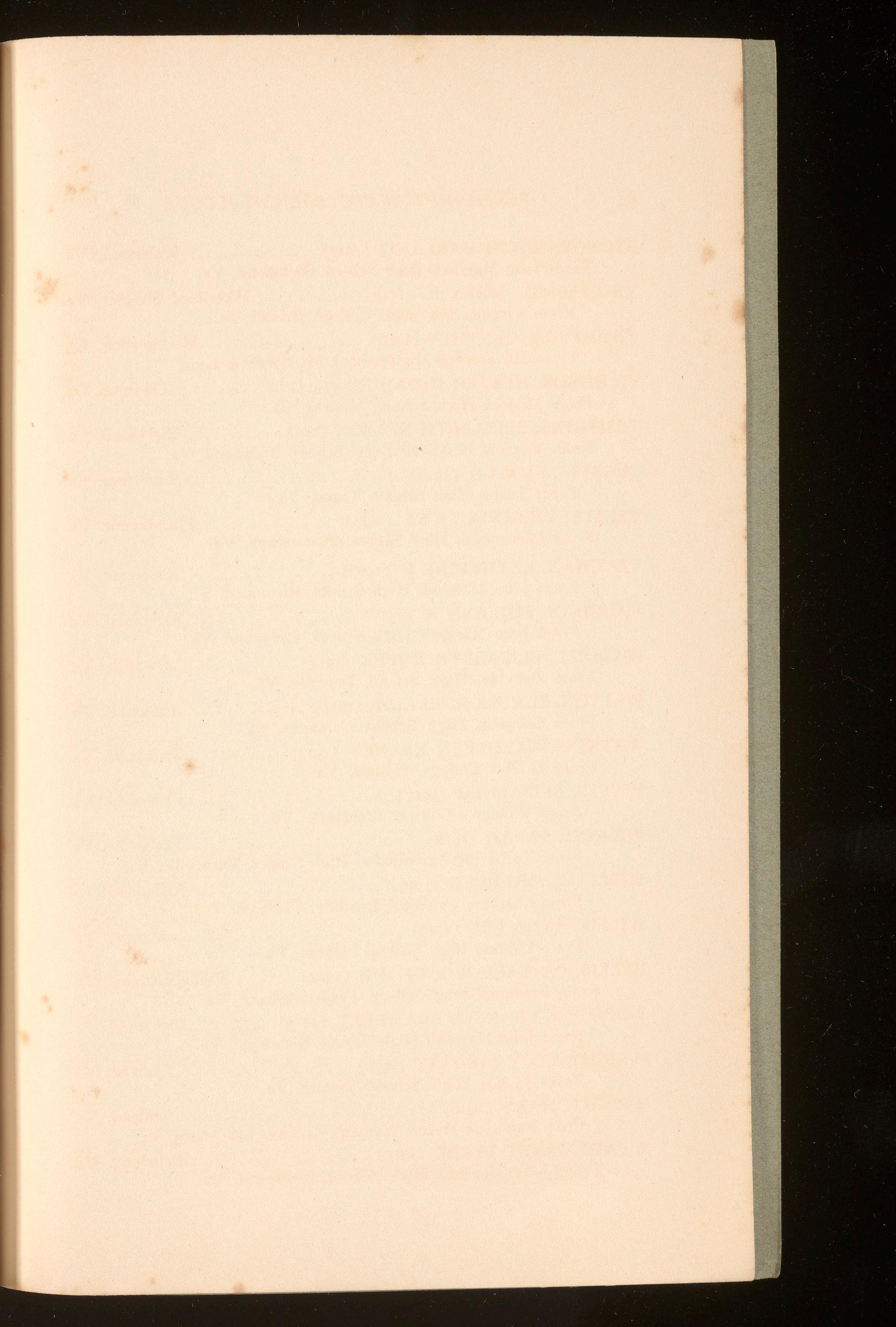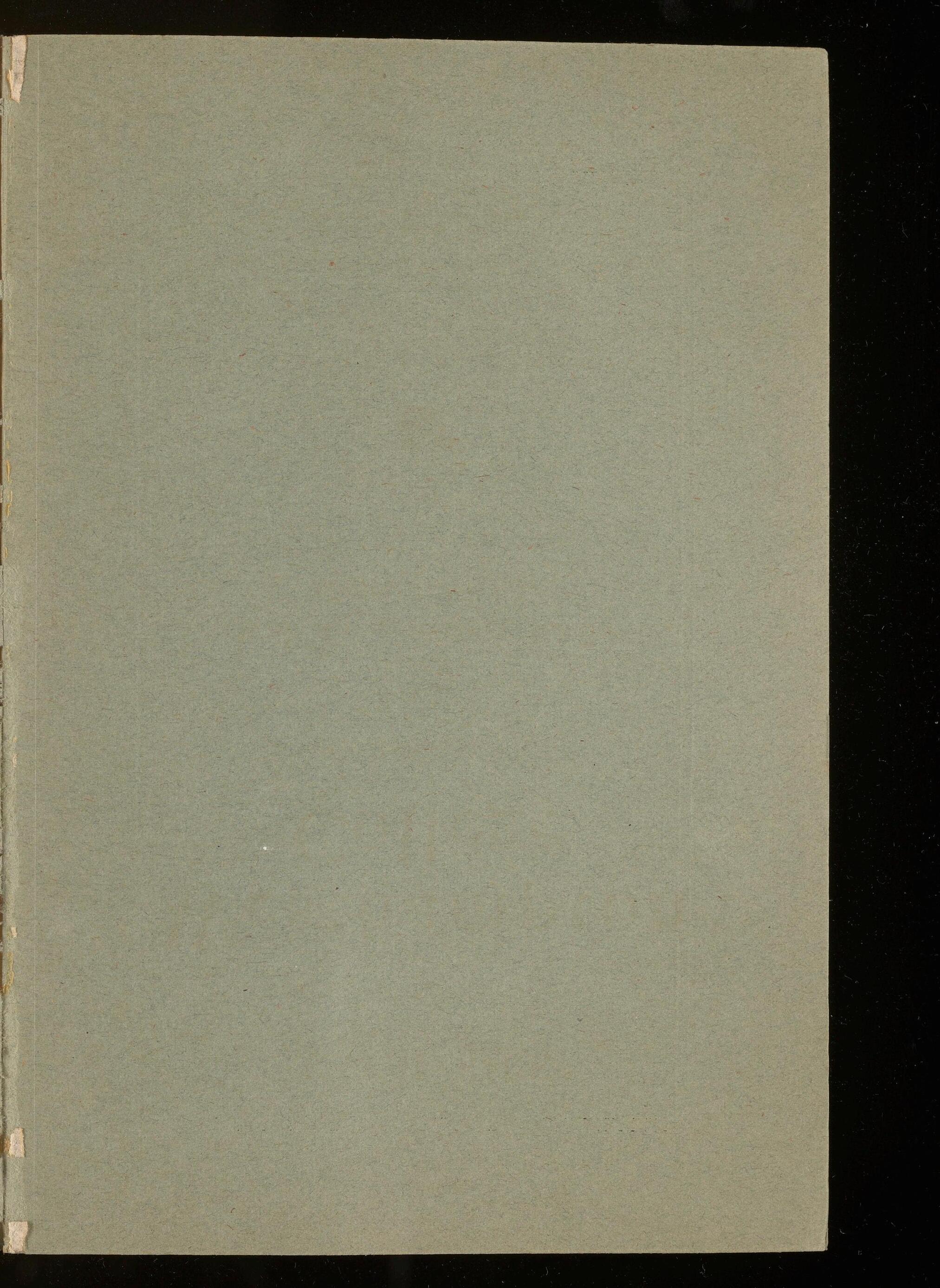

CATALOGUE of Westhampton College
RICHMOND, VA.
I
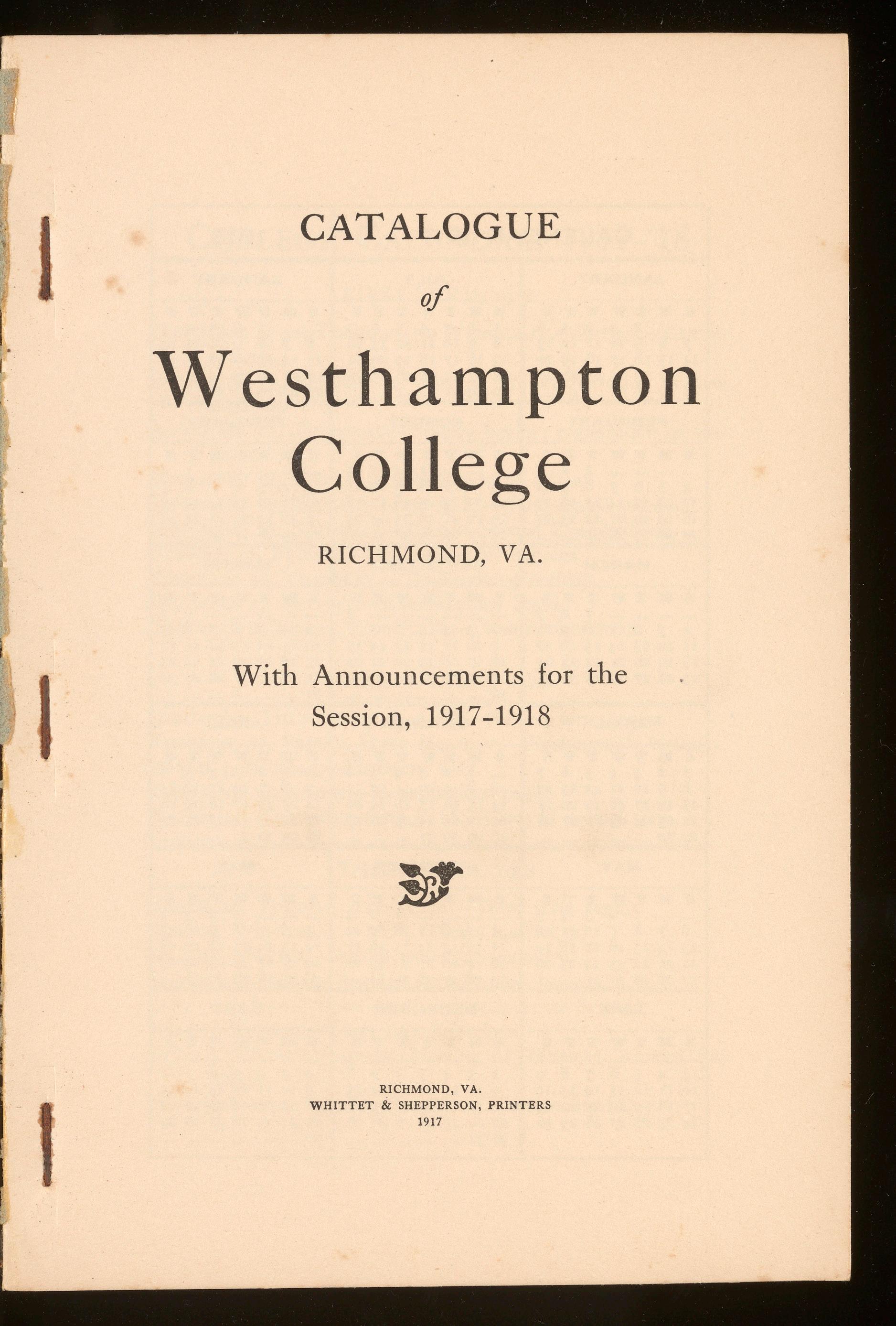
With Announcements for the Session, 1917-1918
"11:T
RICHMOND, VA.
WHITTET & SHEPPERSON, PRINTERS
1917
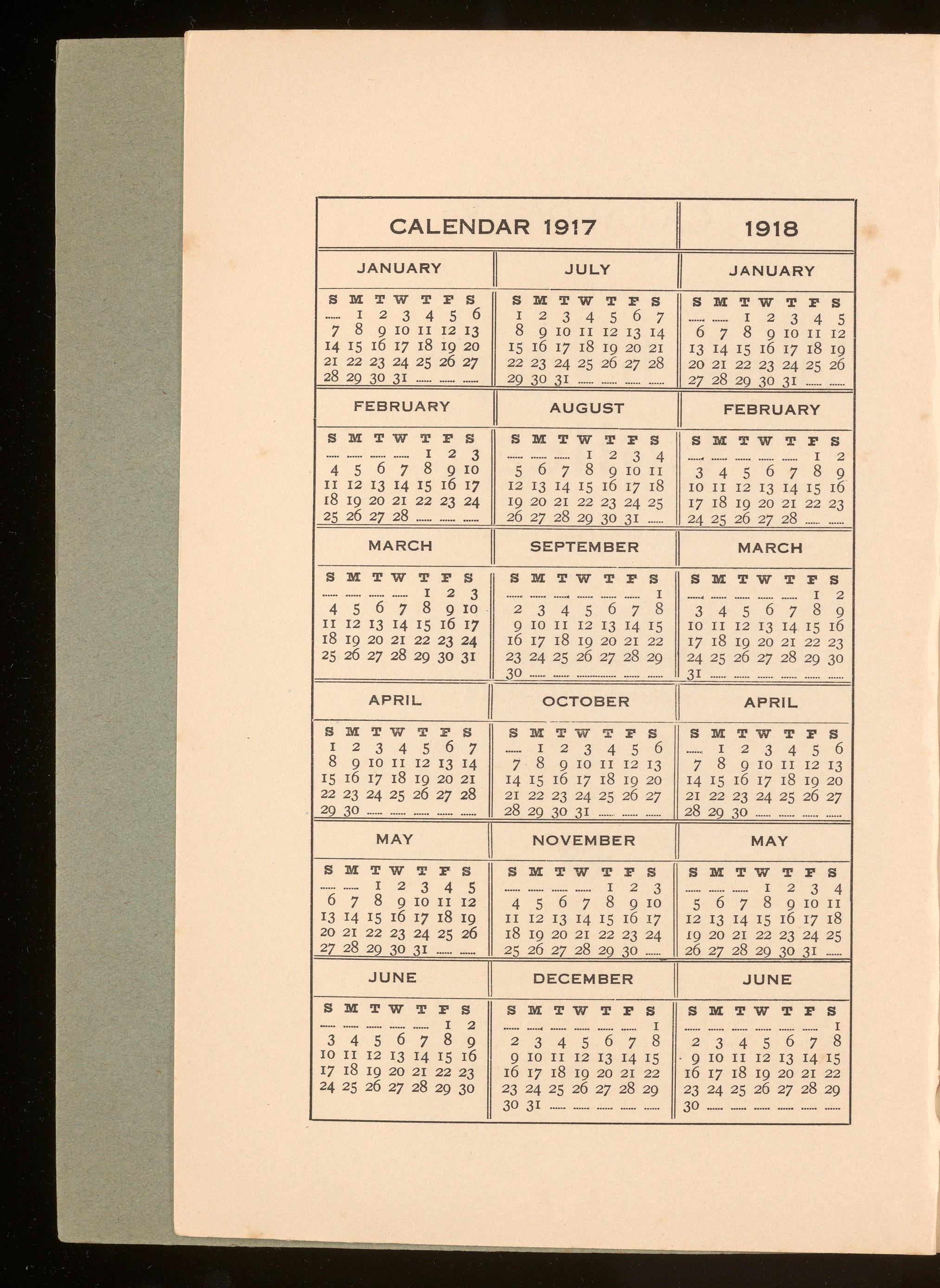
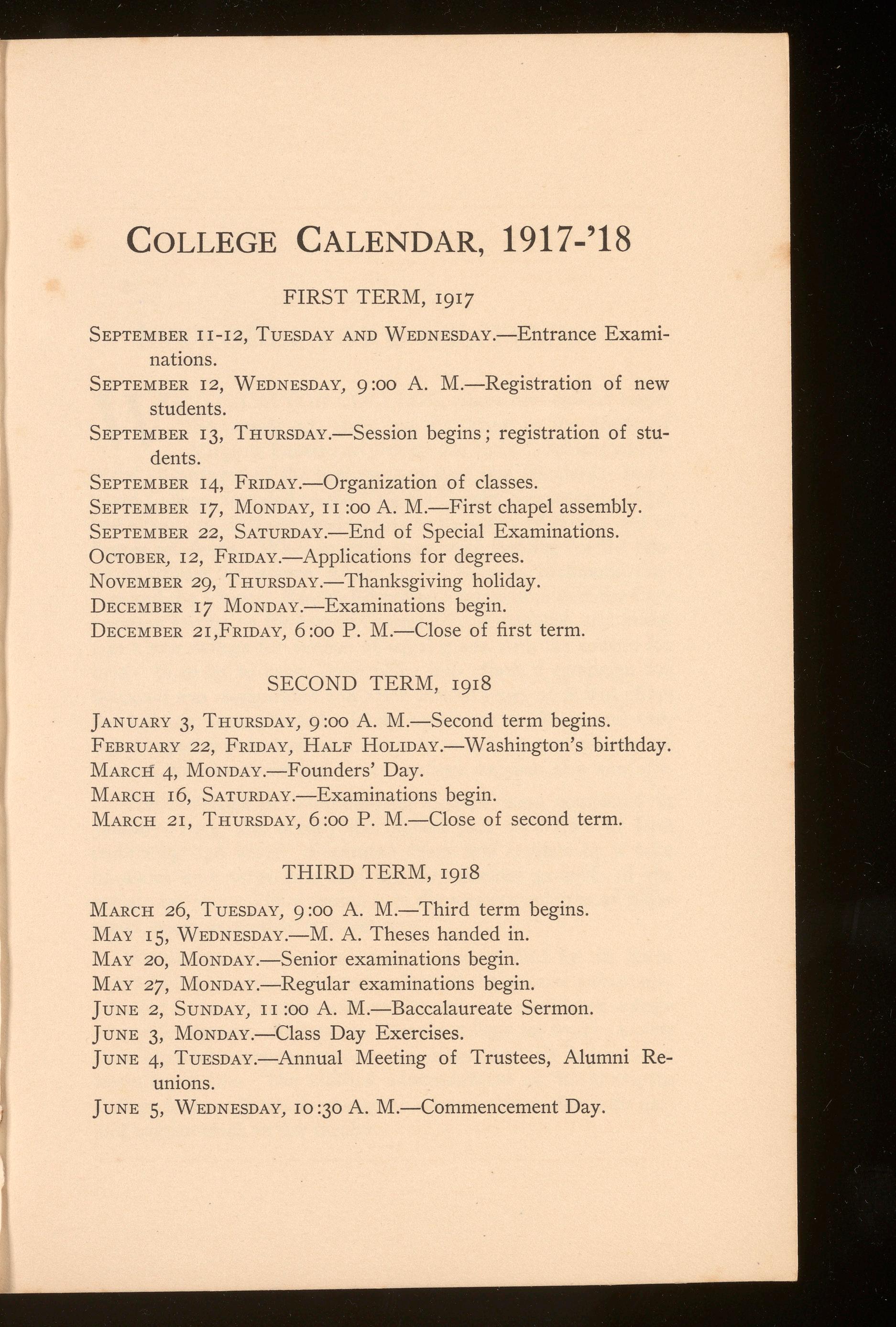
COLLEGE CALENDAR, 1917-'18
FIRST TERM, 1917
SEPTEMBERII-12, TUESDAYAND WEDNESDAY.-Entrance Examinations.
SEPTEMBER 12, WEDNESDAY,9 :oo A. M.-Registration of new students.
SEPTEMBER 13, THURSDAY.-Session begins; registration of students.
SEPTEMBER14, FRIDAY.-Organization of classes.
SEPTEMBER 17, MONDAY,11 :oo A. M.-First chapel assembly.
SEPTEMBER22, SATURDAY.-End of Special Examinations.
OcTOBER, 12, FRIDAY.-Applications for degrees.
NOVEMBER29, THURSDAY.-Thanksgiving holiday.
DECEMBER 17 MoNDAY.-Examinations begin .
DECEMBER21,FRIDAY, 6 :oo P. M -Close of first term.
SECOND TERM, 1918
JANUARY 3, THURSDAY,9 :oo A. M.-Second term begins.
FEBRUARY22, FRIDAY, HALF HoLIDAY.-Washington's birthday.
MARCH 4, MoNDAY.-Founders' Day.
MARCH 16, SATURDAY.-Examinations begin.
MARCH 21, THURSDAY,6 :oo P. M.-Close of second term.
THIRD TERM, 1918
MARCH 26, TUESDAY,9 :oo A. M.-Third term begins.
MAY 15, WEDNESDAY.-M A. Theses handed in.
MAY 20, MoNDAY-Senior examinations begin.
MAY 27, MoNDAY.-Regular examinations begin.
JuNE 2, SuNDAY, II :oo A. M.-Baccalaureate Sermon.
JuNE 3, MoNDAY.-Class Day Exercises.
JuNE 4, TuESDAY.-Annual Meeting of Trustees, Alumni Reumons.
JuNE 5, WEDNESDAY,10:30 A. M.-Commencement Day.
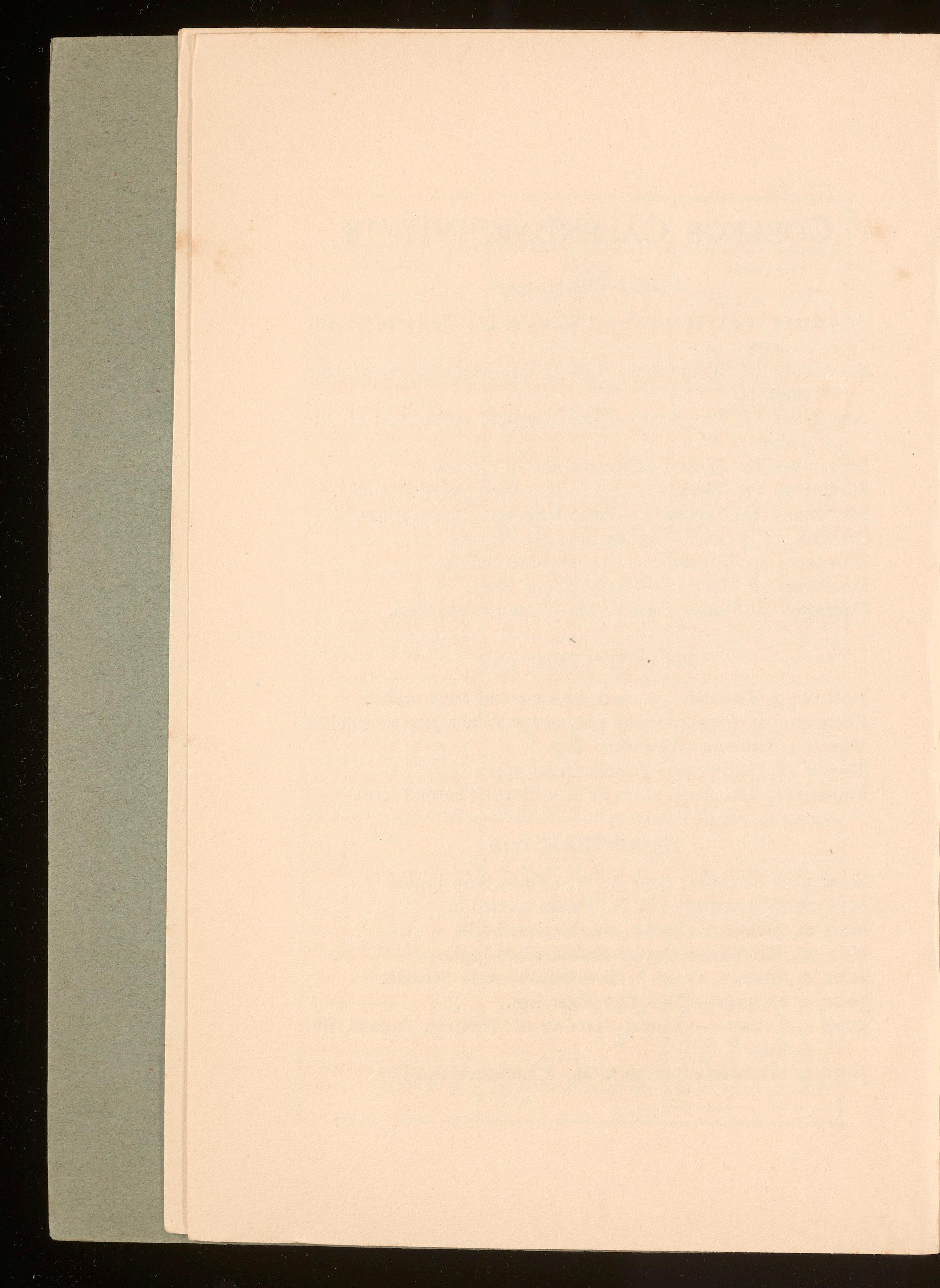
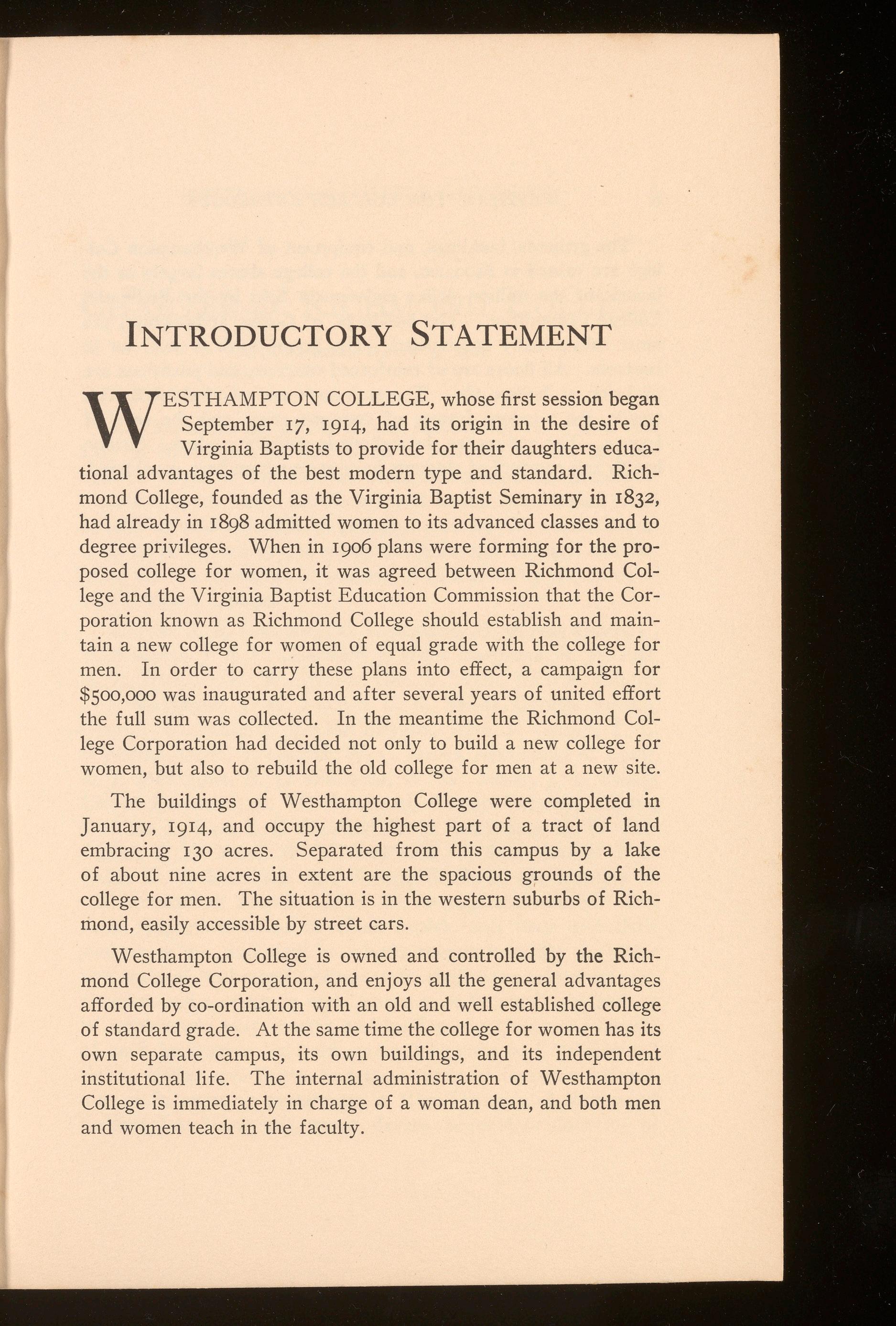
INTRODUCTORYSTATEMENT
WESTHAMPTON COLLEGE, whose first session began September 17, 1914, had its origin in the desire of Virginia Baptists to provide for their daughters educational advantages of the best modern type and standard. Richmond College, founded as the Virginia Baptist Seminary in 1832, had already in 1898 admitted women to its advanced classes and to degree privileges. When in 1906 plans were forming for the proposed college for women, it was agreed between Richmond College and the Virginia Baptist Education Commission that the Corporation known as Richmond College should establish and maintain a new college for women of equal grade with the college for men. In order to carry these plans into effect, a campaign for $500,000 was inaugurated and after several years of united effort the full sum was collected. In the meantime the Richmond College Corporation had decided not only to build a new college for women, but also to rebuild the old college for men at a new site.
The buildings of Westhampton College were completed in January, 1914, and occupy the highest part of a tract of land embracing 130 acres Separated from this campus by a lake of about nine acres in extent are the spacious grounds of the college for men. The situation is in the western suburbs of Richmond, easily accessible by street cars.
Westhampton College is owned and controlled by the Richmond College Corporation, and enjoys all the general advantages afforded by co-ordination with an old and well established college of standard grade. At the same time the college for women has its own separate campus, its own buildings, and its independent institutional life. The internal administration of Westhampton College is immediately in charge of a woman dean, and both men and women teach in the faculty.
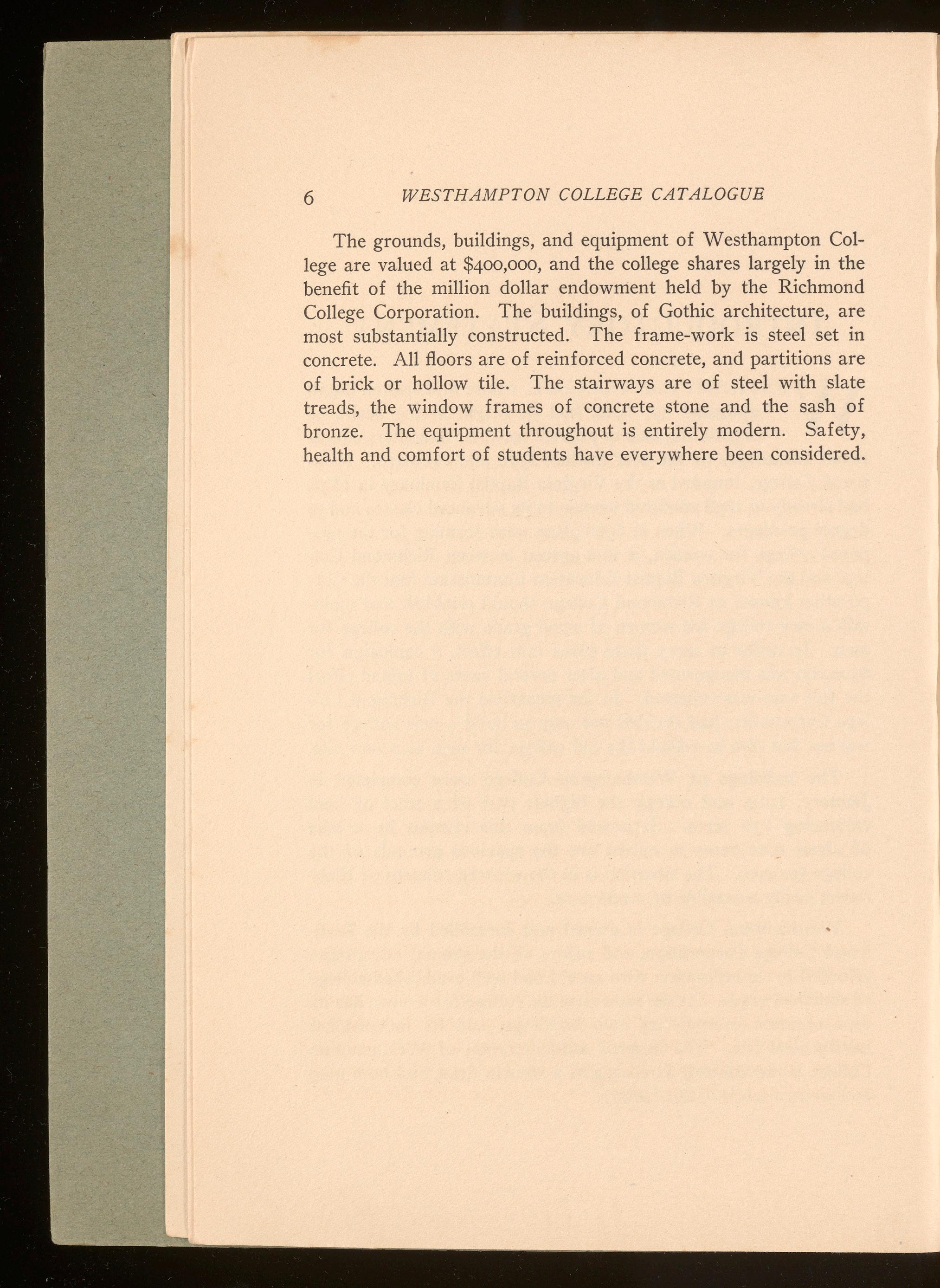
WESTHAMPTON COLLEGE CATALOGUE
The grounds, buildings, and equipment of Westhampton College are valued at $400,000, and the college shares largely in the benefit of the million dollar endowment held by the Richmond College Corporation. The buildings, of Gothic architecture, are most substantially constructed. The frame-work is steel set in concrete. All floors are of reinforced concrete, and partitions are of brick or hollow tile. The stairways are of steel with slate treads, the window frames of concrete stone and the sash of bronze. The equipment throughout is entirely modern. Safety, health and comfort of students have everywhere been considered.
CHARTER of RICHMOND COLLEGE
(As AMENDED MARCH 3, 1914)
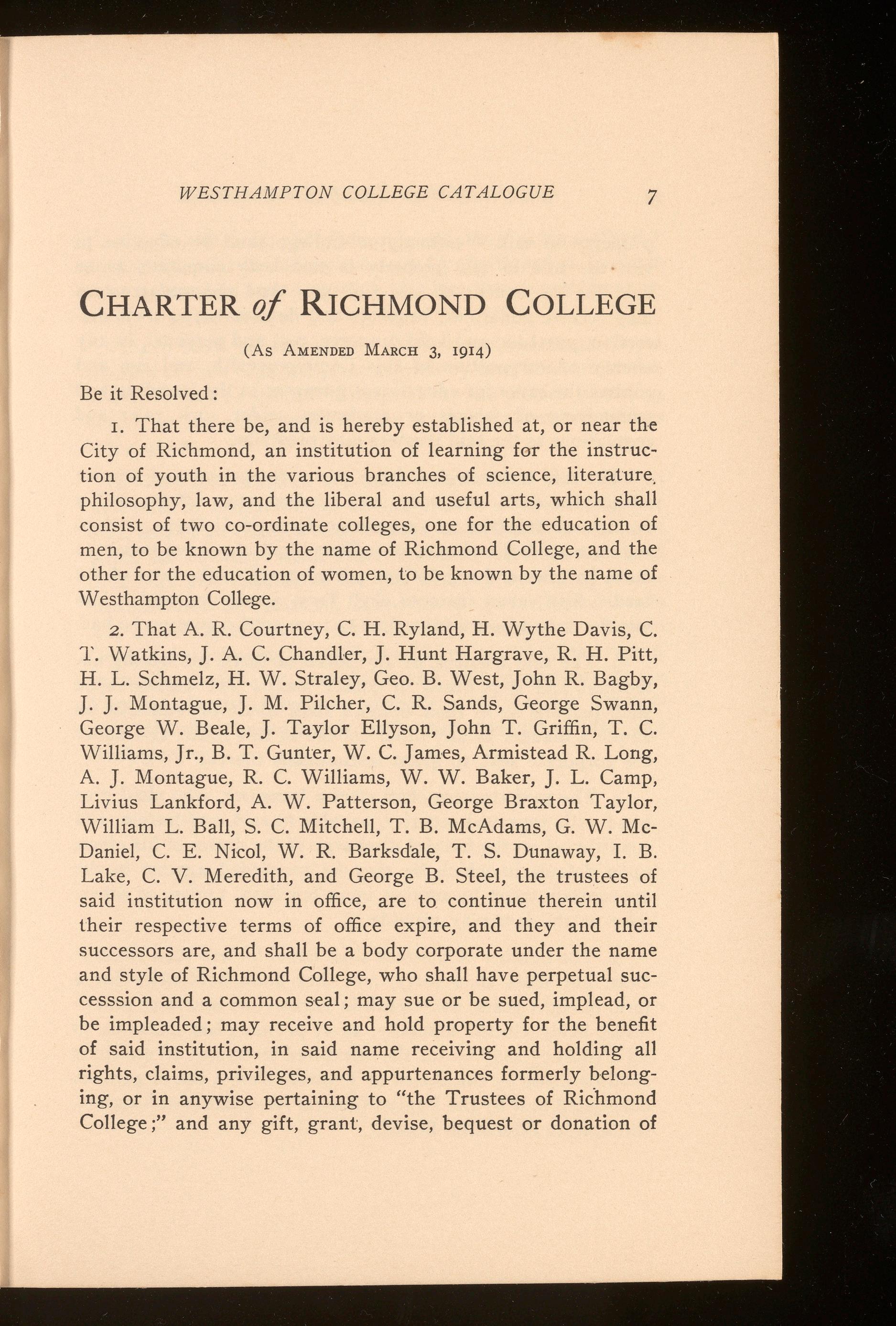
Be it Resolved:
I. That there be, and is hereby established at, or near the City of Richmond, an institution of learning for the instruction of youth in the various branches of science, literature . philosophy, law, and the liberal and useful arts, which shall consist of two co-ordinate colleges, one for the education of men, to be known by the name of Richmond College, and the other for the education of women, to be known by the name of Westhampton College.
2. That A. R. Courtney, C.H. Ryland, H. Wythe Davis, C. T. Watkins, J. A. C. Chandler, J. Hunt Hargrave, R. H. Pitt, H. L. Schmelz, H. W. Straley, Geo. B. West, John R. Bagby, J. J. Montague, J. M. Pilcher, C. R. Sands, George Swann, George W. Beale, J. Taylor Ellyson, John T. Griffin, T. C. Williams, Jr., B. T. Gunter, W. C. James, Armistead R. Long, A. J. Montague, R. C. Williams, W. W. Baker, J. L. Camp, Livius Lankford, A. W. Patterson, George Braxton Taylor, William L. Ball, S. C. Mitchell, T. B. McAdams, G. W. McDaniel, C. E. Nicol, W. R. Barksdale, T. S. Dunaway, I. B. Lake, C. V. Meredith, and George B. Steel, the trustees of said institution now in office, are to continue therein until their respective terms of office expire, and they and their successors are, and shall be a body corporate under the name and style of Richmond College, who shall have perpetual successsion and a common seal; may sue or be sued, implead, or be impleaded; may receive and hold property for the benefit of said institution, in said name receiving and holding all rights, claims, privileges, and appurtenances formerly belonging, or in anywise pertaining to "the Trustees of Rkhmond College;" and any gift, grant, devise, bequest or donation of
8
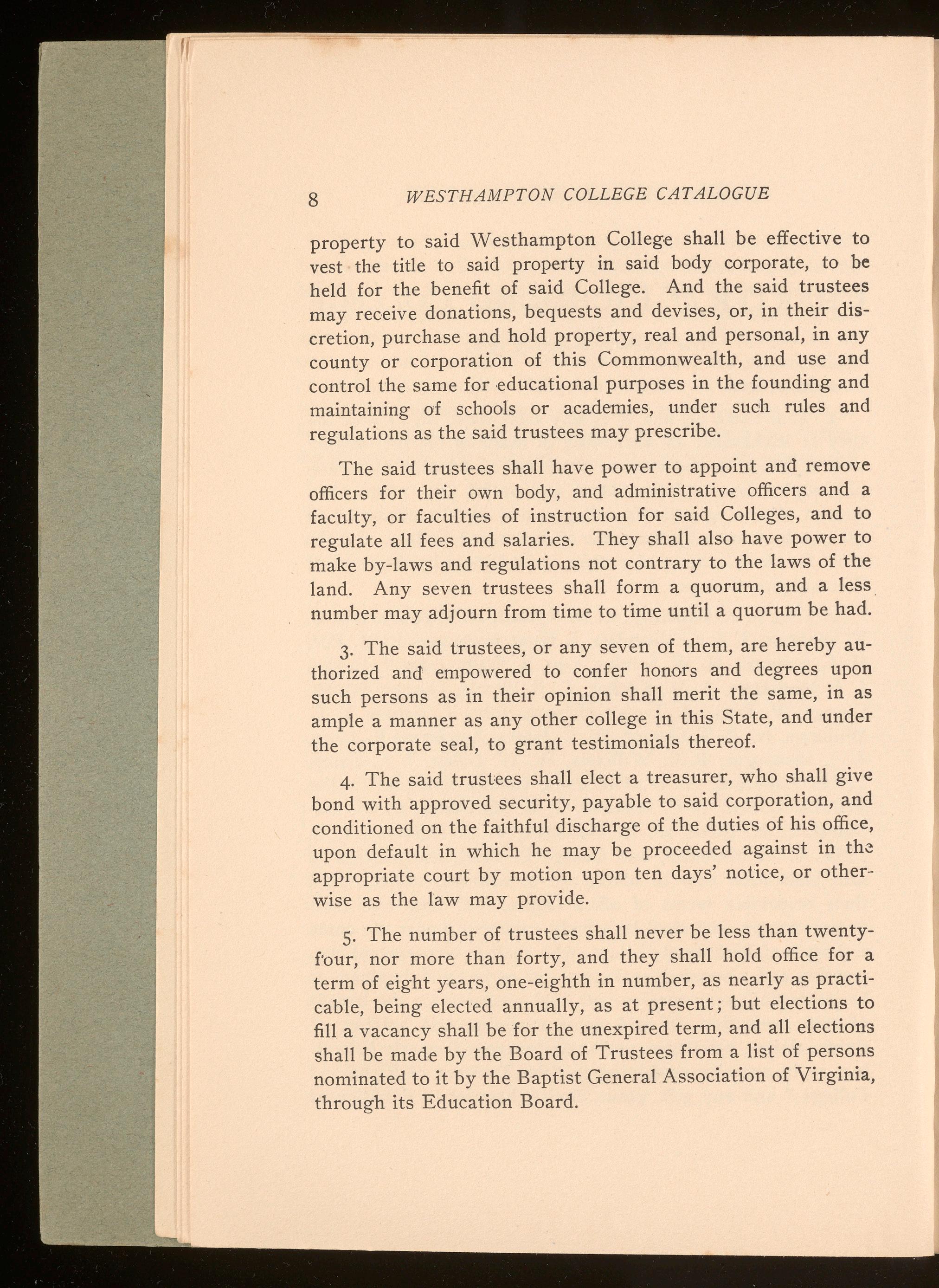
WESTHAMPTON COLLEGE CATALOGUE
property to said Westhampton College shall be effective to vest the title to said property in said body corporate, to be held for the benefit of said College. And the said trustees may rec-eive donations, bequests and devises, or, in their discretion, purchase and hold property, real and personal, in any county or corporation of this Commonwealth, and use and control the same for ,educational purposes in the founding and maintaining uf schools or academies, under such rules and regulations as the said trustees may prescribe.
The said trustees shall have power to appoint and remove officers for their own body, and administrative officers and a faculty, or faculties of instruction for said Colleges, and to regulate all fees and salaries. They shall also have power to make by-laws and regulations not contrary to the laws of the land Any seven trustees shall form a quorum, and a less number may adjourn from time to time until a quorum be had.
3. The said trustees, or any seven of them, are hereby authorized and' empowered to confer honors and degrees upon such persons as in their opinion shall merit the same, in as ample a manner as any other college in this State, and under the corporate seal, to grant testimonials thereof.
4. The said trustees shall elect a treasurer, who shall give bond with approved security, payable to said corporation, and conditioned on the faithful discharge of the duties of his office, upon default in which he may be proceeded against in th~ appropriate court by motion upon ten days' notke, or otherwise as the law may provide.
5. The number of trustees shall never be less than twentyfour, nor more than forty, and they shall hold office for a term of eight years, one-eighth in number, as nearly as practicable, being elected annually, as at present; but elections to fill a vacancy shall be for the unexpired term, and all elections shall be made by the Board of Trustees from a list of persons nominated to it by the Baptist General Association of Virginia, through its Education Board.
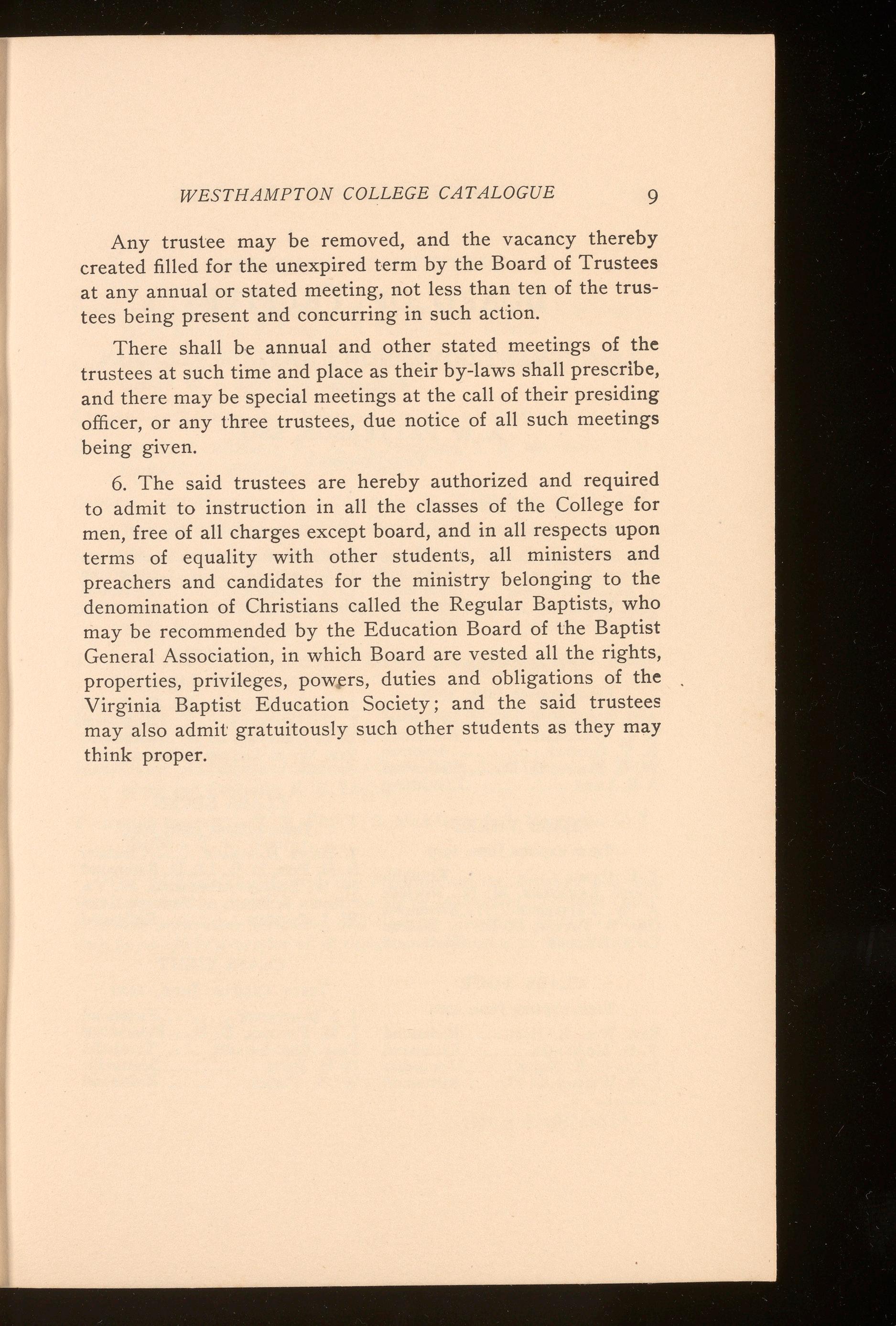
WESTHAMPTON COLLEGE CATALOGUE 9
Any trustee may be removed, and the vacancy thereby created filled for the unexpired term by the Board of Trustees at any annual or stated meeting, not less than ten of the trustees being present and concurring in such action.
There shall be annual and other stated meetings of the trustees at such time and place as their by-laws shall prescribe, and there may be special meetings at the call of their presiding officer, or any three trustees, due notice of all such meetings being given.
6. The said trustees are hereby authorized and required to admit to instruction in all the classes of the College for men, free of all charges except board, and in all respects upon terms of equality with other students, all ministers and preachers and candidates for the ministry belonging to the denomination of Christians called the Regular Baptists, who may be recommended by the Education Board of the Baptist General Association, in which Board are vested all the rights, properties, privileges, powers, duties and obligations of the Virginia Baptist Education Society; and the said trustees may also admit gratuitously such other students as they may think proper.
COLLEGE CATALOGUE
BOARD OF TRUSTEES
LIEUTENANT-GOVERNOR J. TAYLOR ELLYSON
PRESIDENT
A. W. PATTERSON, ESQ. VICE-PRESIDENT
CLASS ONE
Term expires June, 1917
GEO W. BEALE,D. D ........ Hague
JAMES D. CRUMP........ Richmond
J. TAYLORELLYSON ..... Richmond
]No. T. GRIFFIN ....... Portsmouth
T. C. WILLIAMS, JR...... Richmond
CLASS TWO
Term expires June, 1918
A. J. MONTAGUE,LL. D Richmond
R C. WILLIAMS......... Richmond
B. T. GUNTER............ Accomac
W. C. JAMES, D. D Richmond
A R. Lo NG ............. Lynchburg
CLASS THREE
Term expires June, 1919
J. L. CAMP Franklin
L1vrns LANKFORD,M. D Norfolk
A. W. PATTERSON....... Richmond
GEO. B. TAYLOR,D. D ...... Hollins
C. J. BILLUPS........... Richmond
CLASS FOUR
Term expires June, 1920
REV. WM. L. BALL...... Richmond
T. B. McADAMS......... Richmond
JUDGEC. E. NICOL...... Alexandria
L. T. WILSON, D. D ...... Richmond
* Died March 3, 1917.
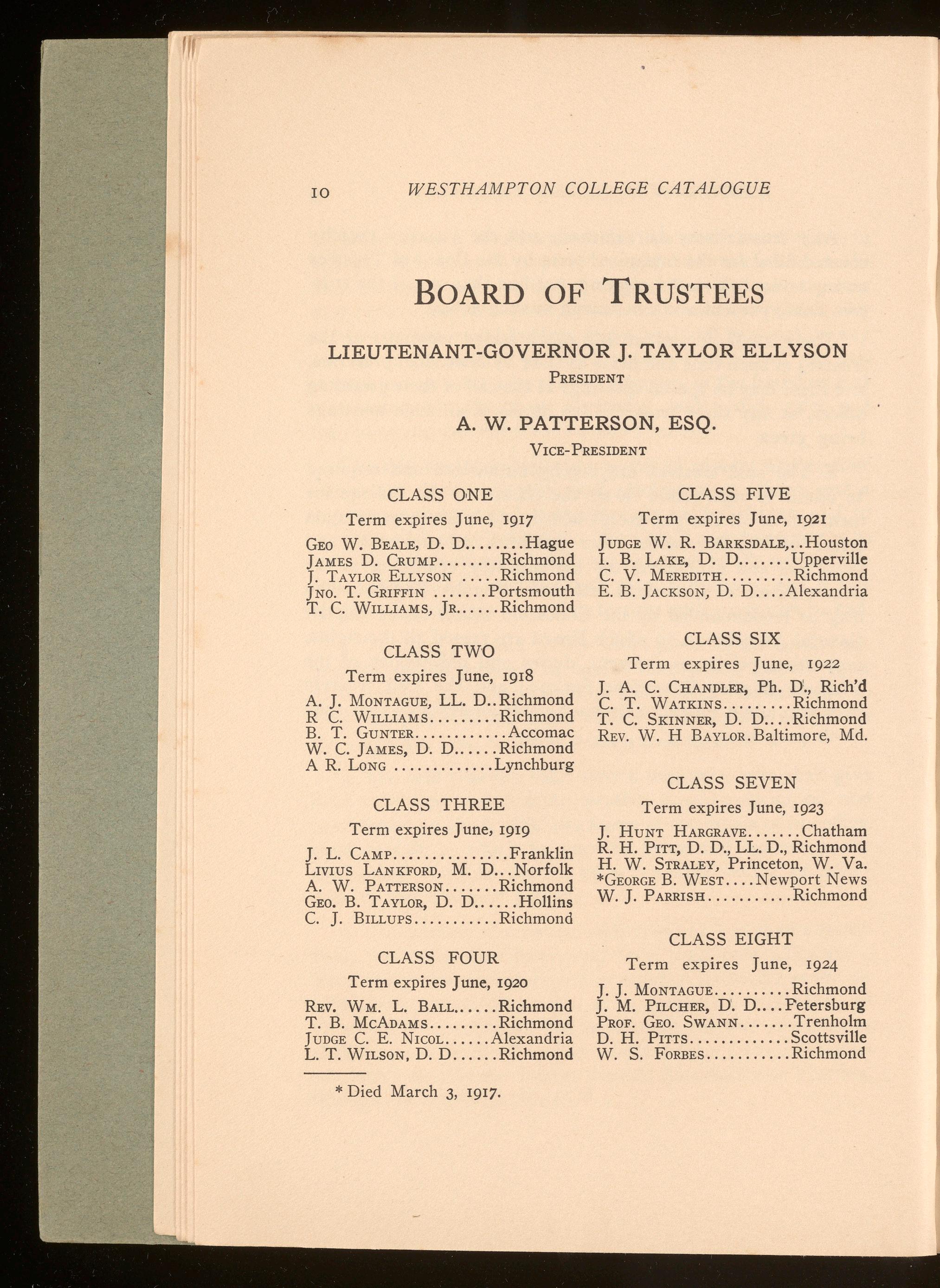
CLASS FIVE
Term expires June, 1921
JuDGE W. R. BARKSDALE,Houston
I. B. LAKE, D. D ....... Upperville
C. V. MEREDITH......... Richmond
E. B. JACKSON,D. D .... Alexandria
CLASS SIX
Term expires June, 1922
J. A. C. CHANDLER,Ph. D., Rich'd
C. T. WATKINS Richmond
T. C. SKINNER, D. D Richmond
REV. W. H BAYLOR.Baltimore, Md.
CLASS SEVEN
Term expires June, 1923
J. HuNT HARGRAVE....... Chatham
R. H. PITT, D. D., LL. D., Richmond
H. W. STRALEY,Princeton, W. Va. *GEORGEB. WEST.... Newport News
W. J. PARRISH Richmond
CLASS EIGHT
Term expires June, 1924
J. J. MONTAGUE.......... Richmond
J. M. PILCHER, D. D .... Petersburg
PROF. GEo. SWANN Trenholm
D. H. PITTS............. Scottsville
W. S. FORBES Richmond
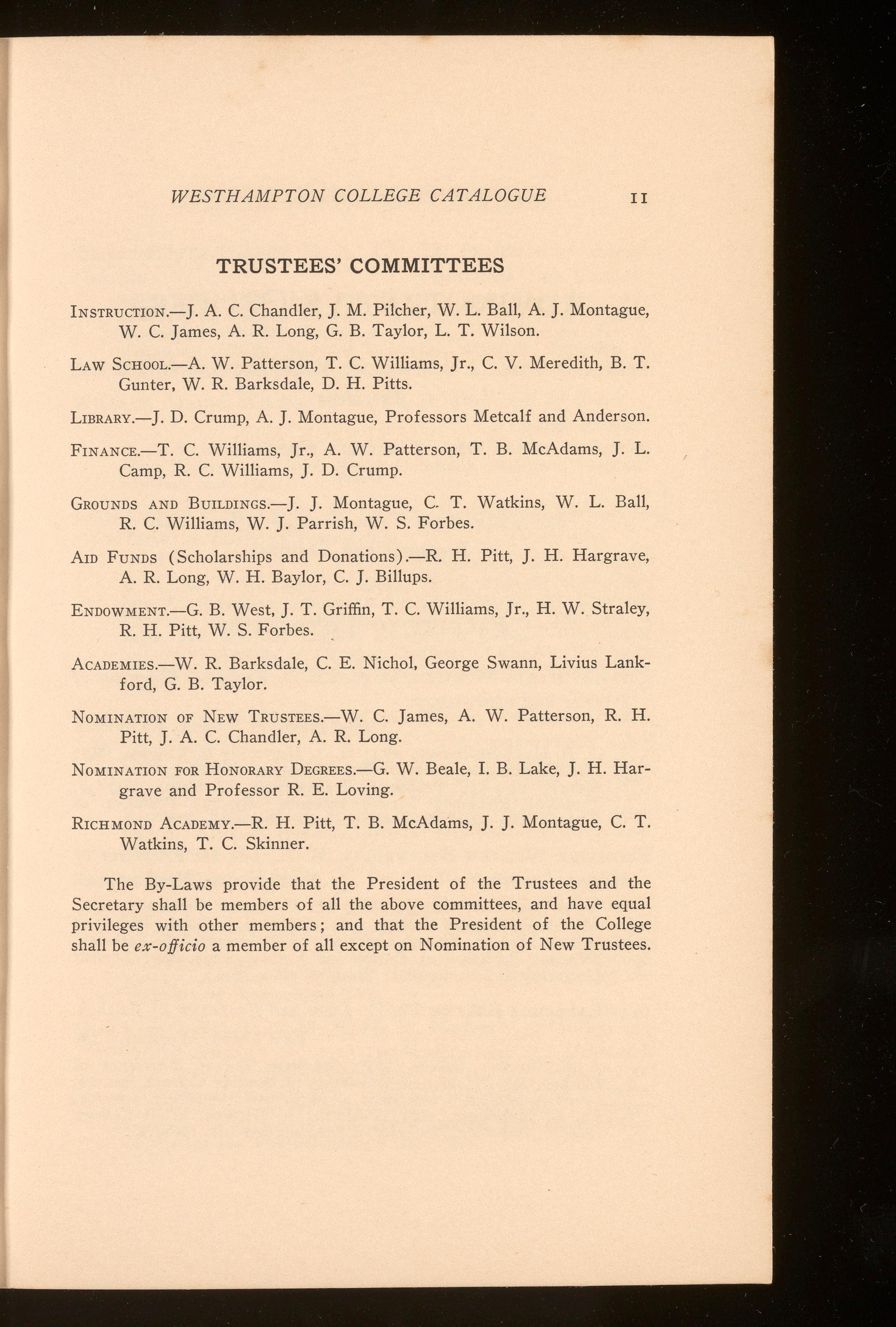
WESTHAMPTON COLLEGE CATALOGUE II
TRUSTEES' COMMITTEES
INSTRUCTION.-].A. C. Chandler, J.M. Pilcher, W. L. Ball, A. J. Montague, W. C. James, A. R. Long, G. B. Taylor, L. T. Wilson.
LAW ScHOOL.-A. W. Patterson, T. C. Williams, Jr., C. V. Meredith, B. T. Gunter, W. R. Barksdale, D. H. Pitts.
LrnRARY.-J. D. Crump, A. J. Montague, Professors Metcalf and Anderson.
FINANCE.-T. C. Williams, Jr., A. W. Patterson, T. B. McAdams, J. L. Camp, R. C. Williams, J D. Crump.
GROUNDSAND BuILDINGs.-J. J. Montague, C. T. Watkins, W. L. Ball, R. C. Williams, W. J. Parrish, W. S. Forbes.
Arn FUNDS ( Scholarships and Donations) .-R. H. Pitt, J. H. Hargrave, A. R. Long, W. H. Baylor, C. J. Billups.
ENDOWMENT.-G.B. West, J. T. Griffin, T. C. Williams, Jr., H. W. Straley, R. H. Pitt, W. S. Forbes.
AcADEMIES.-W. R. Barksdale, C. E. Nichol, George Swann, Livius Lankford, G. B. Taylor.
NOMINATIONOF NEW TRUSTEES.-W. C. James, A. W. Patterson, R. H. Pitt, J. A. C. Chandler, A. R. Long.
NOMINATIONFORHONORARYDEGREEs.-G. W. Beale, I. B. Lake, J. H Hargrave and Professor R. E. Loving.
RICHMONDAcADEMY.-R. H. Pitt, T. B. McAdams, J. J. Montague, C. T. Watkins, T. C. Skinner.
The By-Laws provide that the President of the Trustees and the Secretary shall be members of all the above committees, and have equal privileges with other members; and that the President of the College shall be ex-officio a member of all except on Nomination of New Trustees.
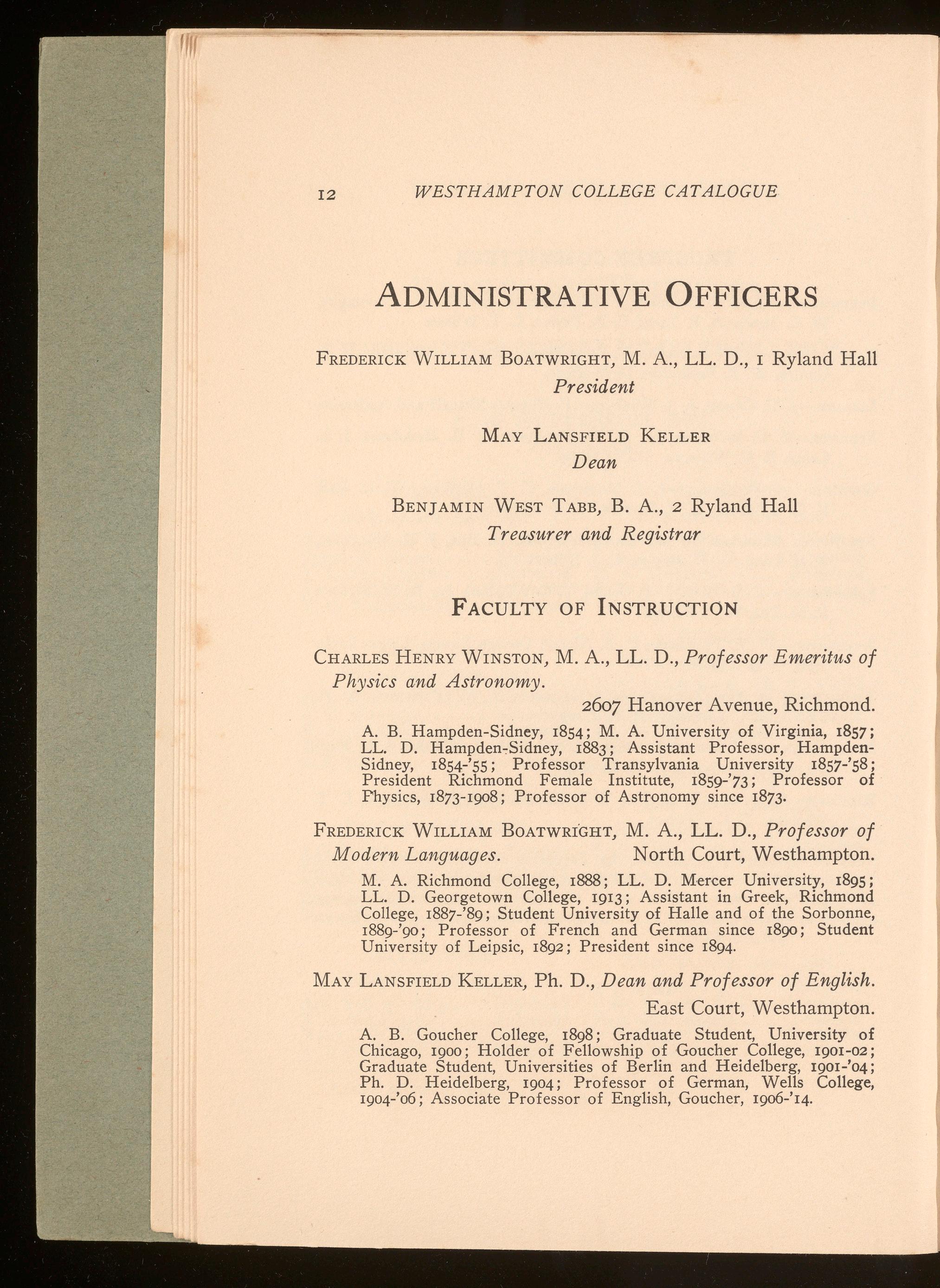
WESTHAMPTON COLLEGE CATALOGUE
ADMINISTRATIVE OFFICERS
FREDERICKWILLIAM BOATWRIGHT,M. A., LL. D., I Ryland Hall
President
MAy LANSFIELD KELLER
Dean
BENJAMIN WEST TABB, B. A., 2 Ryland Hall
Treasurer and Registrar
FACULTY OF INSTRUCTION
CHARLESHENRY WINSTON, M.A., LL. D., Professor Emeritus of Physics and Astronomy.
26o7 Hanover Avenue, Richmond.
A. B. Hampden-Sidney, 1854; M. A. University of Virginia, 1857; LL. D. HampdenaSidney, 1883; Assistant Professor, HampdenSidney, 1854-'55; Professor Transylvania University 1857-'58; President Richmond Female Institute, 1859-'73; Professor of Physics, 1873-1908; Professor of Astronomy since 1873.
FREDERICKWILLIAM BoATWRr'GHT,M. A., LL. D., Professor of Modern Languages. North Court, Westhampton.
M. A. Richmond College, 1888; LL. D. Mercer University, 1895; LL. D. Georgetown College, 1913; Assistant in Greek, Richmond College, 1887-'89; Student University of Halle and of the Sorbonne, 1889-'90; Professor of French and German since 1890; Student University of Leipsic, 1892; President since 1894.
MAY LANSFIELDKELLER, Ph.D., Dean and Professor of English. East Court, Westhampton.
A. B. Goucher College, 18g8; Graduate Student, University of Chicago, 1900; Holder of Fellowship of Goucher College, 1901-02; Graduate Student, Universities of Berlin and Heidelberg, 1901-'04; Ph. D. Heidelberg, 1904; Professor of German, Wells College, 1904-'06; Associate Professor of English, Goucher, 19o6-'14.
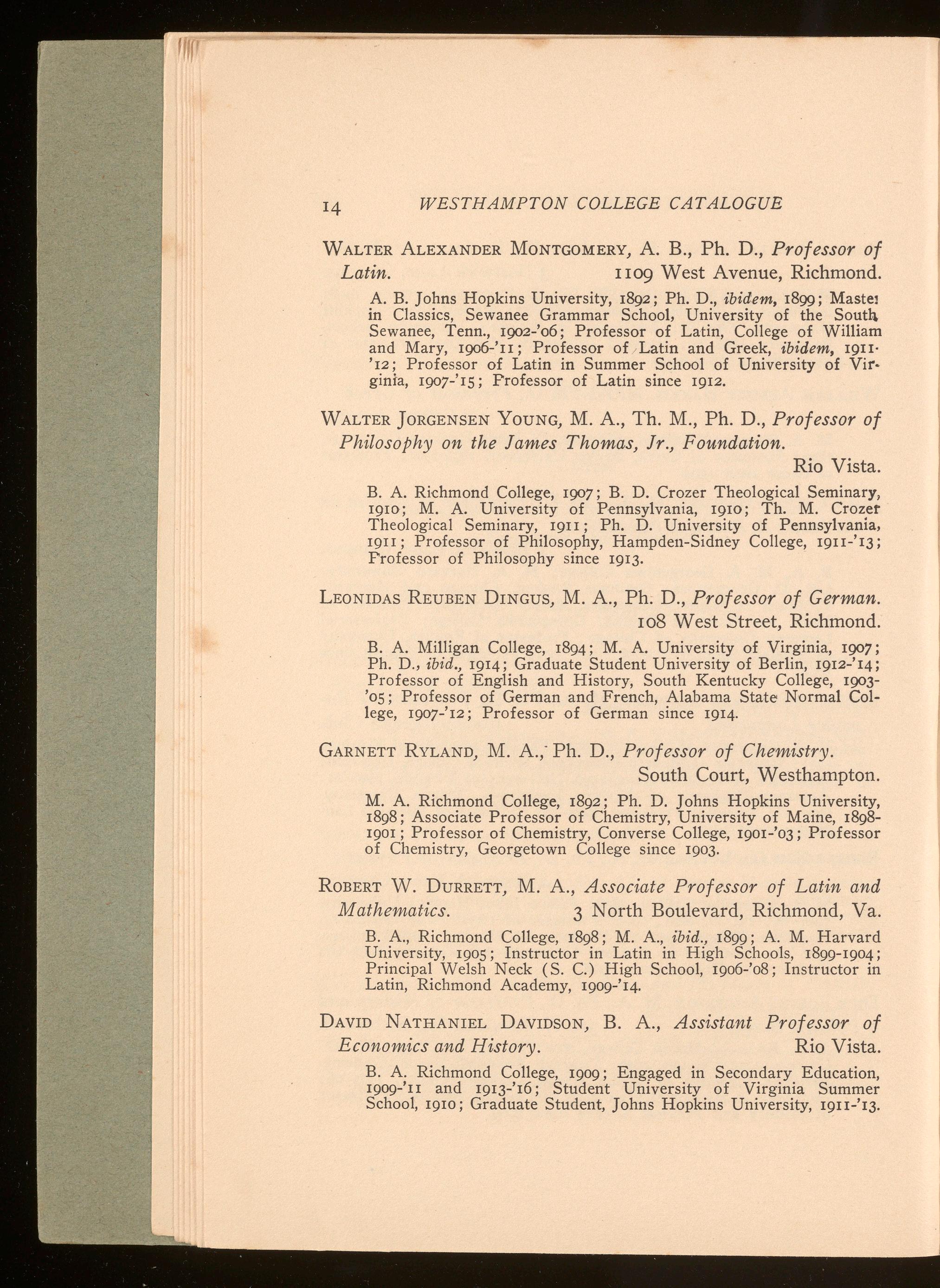
WESTHAMPTON COLLEGE CATALOGUE
WALTER ALEXANDER MONTGOMERY, A. B., Ph. D., Professor of Latin. 1109 West Avenue, Richmond.
A. B. J ohos Hopkins University, 1892; Ph. D., ibidem, 1899; Mastel in Classics, Sewanee Grammar School, University of the Soutb. Sewanee, Tenn., 1902-'06; Professor of Latin, College of William and Mary, 1906-'11; Professor of / Latin and Greek, ibidem, 1911• '12; Profe ssor of Latin in Summer School of University of Vir• ginfa, 1907-'15; Professor of Latin since 1912.
WALTER JORGENSEN YouNG, M.A., Th. M., Ph.D., Professor of Philosophy on the James Thomas, Jr , Foundation Rio Vista.
B A Richmond College, 1907; B D. Crozer Theological Seminary, 1910; M. A. University of Pennsylvania, 1910; Th. M . Crozer Theological Seminary, 1911; Ph. D. University of Pennsylvania, 1911 ; Professor of Philosophy, Hampden-Sidney College , 1911-'13; Professor of Philosophy since 1913.
LEONIDAS REUBEN DINGUS, M A , Ph ; D , Professor of German 108 West Street, Richmond.
B A. Milligan College , 1894; M. A. University of Virginia, 1907; Ph. D , ibid , 1914; Graduate Student Univ -ersity of Berlin, 1912-'14; Profe ssor of English and History, South Kentucky College, 1903' 05 ; Professor of German and French, Alabama State Normal College, 1907-'12 ; Professor of German since 1914.
GARNETT RYLAND, M A.; Ph. D , Professor of Chemistry South Court, Westhampton.
M . A. Richmond College, 1892; Ph. D. Johns Hopkins University, 1898 ; Associate Professor of Chemistry, University of Maine, 18981901 ; Professor of Chemistry, Converse College, 1901-' 03; Professor of Ch emi stry, Georgetown Coll ege since 1903.
ROBERT W . DURRETT, M . A ., Associate Professor of Latin and Mathematics. 3 North Boulevard, Richmond, Va
B. A., Richmond College, 1898; M. A , ibid., 1899; A. M Harvard University , 1905; Instructor in Latin in High School s, 1899-1904; Principal Wel sh Neck (S. C.) High School, 1906-'08; Instructor in Latin, Richmond Academy, 1909-' 14.
DAVID NATHANIEL DAVIDSON, B. A., Assistant Professor of Economics and History. Rio Vista.
B. A Richmond College, 1909 ; Eng;i.ged in Secondary Education, 1909-'11 and 1913-'16; Student University of Virginia Summer School , 1910; Graduate Student, Johns Hopkins University, 1911-'13.
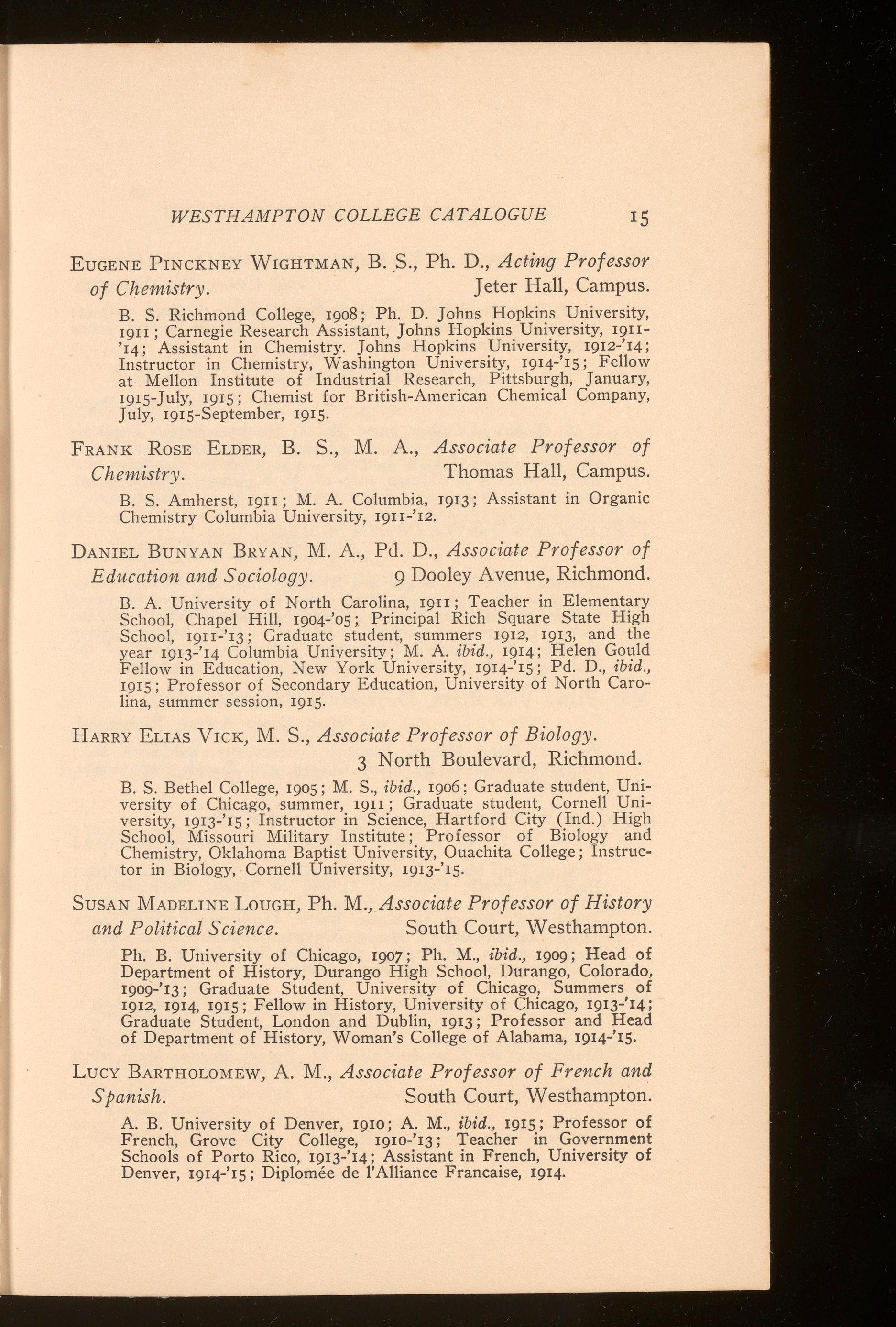
WESTHAMPTON
COLLEGE CATALOGUE
EUGENE PINCKNEY WIGHTMAN, B. S., Ph. D., Acting Professor of Chemistry. Jeter Hall, Campus.
B. S. Richmond College, 1908; Ph. D. Johns Hopkins University, 19II; Carnegie Research Assistant, Johns Hopkins University, 19II'14; Assistant in Chemistry. Johns Hopkins University, 1912-'14; Instructor in Chemistry, Washington University, 1914-'15; Fellow at Mellon Institute of Industrial Research, Pittsburgh, January, 1915-July, 1915; Chemist for British-American Chemical Company, July, 1915-September, 1915.
FRANK RosE ELDER, B. S., M. A., Associate Professor of Chemistry. Thomas Hall, Campus.
B. S. Amherst, 19II ; M. A. Columbia, 1913; Assistant in Organic Chemistry Columbia University, 19u-'12.
DANIEL BuNYAN BRYAN, M. A., Pd. D., Associate Professor of Education and Sociology. 9 Dooley Avenue, Richmond
B. A. University of North Carolina, 19II; Teacher in Elementary School, Chapel Hill, 1904-'05; Principal Rich Square State High School, 19u-'13 ; Graduate student, summers 1912, 1913, and the year 1913-'14 Columbia University; M. A. ibid., 1914; Helen Gould Fellow in Education, New York University, 1914-'15; Pd. D., ibid., 1915; Professor of Secondary Education, University of North Carolina, summer session, 1915.
HARRY ELIAS VICK, M. S., Associate Professor of Biology. 3 North Boulevard, Richmond.
B. S Bethel College, 1905; M. S., ibid., 1906; Graduate student, University of Chicago, summer, 19II; Graduate student, Cornell University, 1913-'15; Instructor in Science, Hartford City (Ind ) High School, Missouri Military Institute; Professor of Biology and Chemistry, Oklahoma Baptist University, Ouachita College; Instructor in Biology, Cornell University, 1913-'15.
SusAN MADELINELouGH , Ph. M., Associate Professor of History and Political Science. South Court, Westhampton.
Ph. B. University of Chicago, 1907; Ph. M., ibid., 1909; Head of Department of History, Durango High School, Durango, Colorado, 1909-'13; Graduate Student, University of Chicago, Summers of 1912, 1914, 1915; Fellow in History, University of Chicago, 1913-'14; Graduate Student, London and Dublin, 1913; Professor and Head of Department of History, Woman's College of Alabama, 1914-'15.
Lucy BARTHOLOMEW,A. M., Associate Professor of French and Spanish. South Court, Westhampton.
A. B. University of Denver, 1910; A. M., ibid., 1915; Professor of French, Grove City College, 1910-'13; Teacher in Government Schools of Porto Rico, 1913-'14; Assistant in French, University of Denver, 1914-'15; Diplomee de !'Alliance Francaise, 1914.
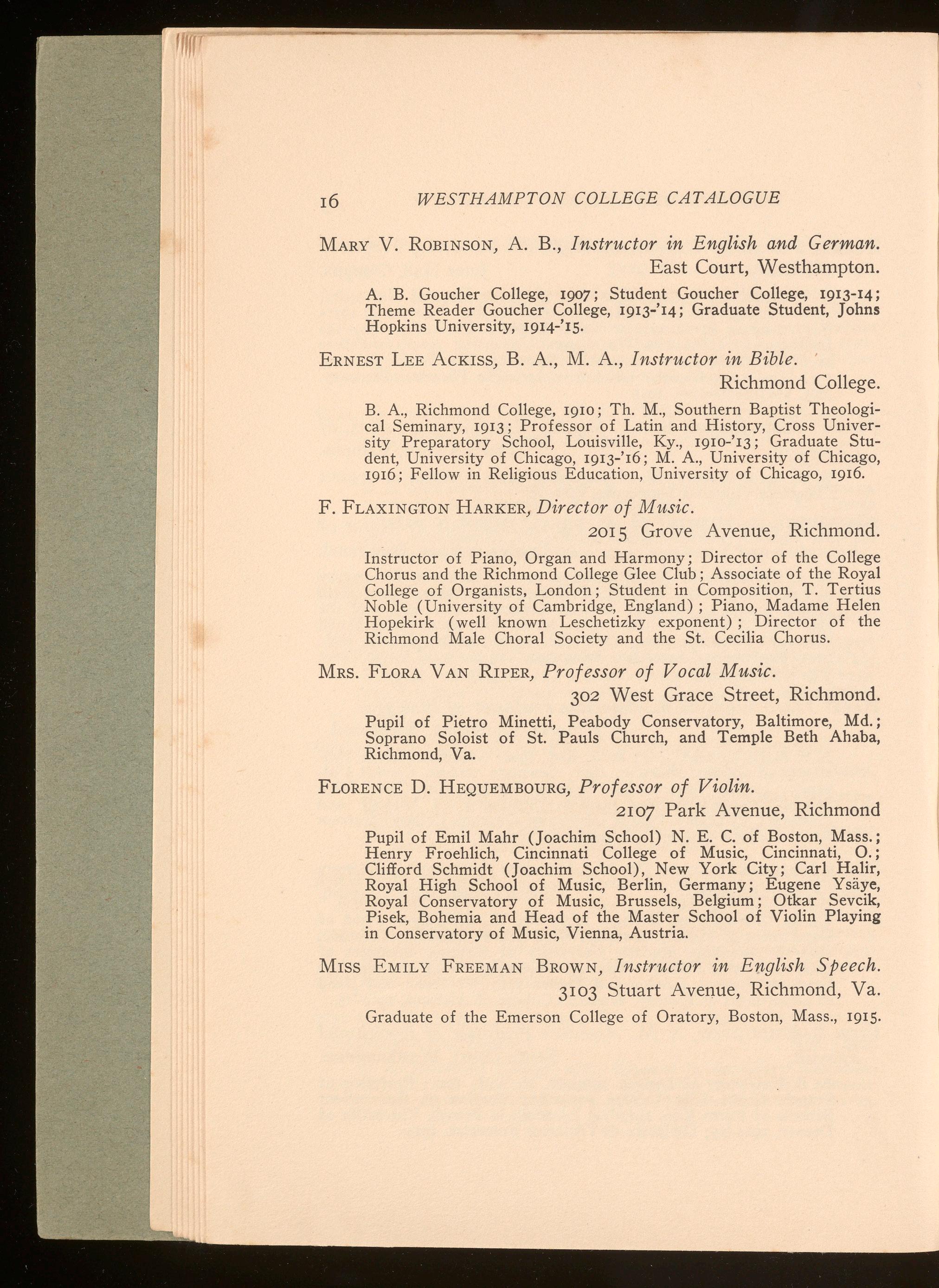
WESTHAMPTON COLLEGE CATALOGUE
MARY V. ROBINSON, A. B., Instructor in English and German. East Court, Westhampton.
A. B. Goucher College, 1907; Student Goucher College, 1913-14; Theme Reader Goucher College, 1913-'14; Graduate Student, Johns Hopkins University, 1914-'15.
ERNEST LEE ACKISS, B. A., M. A., Instructor in Bible. · Richmond College.
B. A., Richmond College, 1910; Th. M., Southern Baptist Theological Seminary, 1913; Professor of Latin and History, Cross University Preparatory School, Louisville, Ky., 1910-'13; Graduate Student, University of Chicago, 1913-'16; M. A., University of Chicago, 1916; Fellow in Religious Education, University of Chicago, 1916.
F. FLAXINGTON HARKER, Director of Music.
2015 Grove A venue, Richmond.
Instructor of Piano, Organ and Harmony; Director of the College Chorus and the Richmond College Glee Club; Associate of the Royal College of Organists, London; Student in Composition, T. Tertius Noble (University of Cambridge, England); Piano, Madame Helen Hopekirk ( well known Leschetizky exponent) ; Director of the Richmond Male Choral Society and the St. Cecilia Chorus,
MRS. FLORA VAN RIPER, Professor of Vocal Music.
302 West Grace Street, Richmond.
Pupil of Pietro Minetti, Peabody Conservatory, Baltimore, Md.; Soprano Soloist of St. Pauls Church, and Temple Beth Ababa, Richmond, Va.
FLORENCE D. HEQUEMBOURG, Professor of Violin.
2107 Park A venue, Richmond
Pupil of Emil Mahr (Joachim School) N. E. C. of Boston, Mass.; Henry Froehlich, Cincinnati College of Music, Cincinnati, 0.; Clifford Schmidt (Joachim School), New York City; Carl Halir, Royal High School of Music, Berlin, Germany; Eugene Y saye, Royal Conservatory of Music, Brussels, Belgium; Otkar Sevcik, Pisek, Bohemia and Head of the Master School of Violin Playing in Conservatory of Music, Vienna, Austria.
Miss EMILY FREEMAN BROWN, Instructor in English Speech. 3103 Stuart Avenue, Richmond, Va.
Graduate of the Emerson College of Oratory, Boston, Mass., 1915.
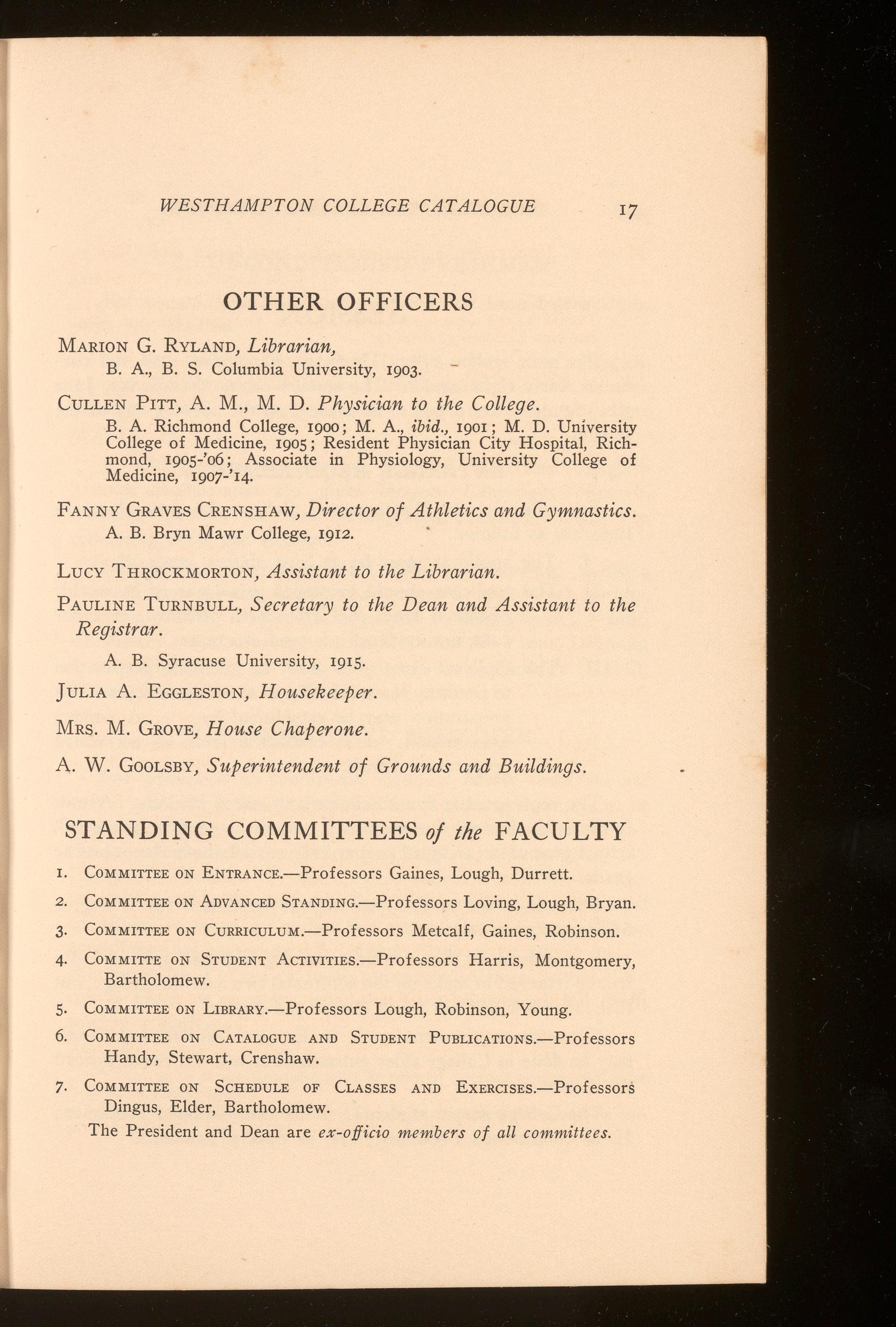
WESTHAMPTON COLLEGE CATALOGUE
OTHER OFFICERS
MARION G. RYLAND, Librarian, B. A., B. S. Columbia University, 1903.
CuLLEN PITT, A. M., M. D. Physician to the College.
B. A. Richmond College, 1900; M. A., ibid., 1901 ; M. D. University College of Medicine, 1905; Resident Physician City Hospital, Richmond, 1905-'06; Associate in Physiology, University College of Medicine, 1907-'14.
FANNY GRAVES CRENSHAW, Director of Athletics and Gymnastics.
A. B. Bryn Mawr College, 1912.
Lucy THROCKMORTON, Assistant to the Librarian.
PAULINE TURNBULL, Secretary to the Dean and Assistant to the Registrar.
A. B. Syracuse University, 1915.
JuLIA A. EGGLESTON, Housekeeper.
MRS. M. GROVE, House Chaperone.
A. W. GOOLSBY, Superintendent of Grounds and Buildings.
STANDING COMMITTEES of the FACULTY
I. COMMITTEEON ENTRANCE.-Professors Gaines, Lough, Durrett.
2. COMMITTEEON ADVANCEDSTANDING.-Professors Loving, Lough , Bryan.
3. COMMITTEEON CuRRICULUM.-Professors Metcalf, Gaines, Robinson.
4. CoMMITTE ON STUDENTAcnVITIEs.-Professors Harris, Montgomery, Bartholomew.
5. COMMITTEEON LIBRARY.-Professors Lough, Robinson, Young .
6 COMMITTEEON CATALOGUEAND STUDENT PuBLICATIONS.-Professors Handy, Stewart, Crenshaw.
7. COMMITTEEON SCHEDULE OF CLASSES AND ExERCISES.-Professors Dingus, Elder, Bartholomew.
The President and Dean are ex-officio members of all committees
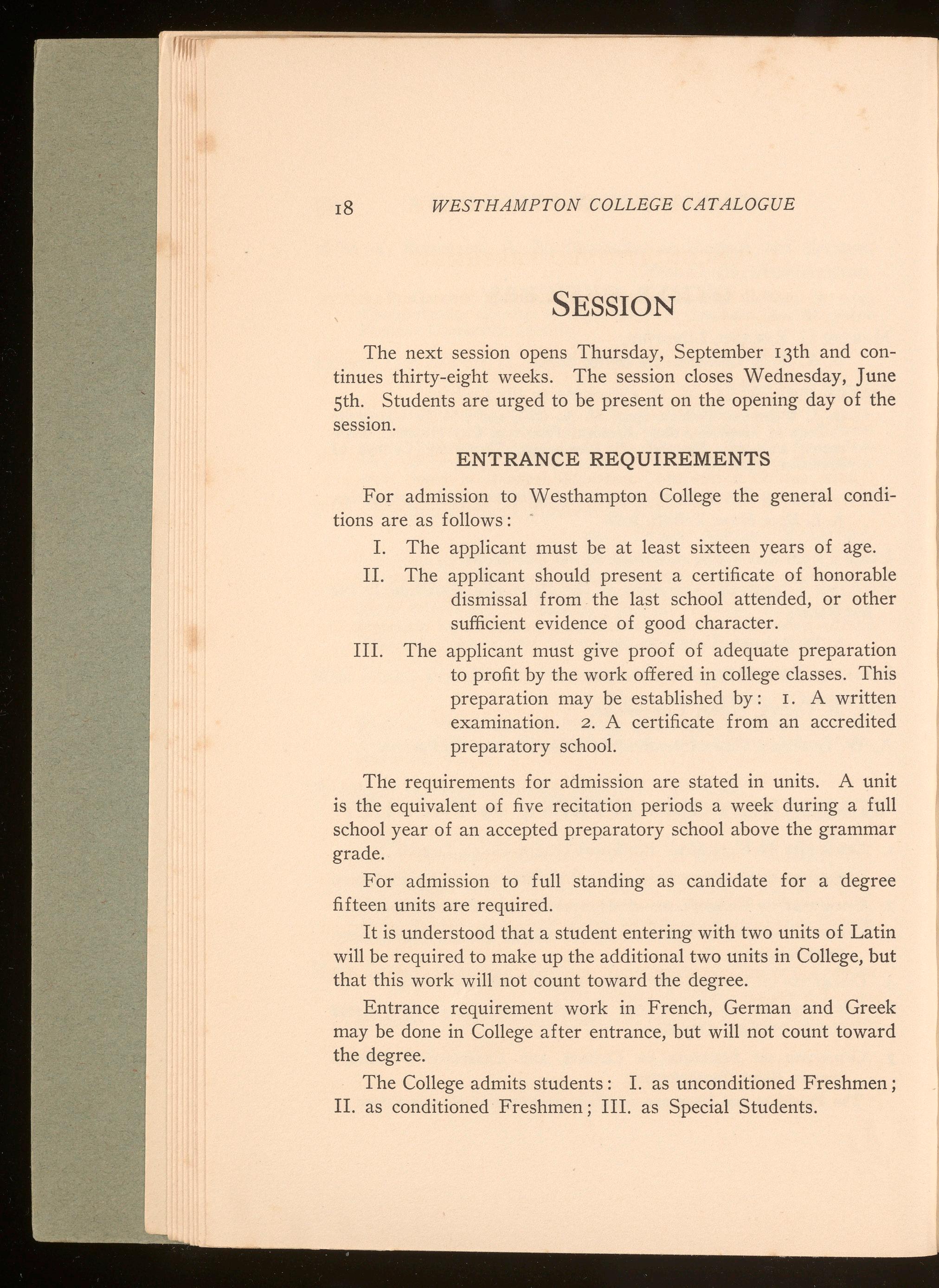
SESSION
The next session opens Thursday, September 13th and continues thirty-eight weeks. The session closes Wednesday, June 5th. Students are urged to be present on the opening day of the sess10n.
ENTRANCE REQUIREMENTS
For admission to Westhampton College the general conditions are as follows : ·
I. The applicant must be at least sixteen years of age.
II. The applicant should present a certificate of honorable dismissal from the last school attended, or other sufficient evidence of good character.
III. The applicant must give proof of adequate preparation to profit by the work offered in college classes. This preparation may be established by: 1. A written examination. 2. A certificate from an accredited preparatory school.
The requirements for admission are stated in units. A unit is the equivalent of five recitation periods a week during a full school year of an accepted preparatory school above the grammar grade.
For admission to full standing as candidate for a degree fifteen units are required.
It is understood that a student entering with two units of Latin will be required to make up the additional two units in College, but that this work will not count toward the degree.
Entrance requirement work in French, German and Greek may be done in College after entrance, but will not count toward the degree.
The College admits students : I. as unconditioned Freshmen; II. as conditioned Freshmen; III. as Special Students.
DEFINITION OF REQUIREMENTS
The following is a tabulated form of subjects for admission and their values in units. Fuller definitions of the units follow the table.
Subjects English Mathematics History
Latin
Greek French
German
Spanish
Science
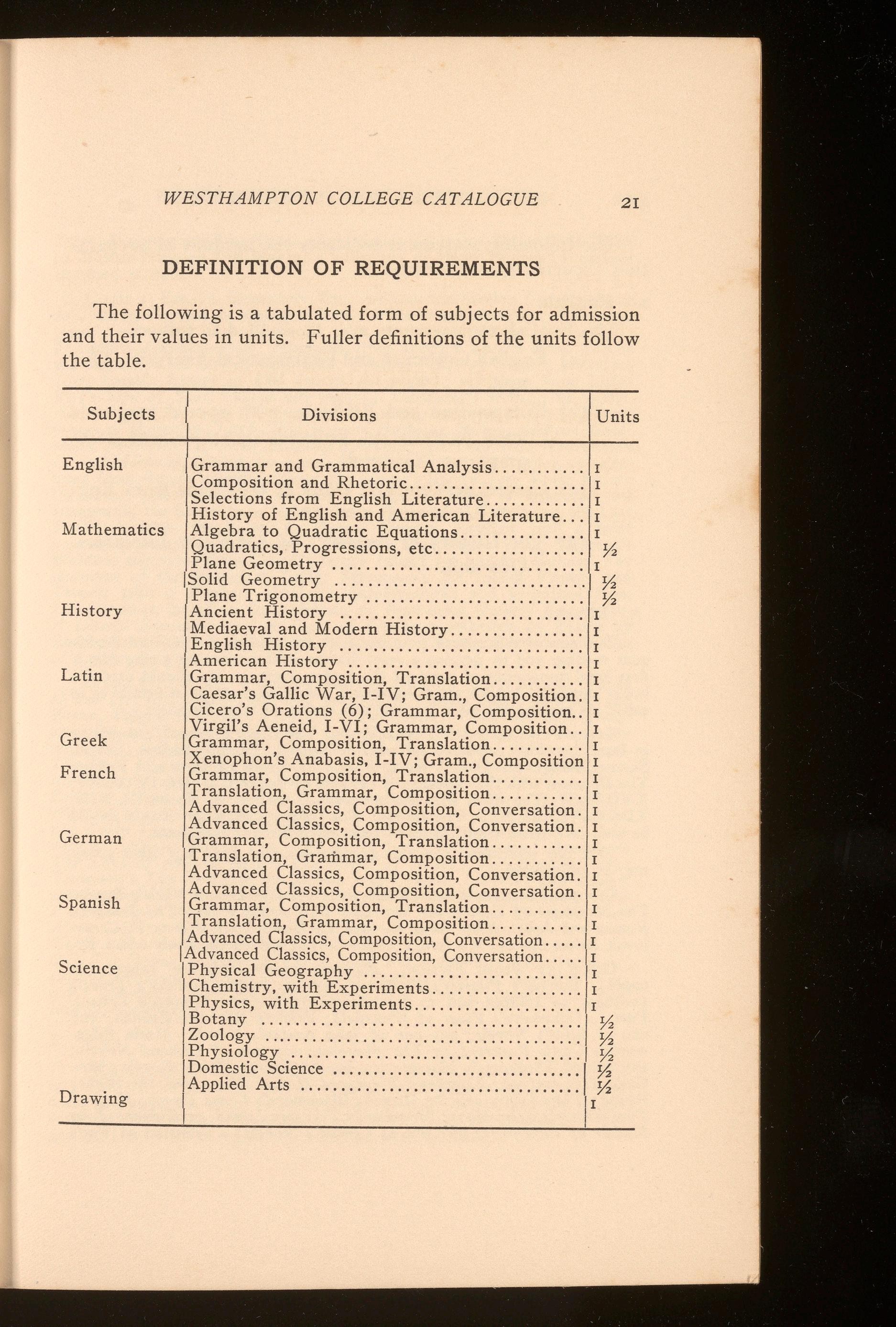
Grammar and Grammatical Analysis. I Composition and Rhetoric ... . I
Selections from English Literature . .. . ... . I History of English and American Literature I Algebra to Quadratic Equations ......... r Quadratics, Progressions, etc. . . .
½ Plane Geometry
!Solid Geometry
½ Plane Trigonometry
Ancient History .......
Mediaeval and Modern History.
I English History
American History
1 Grammar, Composition, Translation.
Caesar's Gallic War, I-IV; Gram ., Composition Cicero's Orations (6); Grammar, Composition .. Virgil's Aeneid, I-VI; Grammar, Composition . . I IGrammar, Composition, Translation .. .. .... .. 1
½
Xenophon's Anabasis, I-IV; Gram., Composition I Grammar, Composition, Translation I Translation, Grammar, Composition .. ... . .. I Advanced Classics, Composition, Conversation. Advanced Classics, Composition, Conversation. IGrammar, Composition, Translation .... 1 Translation, Grammar, Composition . . . . . . I Advanced Classics, Composition, Conversation. I Advanced Classics, Composition, Conversation. I Grammar, Composition, Translation I Translation, Grammar, Composition .. ... . . . I Advanced Classics, Composition, Conversation ... I IAd v anced Classics , Composition, Conversation .... . I Physical Geography .
Chemistry, with Experiments ..
I Physics, with Experiments ....
1
I Botany
Zoology
Physiology
Domestic Science
Applied Arts
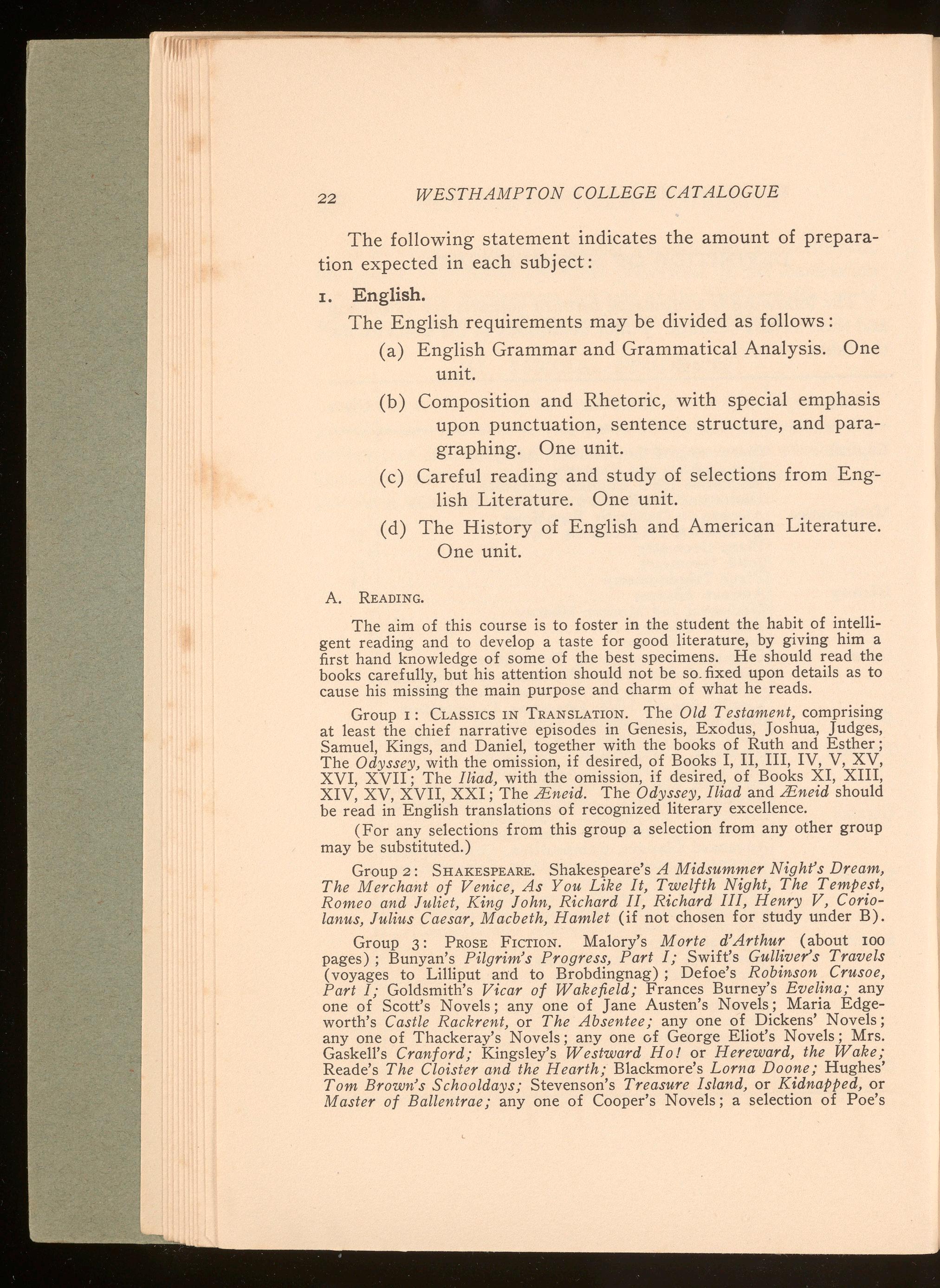
WESTHAMPTON COLLEGE CATALOGUE
The following statement indicates the amount of preparation expected in each subject:
1. English.
The English requirements may be divided as follows:
(a) English Grammar and Grammatical Analysis. One unit.
(b) Composition and Rhetoric, with special emphasis upon punctuation, sentence structure, and paragraphing. One unit.
( c) Careful reading and study of selections from English Literature. One unit.
(d) The History of English and American Literature. One unit.
A. READING
The aim of this course is to foster in the student the habit of intelligent reading and to develop a taste for good literature, by giving him a first hand knowledge of some of the best specimens. He should read the books carefully, but his attention should not be so . fixed upon details as to cause his missing the main purpose and charm of what he reads.
Group I: CLASSICSIN TRANSLATION.The Old Testament, comprising at least the chief narrative episodes in Genesis, Exodus, Joshua, Judges, Samuel, Kings, and Daniel, together with the books of Ruth and Esther; The Odyssey, with the omission, if desired, of Books I, II, III, IV, V, XV, XVI, XVII; The Iliad, with the omission, if desired, of Books XI, XIII, XIV, XV, XVII, XXI; The JEneid. The Odyssey, Iliad and JEneid should be read in English translations of recognized literary excellence. (For any selections from this group a selection from any other group may be substituted.)
Group 2: SHAKESPEARE.Shakespeare's A Midsummer Night's Dream, The Merchant of Venice, As You Like It, Twelfth Night, The Tempest, Romeo and Juli et, King John, Richard II, Richard III, Henry V, Coriolanus, Julius Caesar, Macbeth, Hamlet (if not chosen for study under B).
Group 3 : PROSE FICTION. Malory's M orte d'Arthur (about 100 pages); Bunyan's Pilgrim's Progress, Part I; Swift's Gulliver's Travels (voyages to Lilliput and to Brobdingnag); Defoe's Robinson Crusoe, Part I; Goldsmith's Vicar of Wakefield; Frances Burney's Evelina; any one of Scott's Novels; any one of Jane Austen's Novels; Maria Edgeworth's Castle Rackrent, or The Absentee; any one of Dickens' Novels; any one of Thackeray's Novels; any one of George Eliot's Novels; Mrs. Gaskell's Cranford; Kingsley's Westward Ho! or Hereward, the Wake; Reade's The Cloister and the Hearth; Blackmore's Lorna Doane; Hughes' Tom Brown's Schooldays; Stevenson's Treasure Island, or Kidnapped, or Master of Ballentrae; any one of Cooper's Novels; a selection of Poe's
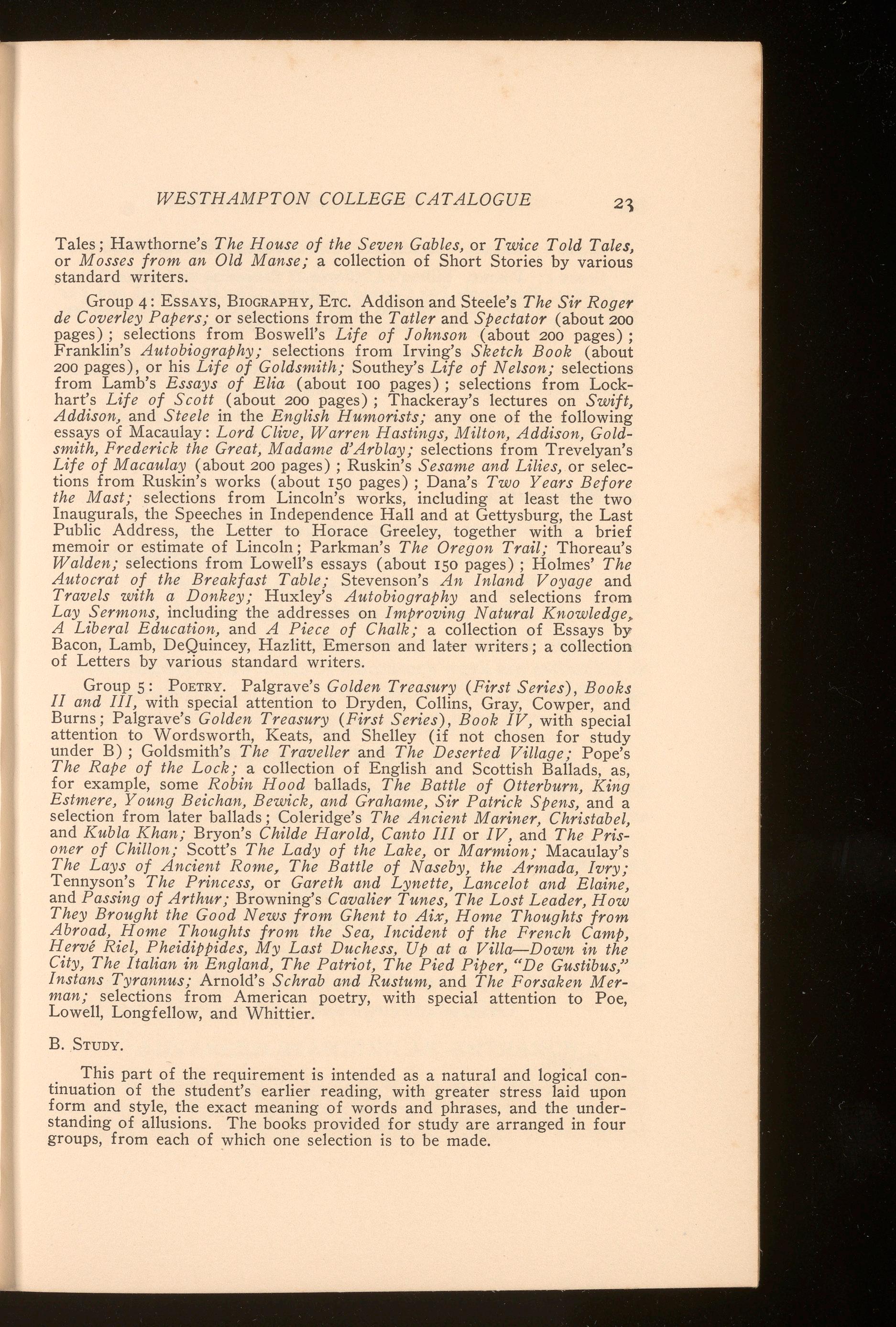
WESTHAMPTON
COLLEGE CATALOGUE
Tales; Hawthorne's The House of the Seven Gables, or Twice Told Tales, or Mosses from an Old Manse; a collection of Short Stories by various standard writers.
Group 4: ESSAYS,BIOGRAPHY,ETC. Addison and Steele's The Sir Roger de Coverley Papers; or selections from the Tatler and Spectator (about 200 pages); selections from Boswell's Life of Johnson (about 200 pages); Franklin's Autobiography; selections from Irving's Sketch Book (about 200 pages), or his Life of Goldsmith; Southey's Life of Nelson; selections from Lamb's Essays of Elia (about 100 pages); selections from Lockhart's Life of Scott (about 200 pages); Thackeray's lectures on Swift, Addison, and Steele in the English Humorists; any one of the following essays of Macaulay: Lord Clive, Warren Hastings, Milton, Addison, Gold- smith, Frederick the Great, Madame d'Arb lay; selections from Trevelyan's Life of Macaulay (about 200 pages); Ruskin's Sesame and Lilies, or selections from Ruskin's works (about 150 pages); Dana's Two Years Before the Mast; selections from Lincoln's works, including at least the two Inaugurals, the Speeches in Independence Hall and at Gettysburg, the Last Public Address, the Letter to Horace Greeley, together with a brief memoir or estimate of Lincoln; Parkman's The Oregon Trail; Thoreau's Walden; selections from Lowell's essays (about 150 pages); Holmes' The Autocrat of the Breakfast Table; Stevenson's An Inland Voyage and Travels with a Donkey; Huxley's Autobiography and selections from Lay Sermons, including the addresses on Improving Natural Knowledge, A Liberal Education, and A Piece of Chalk; a collection of Essays by Bacon, Lamb, DeQuincey, Hazlitt, Emerson and later writers; a collection of Letters by various standard writers.
Group 5: POETRY. Palgrave's Golden Treasury (First Series), Books II and III, with special attention to Dryden, Collins, Gray, Cowper, and Burns; Palgrave's Golden Treasury (First Series), Book IV, with special attention to Wordsworth, Keats, and Shelley (if not chosen for study under B); Goldsmith's The Traveller and The Deserted Village; Pope's The Rape of the Lock; a collection of English and Scottish Ballads, as, for example, some Robin Hood ballads, The Battle of Otterburn, King Estmere, Young Beichan, Bewick, and Grahame, Sir Patrick Spens, and a selection from later ballads; Coleridge's The Ancient Mariner, Christabel, and Kubla Khan; Bryon's Childe Harold, Canto III or IV, and The Prisoner of Chillon; Scott's The Lady of the Lake, or Marmion; Macaulay's The Lays of Ancient Rome, The Battle of Naseby, the Armada, Ivry; Tennyson's The Princess, or Gareth and Lynette, Lancelot and Elaine, and Passing of Arthur; Browning's Cavalier Tunes, The Lost Leader, How They Brought the Good News from Ghent to Aix, Home Thoughts from Abroad, Home Thoitghts from the Sea, Incident of the French Camp, Herve Riel, Pheidippides, My Last Duchess, Up at a Villa-Down in the City, The Italian in England, The Patriot, The Pied Piper, "De Gustibus," Instans Tyrannus; Arnold's Schrab and Rustum, and The Forsaken Merman; selections from American poetry, with special attention to Poe, Lowell, Longfellow, and Whittier.
B. STUDY.
This part of the requirement is intended as a natural and logical continuation of the student's earlier reading, with greater stress laid upon form and style, the exact meaning of words and phrases, and the understanding of allusions. The books provided for study are arranged in four groups, from each of which one selection is to be made.
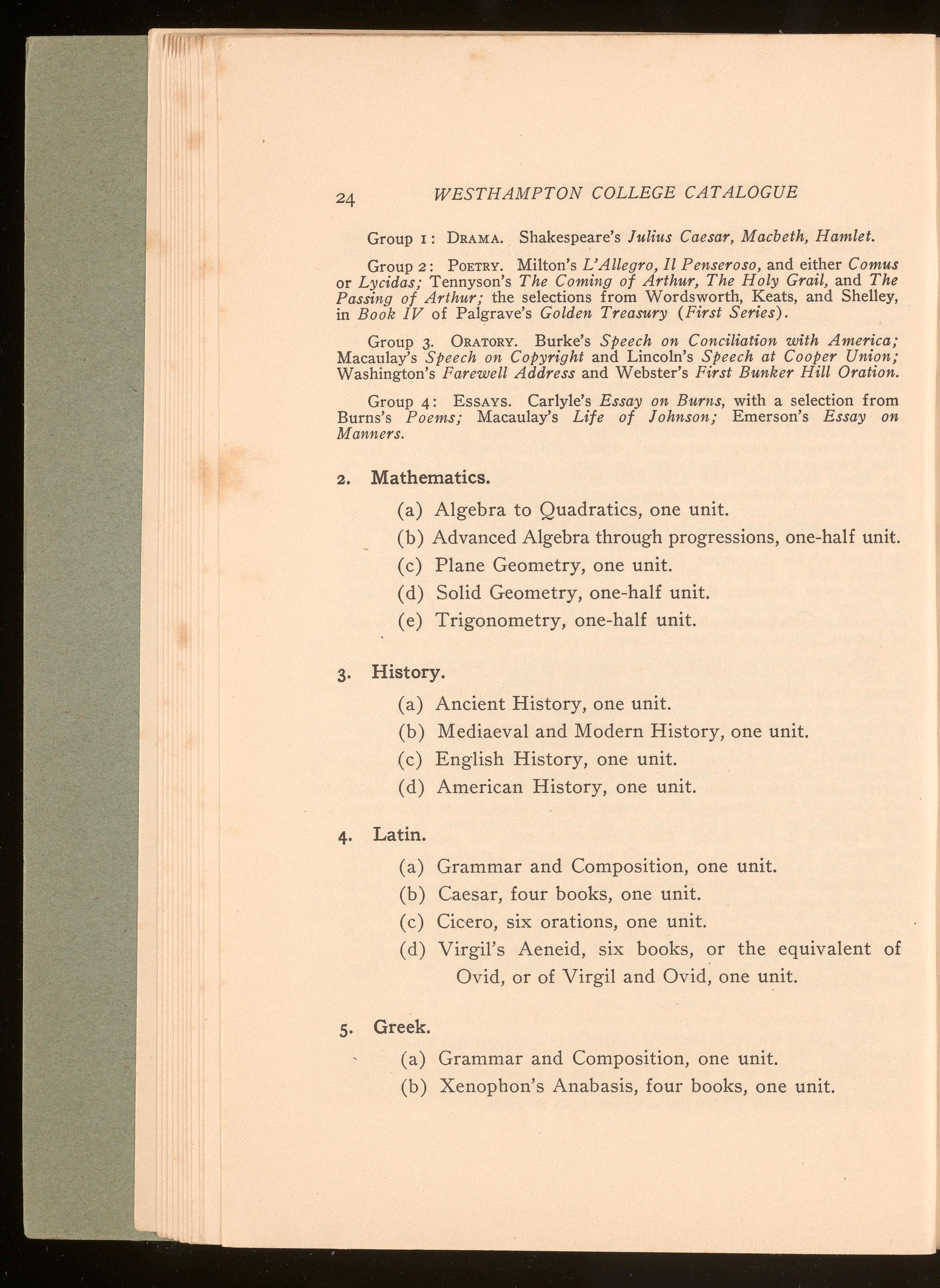
WESTHAMPTON COLLEGE CATALOGUE
Group 1: DRAMA. Shakespeare's Julius Caesar, Macbeth, Hamlet. Group 2: PoETRY. Milton's L'Allegro, Il Penseroso, and either Camus or Lycidas; Tennyson's The Coming of Arthur, The Holy Grail, and The Passing of Arthur; the selections from Wordsworth, Keats, and Shelley, in Book IV of Palgrave's Golden Treasury (First Series).
Group 3. ORATORY.Burke's Speech on Conciliation with America; Macaulay's Speech on Copyright and Lincoln's Speech at Cooper Union; Washington's Farewell Address and Webster's First Bunker Hill Oration.
Group 4: EssAYS. Carlyle's Essay 01i Burns, with a selection from Burns's Poems; Macaulay's Life of Johnson; Emerson's Essay on Manners.
2. Mathematics.
(a) Algebra to Quadratics, one unit.
(b) Advanced Algebra through progressions, one-half unit.
( c) Plane Geometry, one unit.
( d) Solid Geometry, one-half unit.
( e) Trigonometry, one-half unit.
3. History.
(a) Ancient History, one unit.
(b) Mediaeval and Modern History, one unit.
(c) English History, one unit.
( d) American History, one unit.
4. Latin.
(a) Grammar and Composition, one unit.
(b) Caesar, four books, one unit.
( c) Cicero, six orations, one unit.
( d) Virgil's Aeneid, six books, or the equivalent of Ovid, or of Virgil and Ovid, one unit.
5. Greek.
(a) Grammar and Composition, one unit.
(b) Xenophon's Anabasis, four books, one unit.
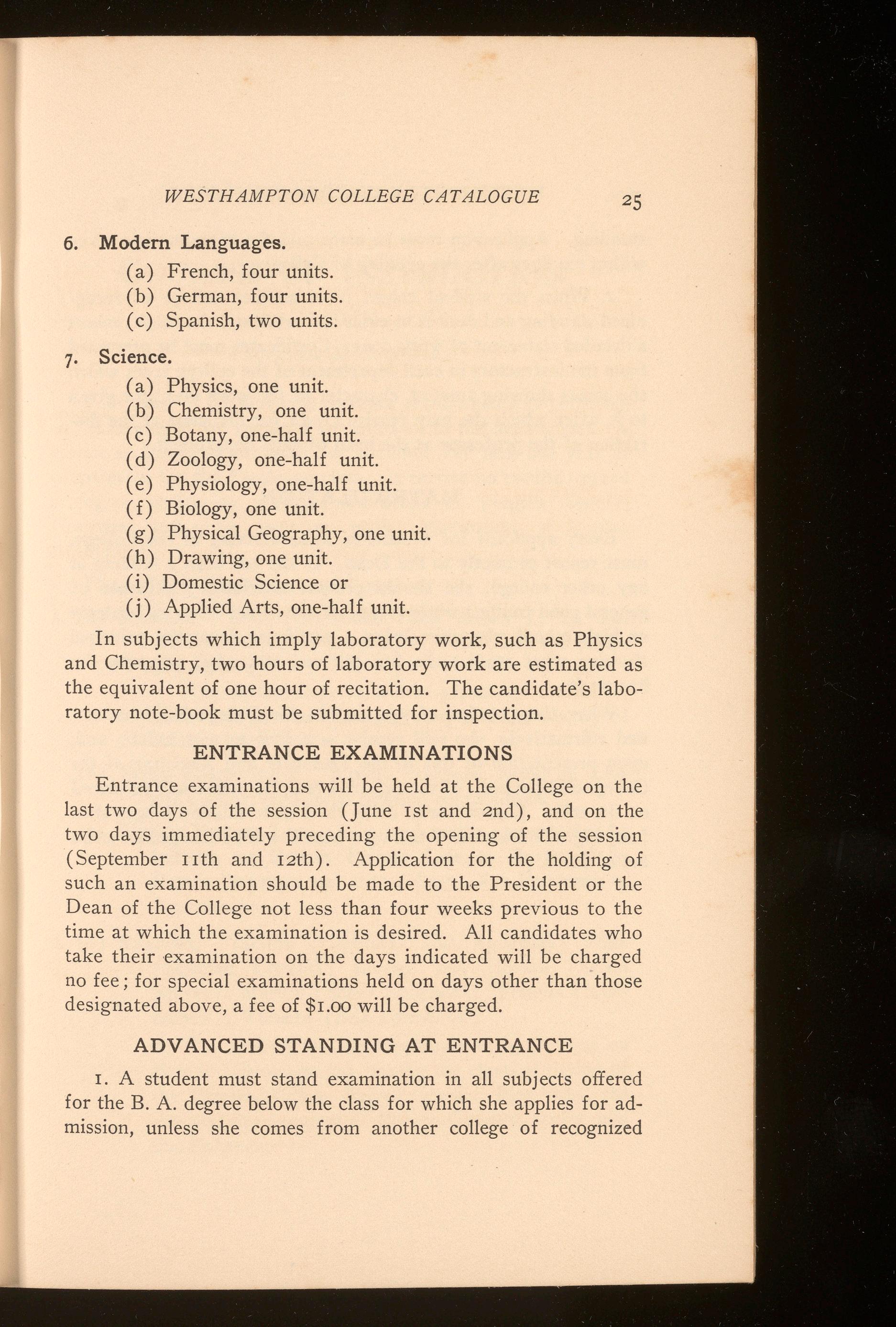
6. Modern Languages.
(a) French, four units.
(b) German, four units.
(
c) Spanish, two units.
7. Science.
(a) Physics, one unit.
(b) Chemistry, one unit.
(
c) Botany, one-half unit.
(
d) Zoology, one-half unit.
(
e) Physiology, one-half unit.
(f) Biology, one unit.
(g) Physical Geography, one unit
(h) Drawing, one unit.
(
i) Domestic Science or
(j) Applied Arts, one-half unit.
In subjects which imply laboratory work, such as Physics and Chemistry, two hours of laboratory work are estimated as the equivalent of one hour of recitation. The candidate's laboratory note-book must be submitted for inspection.
ENTRANCE EXAMINATIONS
Entrance examinations will be held at the College on the last two days of the session (June I st and 2nd), and on the two days immediately preceding the opening of the session (September 11th and 12th). Application for the holding of such an examination should be made to the President or the Dean of the College not less than four weeks previous to the time at which the examination is desired. All candidates who take their ·examination on the days indicated will be charged no fee; for special examinations held on days other than those designated above, a fee of $1.00 will be charged.
ADVANCED STANDING AT ENTRANCE
I. A student must stand examination in all subjects offered for the B. A. degree below the class for which she applies for admission, unless she comes from another college of recognized
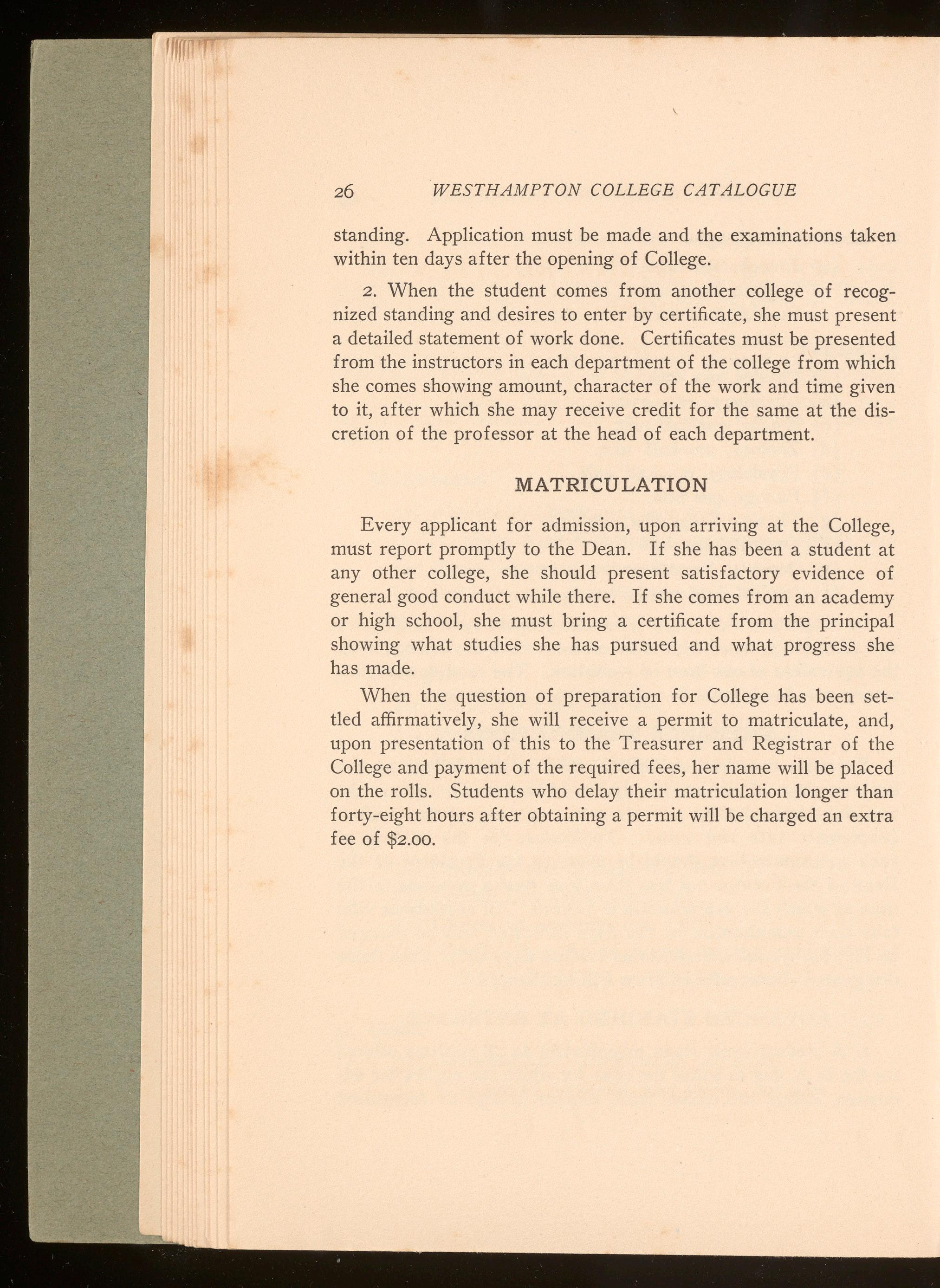
COLLEGE CATALOGUE
standing. Application must be made and the examinations taken within ten days after the opening of College.
2. When the student comes from another college of recognized standing and desires to enter by certificate, she must present a detailed statement of work done. Certificates must be presented from the instructors in each department of the college from which she comes showing amount, character of the work and time given to it, after which she may receive credit for the same at the discretion of the professor at the head of each department.
MATRICULATION
Every applicant for admission, upon arriving at the College, must report promptly to the Dean . If she has been a student at any other college, she should present satisfactory evidence of general good conduct while there. If she comes from an academy or high school, she must bring a certificate from the principal showing what studies she has pursued and what progress she has made.
When the question of preparation for College has been settled affirmatively, she will receive a permit to matriculate, and, upon presentation of this to the Treasurer and Registrar of the College and payment of the required fees, her name will be placed on the rolls. Students who delay their matriculation longer than forty-eight hours after obtaining a permit will be charged an extra fee of $2.00.
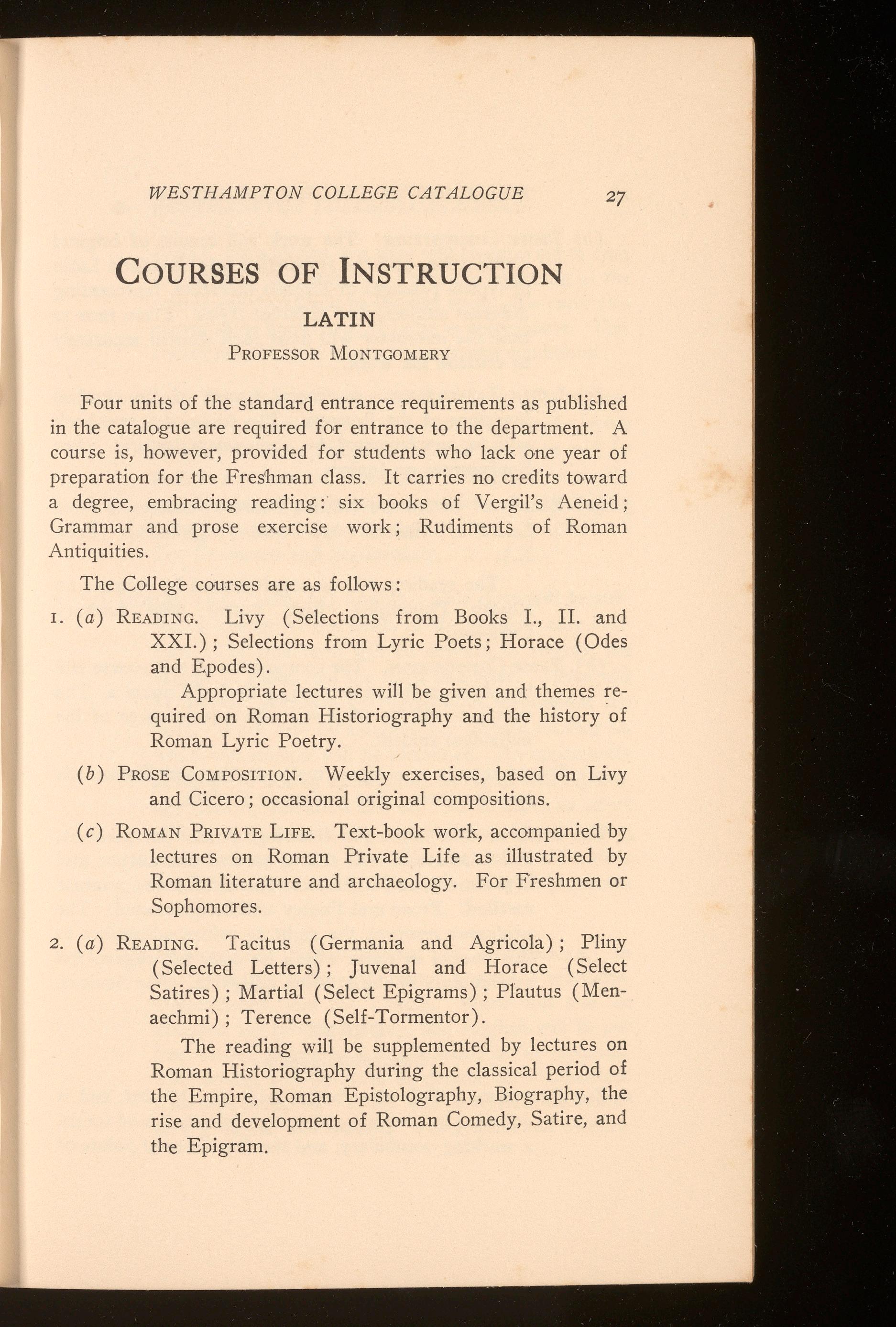
COURSES OF INSTRUCTION
LATIN
PROFESSORMONTGOMERY
Four units of the standard entrance requirements as published in the catalogue are required for entrance to the department. A course is, however, provided for students who lack one year of preparation for the Freshman class. It carries no credits toward a degree, embracing reading: six books of Vergil's Aeneid; Grammar and prose exercise work; Rudiments of Roman Antiquities.
The College courses are as follows :
r. (a) READING. Livy ( Selections from Books I., II. and XXI.) ; Selections from Lyric Poets; Horace ( Odes and E,podes).
Appropriate lectures will be given and themes required on Roman Historiography and the history of Roman Lyric Poetry.
( b) PROSE COMPOSITION . Weekly exercises, based on Livy and Cicero; occasional original compositions.
( c) ROMANPRIVATELIFE. Text-book work, accompanied by lectures on Roman Private Life as illustrated by Roman literature and archaeology. For Freshmen or Sophomores.
2. (a) READING. Tacitus ( Germania and Agricola) ; Pliny ( Selected Letters) ; Juvenal and Horace ( Select Satires) ; Martial ( Select Epigrams) ; Plautus ( Menaechmi) ; Terence (Self-Tormentor).
The reading will be supplemented by lectures on Roman Historiography during the classical period of the Empire, Roman Epistolography, Biography, the rise and development of Roman Comedy, Satire, and the Epigram.
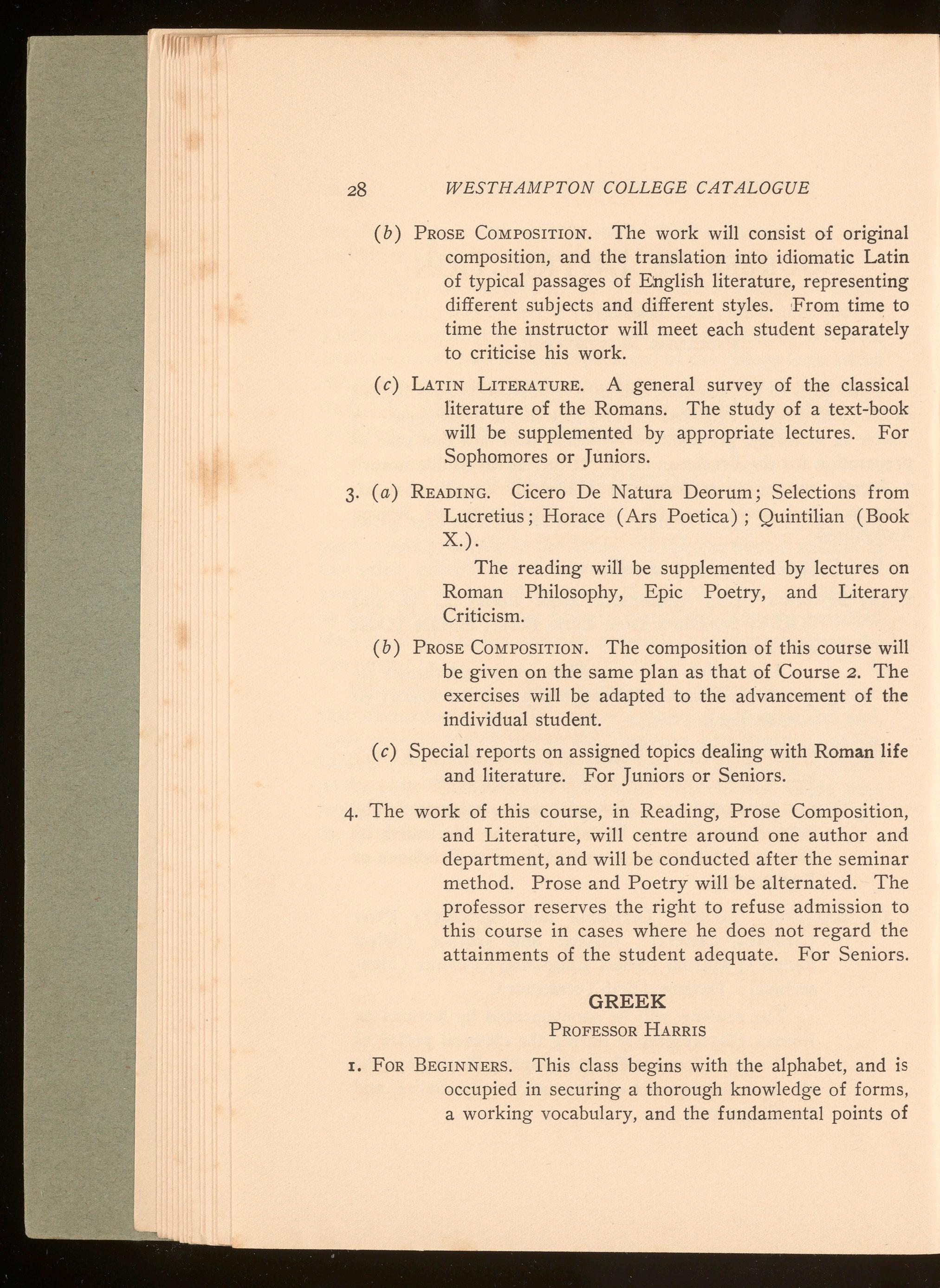
28 WESTHAMPTON COLLEGE CATALOGUE
( b) PROSECOMPOSITION.The work will consist of original composition, and the translation into idiomatic Latin of typical passages of E:nglish literature, representing different subjects and different styles. ·From time to time the instructor will meet each student separately to criticise his work.
( c) LATIN LITER.A.TURE. A general survey of the classical literature of the Romans . The study of a text-book will be supplemented by appropriate lectures For Sophomores or Juniors.
3. (a) READING. Cicero De Natura Deorum; Selections from Lucretius; Horace (Ars Poetica) ; Quintilian (Book X.).
The reading will be supplemented by lectures on Roman Philosophy, Epic Poetry, and Literary Criticism.
( b) PROSECOMPOSITION.The composition of this course will be given on the same plan as that of Course 2. The exercises will be adapted to the advancement of the individual student.
( c) Special reports on assigned topics dealing with Roman life and literature. For Juniors or Seniors.
4. The work of this course, in Reading, Prose Composition, and Literature, will centre around one author and department, and will be conducted after the seminar method . Prose and Poetry will be alternated. The professor reserves the right to refuse admission to this course in cases where he does not regard the attainments of the student adequate. For Seniors.
GREEK
PROFESSORHARRIS
I. FoR BEGINNERS. This class begins with the alphabet, and is occupied in securing a thorough knowledge of forms , a working vocabulary, and the fundamental points of
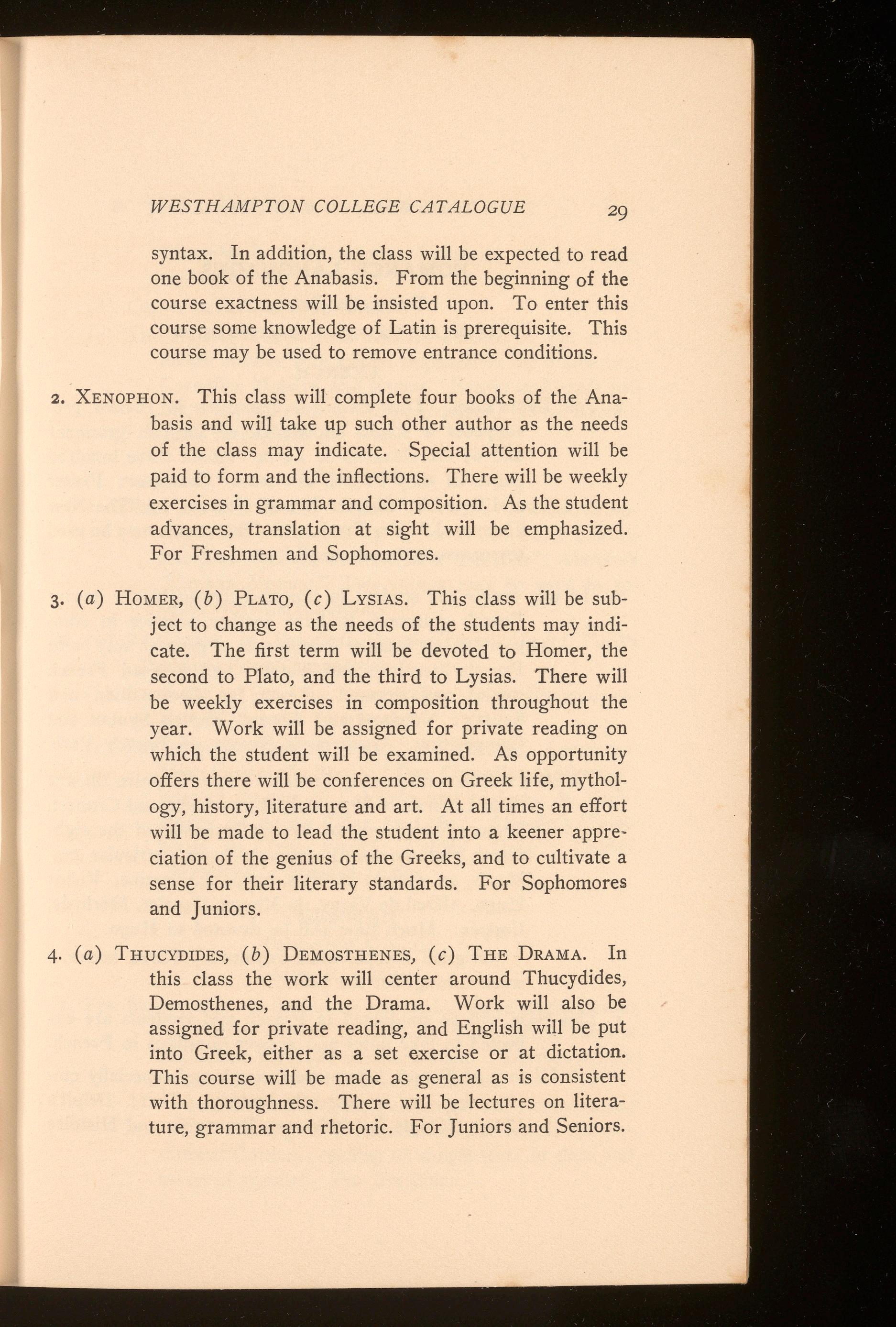
syntax. In addition, the class will be expected to read one book of the Anabasis. From the beginning of the course exactness will be insisted upon. To enter this course some knowledge of Latin is prerequisite. This course may be used to remove entrance conditions.
2. XENOPHON. This class will complete four books of the Anabasis and will take up such other author as the needs of the class may indicate. Special attention will be paid to form and the inflections. There will be weekly exercises in grammar and composition . As the student advances, translation at sight will be emphasized. For Freshmen and Sophomores .
3. (a) HOMER, ( b) PLATO, ( c) LYSIAS. This class will be subject to change as the needs of the students may indicate. The first term will be devoted to Homer, the second to Plato, and the third to Lysias There will be weekly exercises in composition throughout the year. Work will be assigned for private reading on which the student will be examined. As opportunity offers there will be conferences on Greek life, mythology, history, literature and art. At all times an effort will be made to lead the student into a keener appre • ciation of the genius of the Greeks, and to cultivate a sense for their literary standards. For Sophomores and Juniors.
4. (a) THUCYDIDES,( b) DEMOSTHENES, ( C) THE DRAMA. In this class the work will center around Thucydides, Demosthenes, and the Drama. Work will also be assigned for private reading, and English will be put into Greek, either as a set exercise or at dictation. This course will be made as general as is consistent with thoroughness. There will be lectures on literature, grammar and rhetoric. For Juniors and Seniors.
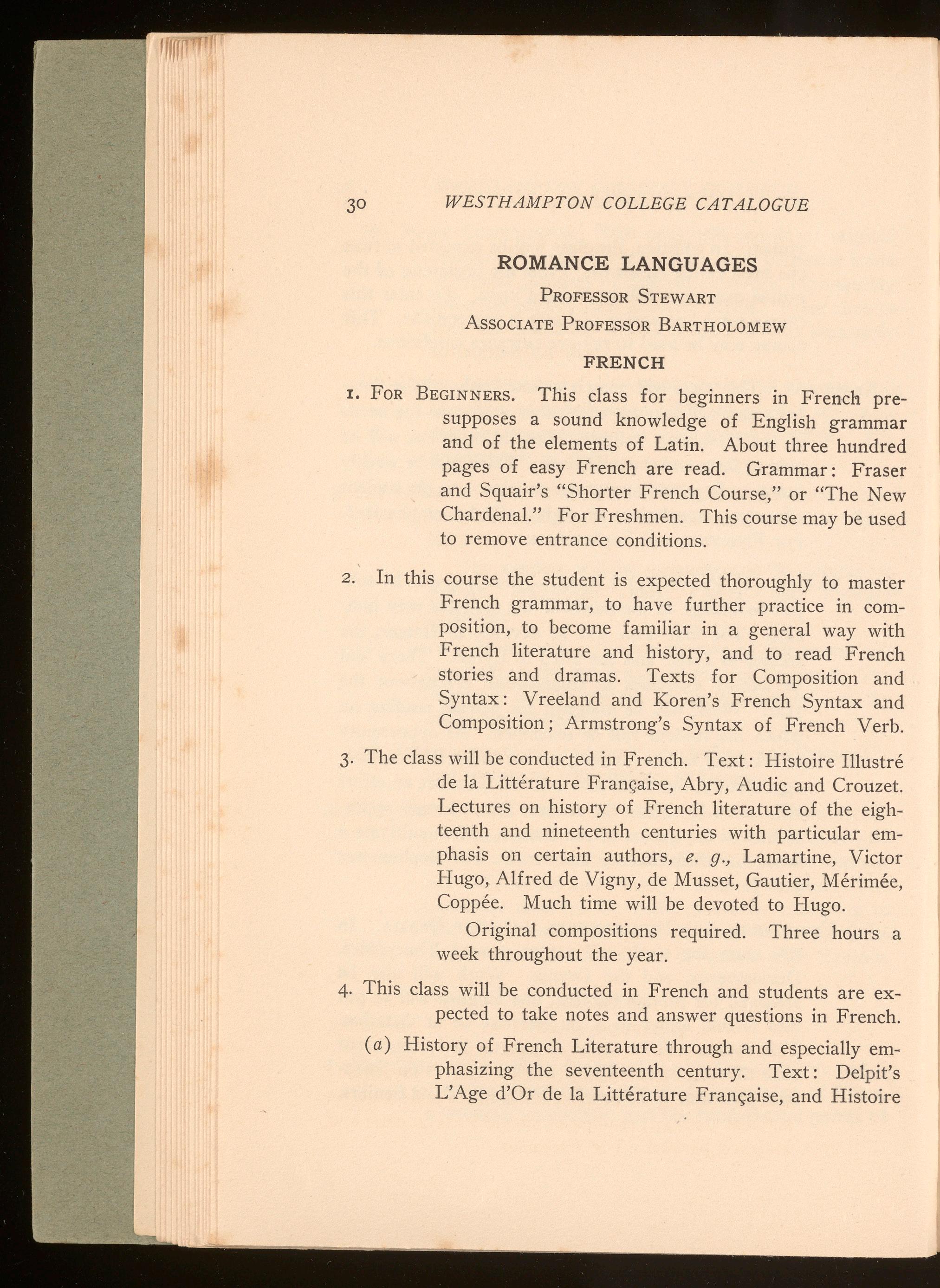
ROMANCE LANGUAGES
PROFESSORSTEWART
ASSOCIATEPROFESSORBARTHOLOMEW
FRENCH
1. FoR BEGINNERS. This class for beginners in French presupposes a sound knowledge of English grammar and of the elements of Latin. About three hundred pages of easy French are read. Grammar: Fraser and Squair's "Shorter French Course," or "The New Chardenal." For Freshmen. This course may be used to remove entrance conditions.
2. In this course the student is expected thoroughly to master French grammar, to have further practice in composition, to become familiar in a general way with French literature and history, and to read French stories and dramas. Texts for Composition and Syntax: Vreeland and Koren's French Syntax and Composition; Armstrong's Syntax of French Verb.
3. The class will be conducted in French. Text: Histoire Illustre de la Litterature Fran c;aise, Abry, Audie and Crouzet. Lectures on history of French literature of the eighteenth and nineteenth centuries with particular emphasis on certain authors, e. g., Lamartine, Victor Hugo, Alfred de Vigny, de Musset, Gautier, Merimee, Coppee. Much time will be devoted to Hugo. Original compositions required. Three hours a week throughout the year.
4. This class will be conducted in French and students are expected to take notes and answer questions in French.
(a) History of French Literature through and especially emphasizing the seventeenth century. Text: Delpit's L' Age d'Or de la Litterature Frarn;aise, and Histoire
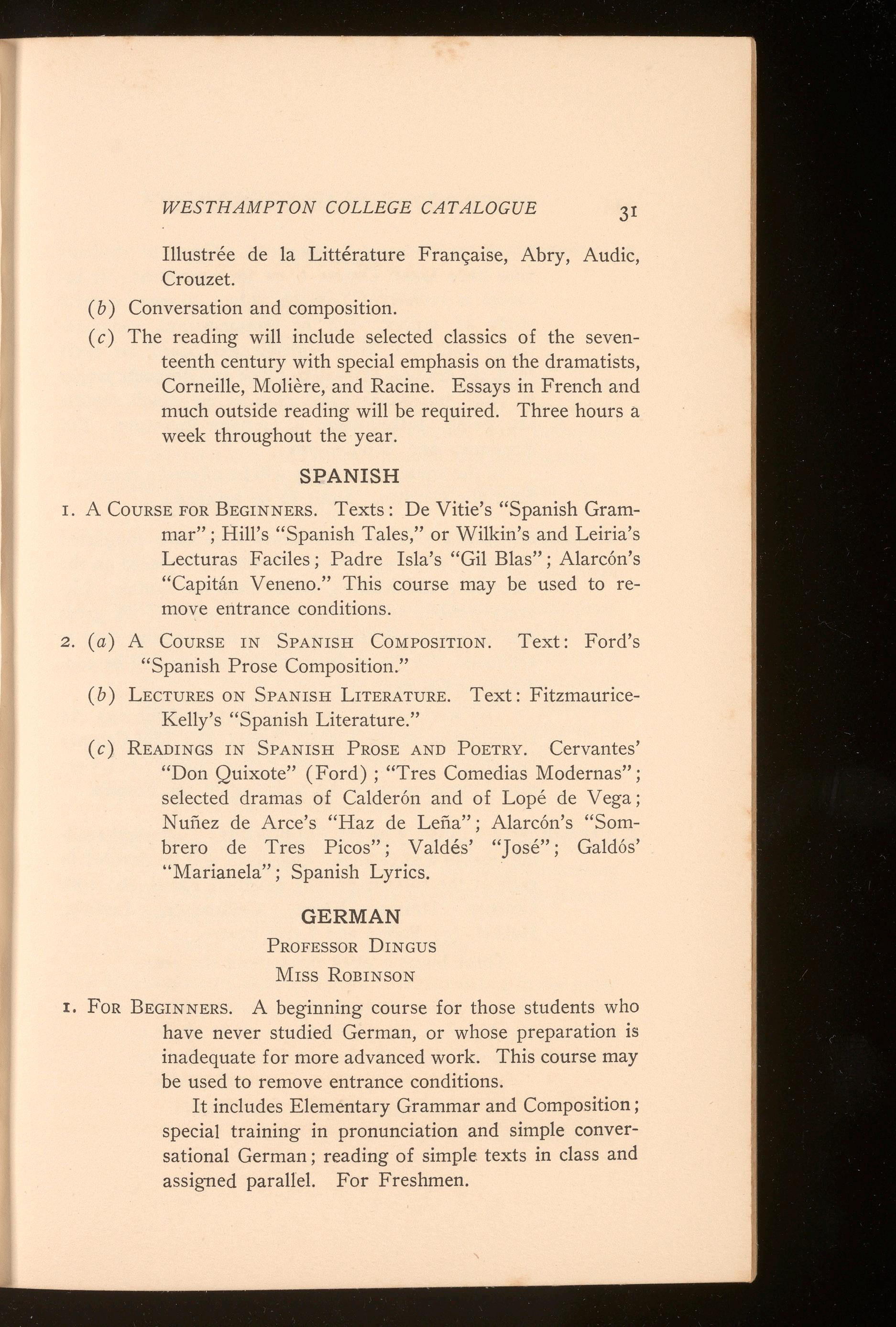
WESTHAMPTON COLLEGE CATALOGUE 31
Illustree de la Litterature Fran~aise, Abry, Audie, Crouzet.
( b) Conversation and composition.
( c) The reading will include selected classics of the seventeenth century with special emphasis on the dramatists, Corneille, Moliere, and Racine. Essays in French and much outside reading will be required. Three hours a week throughout the year.
SPANISH
I. A CouRSE FORBEGINNERS. Texts: De Vitie's "Spanish Grammar"; Hill's "Spanish Tales," or Wilkin's and Leiria's Lecturas Faciles; Padre Isla's "Gil Blas"; Alarc6n's "Capitan Veneno." This course may be used to remove entrance conditions.
2. (a) A CouRSE IN SPANISH COMPOSITION. Text: Ford's "Spanish Prose Composition."
( b) LECTURESON SPANISH LITERATURE.Text: FitzmauriceKelly's "Spanish Literature."
(c) READINGSIN SPANISH PROSE AND POETRY. Cervantes' "Don Quixote" (Ford); "Tres Comedias Modernas"; selected dramas of Calderon and of Lope de Vega; Nunez de Arce's "Haz de Lena"; Alarc6n's "Sombrero de Tres Ficos"; Valdes' "Jose"; Gald6s' "Marianela"; Spanish Lyrics.
GERMAN
PROFESSORDINGUS
Miss RoBINSON
I. FoR BEGINNERS. A beginning course for those students who have never studied German, or whose preparation is inadequate for more advanced work. This course may be used to remove entrance conditions. It includes Elementary Grammar and Composition; special training in pronunciation and simple conversational German; reading of simple texts in class and assigned parallel. For Freshmen.

2. INTRODUCTIONTO GERMAN LITERATURE. Open to students who have taken Course I, or its equivalent. It includes a review of German forms, a more careful study of syntax, drill in pronunciation, conversational exercises, free reproduction based on texts read, the reading of modern prose and dramatic works in class and as assigned parallel on which reports are made. Introduction to German literature. For Freshmen and Sophomores.
In the winter term there will be offered a course in Scientific German. Hour to be arranged.
3. ADVANCEDCouRSE. Open to students who have completed Course 2, or its equivalent. Emphasis is placed on the Literature and Realien, rather than the syntax. Literary periods and movements are studied. A great deal of reading is assigned, on which regular reports are made. So far as feasible, this course will be conducted in German.
The work of the year will gather about (a) An Introduction to the Classic Period, (b) Mid-Century Novelists: Scheffel, Meyer, Keller, Storm; ( c) German Literature since the founding of the Empire.
4. PREREQUISITE,CouRSE 3 ORITS EQUIVALENT. Collateral reading, essays and reports. One term will be devoted to each of the following: (a) Goethe's Faust, (b) 19th Century Drama -Kleist, Grillparzer, Ludwig, Hebbel, (c) Ballad and Lyric Poetry.
Three hours a week throughout the year.
ENGLISH
PROFESSORMETCALF
PROFESSORKELLER
Miss ROBINSON
r. (a) COMPOSITION.Theme writing based on specimens of exposition and description. Freshman year, three hours a week, first term. Weekly themes, with individual criticisms and interviews . Second and third terms.
( b) LITERATURE. A survey of English literature from Beowulf to Tennyson.
Three hours a week, second and third terms.
Miss ROBINSON
2 . (a) NARRATIVEWRITING. A study of narration, with practice in writing the short story. The course deals with problems of narrative structure; the differentiation of short story types; the finding and organization of material; the construction and criticism of plot; the form and function of dialogue; various methods of character drawing. At least one short story will be written by each student.
Three hours a week, first term.
( b) SHAKESPEARE.Critical reading of a few plays, followed by careful reading of a number of plays illustrating the growth of Shakespeare as an artist and his place in Elizabethan drama
Three hours a week, second term.
(c) NINETEENTHCENTURYPROSE. Wide reading in the prose of the period exclusive of the novel and short story; a study of the work of the essayists and critics of the period, Lamb, DeQuincy, Hazlett, Landor, Newman, Carlyle, Ruskin
Three hours a week, third term.
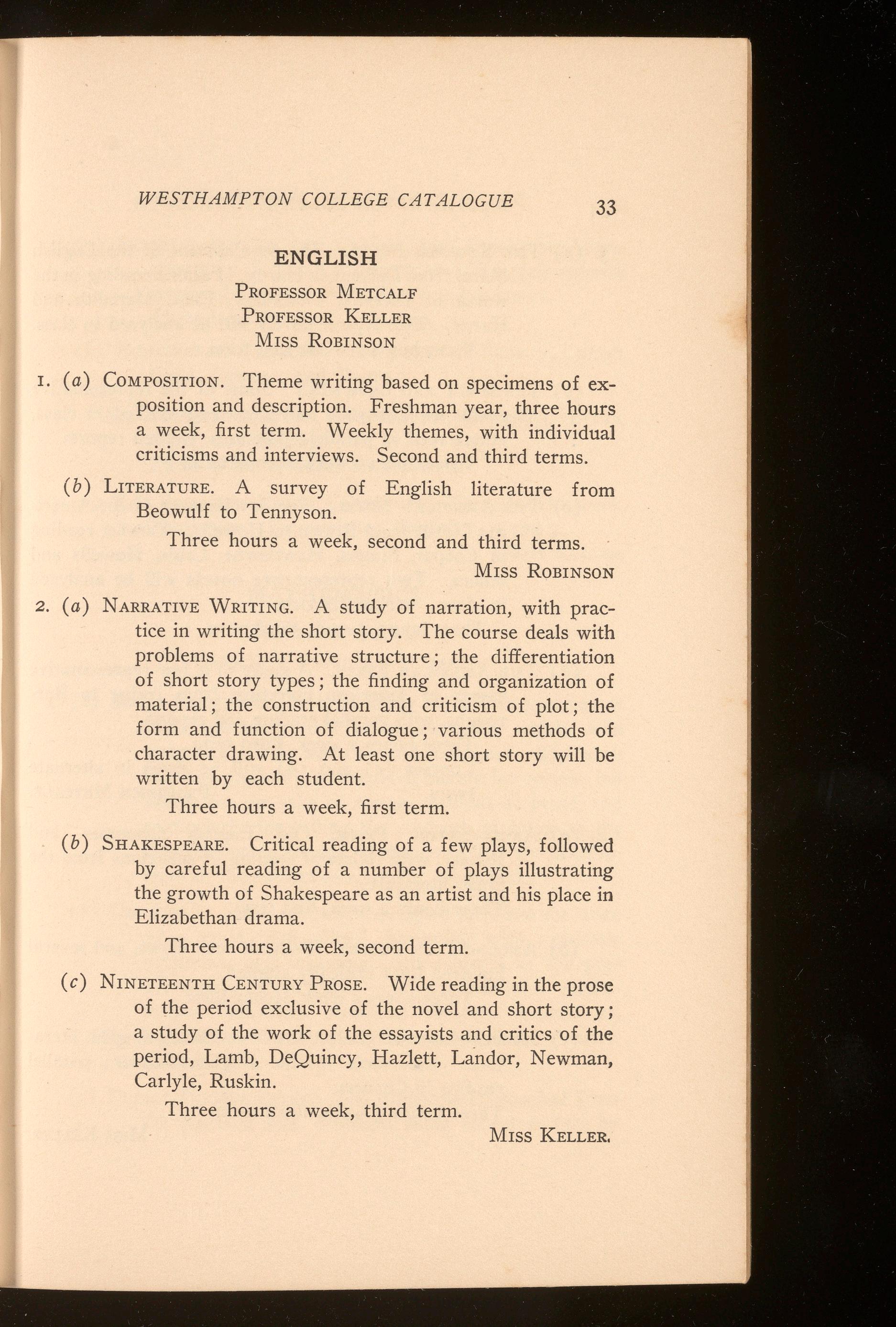
Mrss KELLER,
3. (a) THE ENGLISH NOVEL. The development of the English Novel from Dickens to Hardy. Parallel reading in the works of Dickens, Thackeray, Eliot, Meredith and Hardy. Two typical novels will be analyzed in class. Three hours a week, first term.
( b) TENNYSONAND BROWNING. Some of the representative poems of Tennyson and Browning studied in class, others read as parallel. Lectures, written reports.
Three hours a week, second term.
( c) THE AMERICANNOVEL. The development of the American Novel from Brown to Howells. Parallel reading in Cooper, Simms, Hawthorne, Cable, Howells and others. Two representative novels will be analyzed in class. Written reports.
Three hours a week, third term.
(d) THE AMERICANEssAY. A study of a few representative essays in American literature from Irving to Burroughs, with parallel reading and reports.
Three hours a week, third term.
Courses ( c) and ( d) will be given in alternate years. PROFESSORMETCALF .
4. (a) ANGLO-SAXON PROSE. Old English Grammar and Reader, with collateral reading of selections from the prose literature.
Three hours a week, first term.
( b) ANGLO-SAXONPOETRY. Beowulf read entire, and several hundred lines critically studied.
Three hours a week, second term.
( c) MIDDLEENGLISH. Selections from Middle English literature. Emerson's Middle English Reader; parallel reading in Chaucer.
Three hours a week, third term.
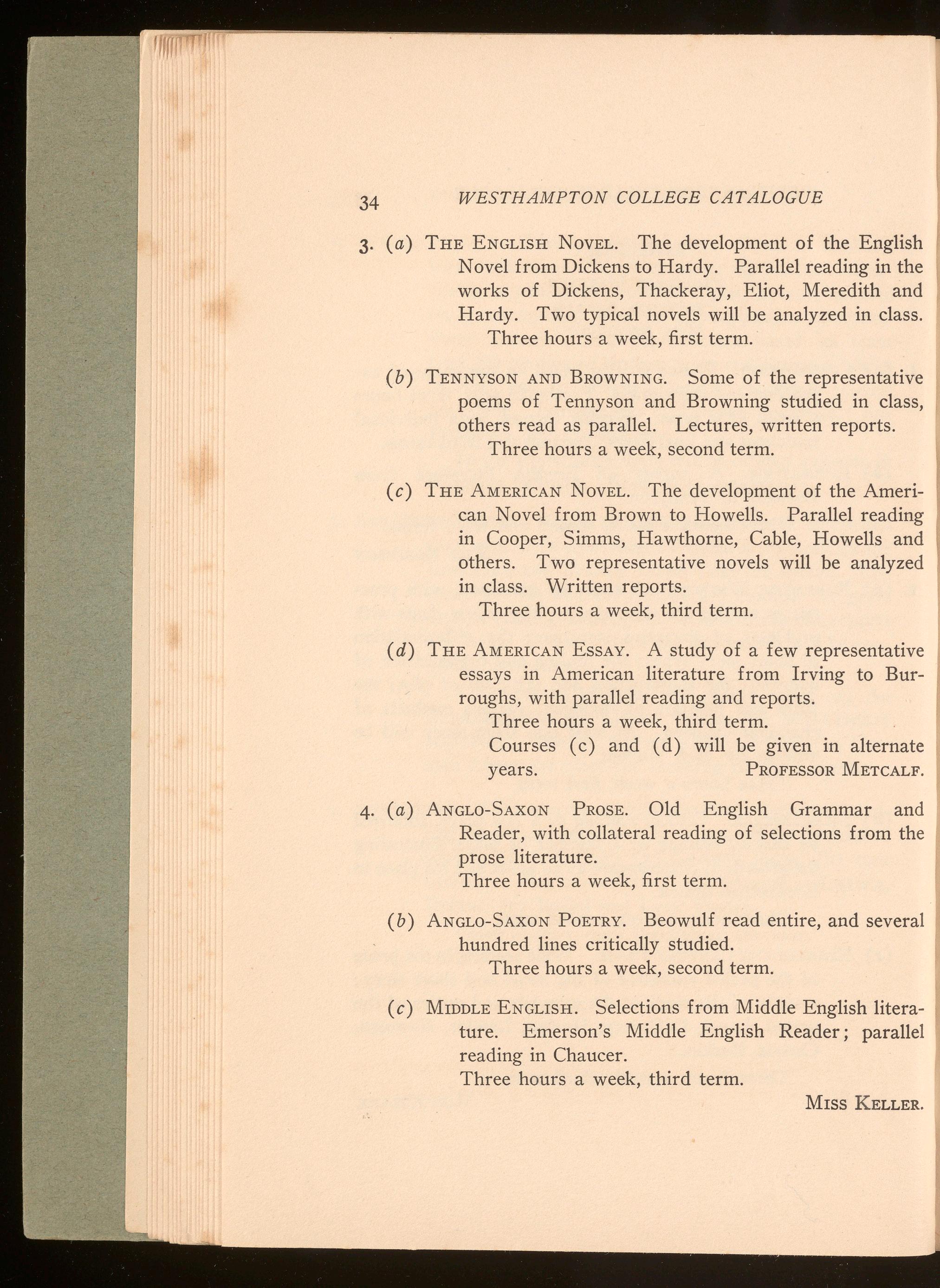
Mrss KELLER
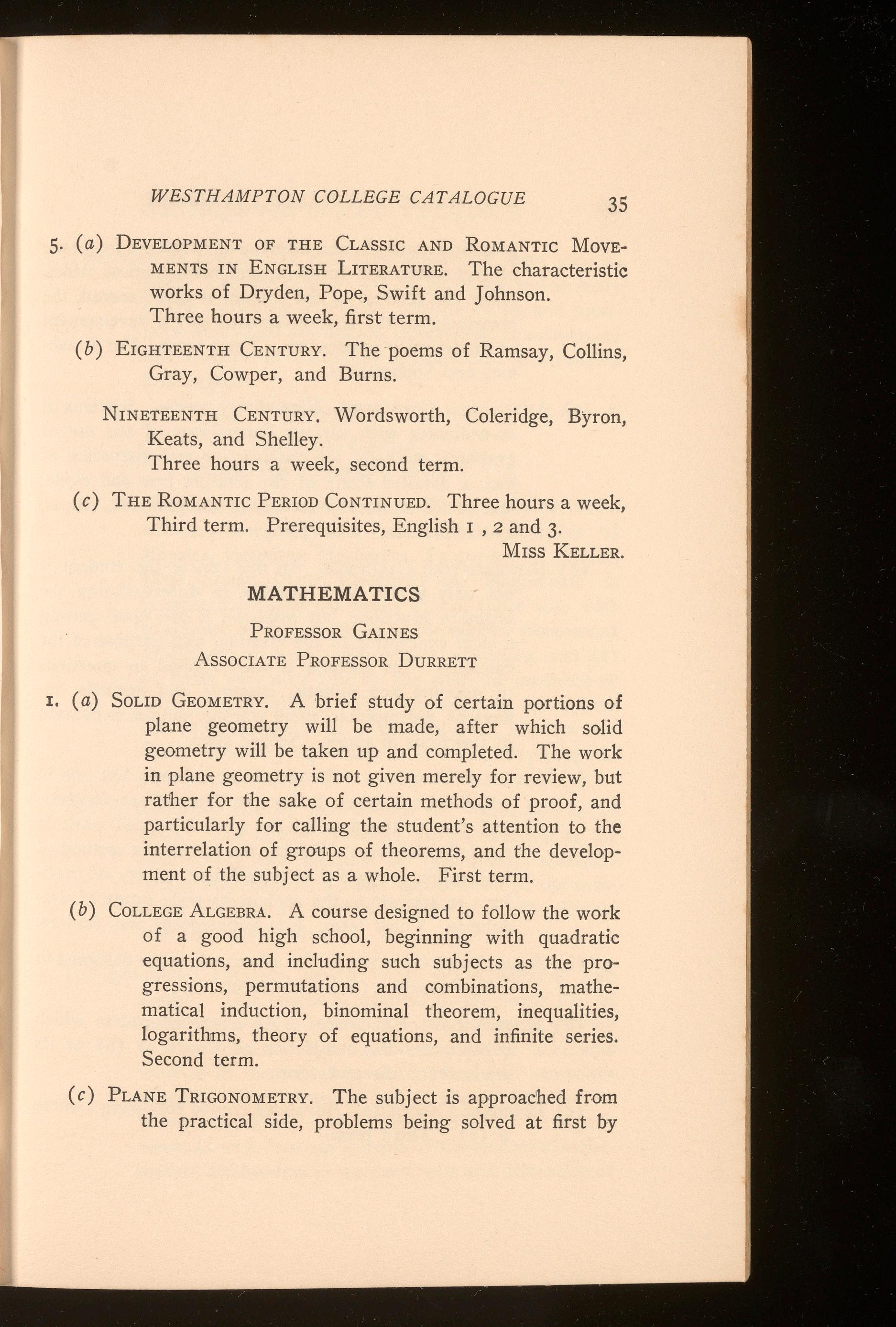
5. (a) DEVELOPMENTOF THE CLASSIC AND ROMANTIC MOVEMENTS IN ENGLISH LITERATURE. The characteristic works of Dryden, Pope, Swift and Johnson. Three hours a week, first term.
( b) EIGHTEENTH CENTURY. The poems of Ramsay, Collins, Gray, Cowper, and Burns.
NINETEENTH CENTURY. Wordsworth, Coleridge, Byron, Keats, and Shelley. Three hours a week, second term.
( c) THE ROMANTICPERIODCONTINUED. Three hours a week, Third term. Prerequisites, English I , 2 and 3.
ASSOCIATEPROFESSORDURRETT Miss KELLER.
MATHEMATICS
PROFESSORGAINES
I. (a) SoLID GEOMETRY. A brief study of certain portions of plane geometry will be made, after which solid geometry will be taken up and completed. The work in plane geometry is not given merely for review, but rather for the sake of certain methods of proof, and particularly for calling the student's attention to the interrelation of grou,ps of theorems, and the development of the subject as a whole. First term.
( b) COLLEGEALGEBRA. A course designed to follow the work of a good high school, beginning with quadratic equations, and including such subjects as the progressions, permutations and combinations, mathematical induction, binominal theorem, inequalities, logarithms, theory of equations, and infinite series. Second term.
(c) PLANE TRIGONOMETRY. The subject is approached from the practical side, problems being solved at first by
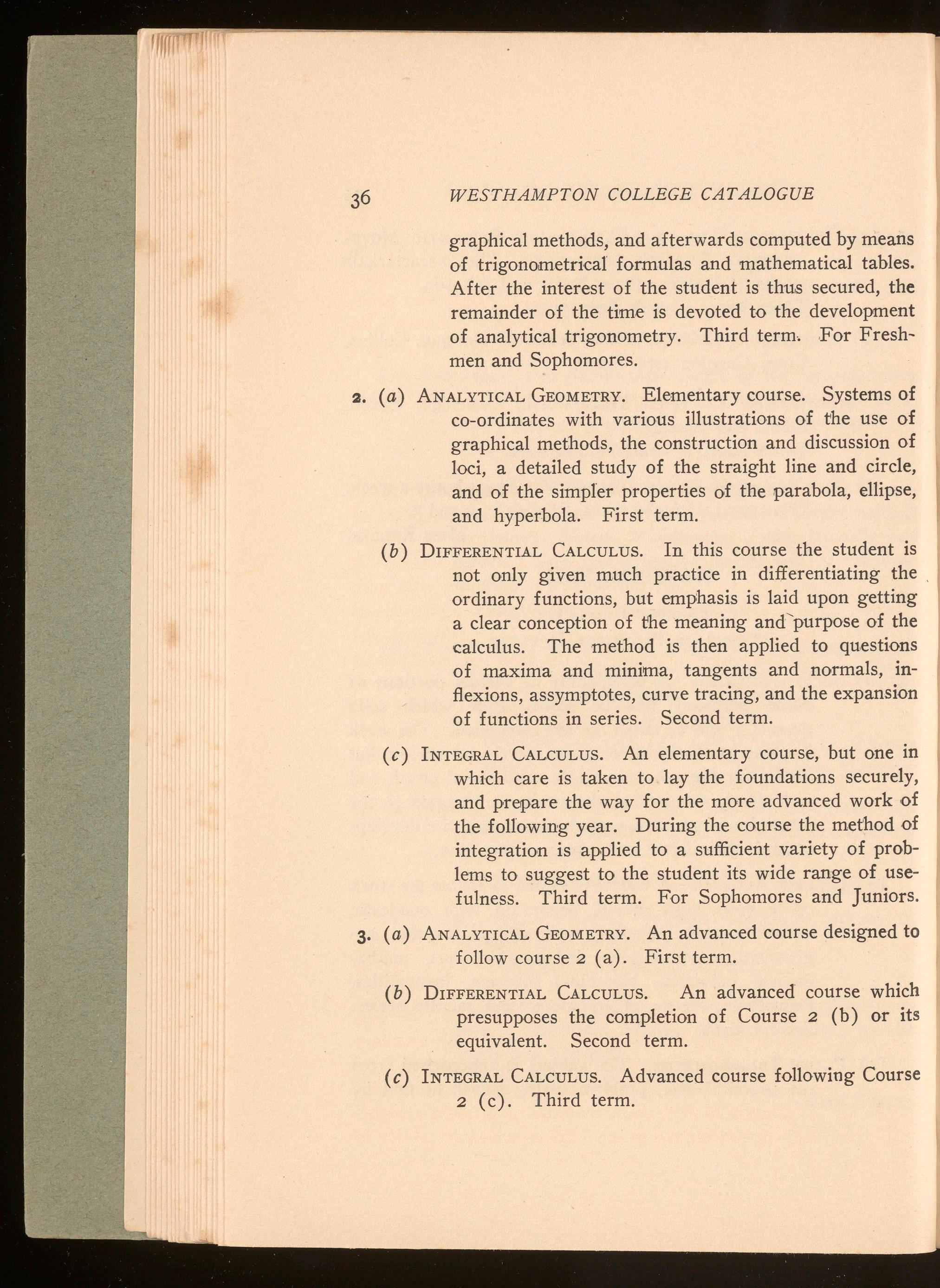
36 WESTHAMPTON COLLEGE CATALOGUE
graphical methods, and afterwards computed by means of trigonometrical formulas and mathematical tables. After the interest of the student is thus secured, the remainder of the time is devoted to the development of analytical trigonometry. Third term. For Freshmen and Sophomores.
2. (a) ANALYTICALGEOMETRY.Elementary course. Systems of co-ordinates with various illustrations of the use of graphical methods, the construction and discussion of loci, a detailed study of the straight line and circle, and of the simpler properties of the parabola, ellipse, and hyperbola. First term.
( b) DIFFERENTIALCALCULUS. In this course the student is not only given much practice in differentiating the . ordinary functions, but emphasis is laid upon getting a clear conception of the meaning and ' purpose of the calculus. The method is then applied to questions of maxima and minima, tangents and normals, inflexions, assymptotes, curve tracing, and the expansion of functions in series. Second term.
(c) INTEGRALCALCULUS. An elementary course, but one in which care is taken to lay the foundations securely, and prepare the way for the more advanced work of the following year. During the course the method of integration is applied to a sufficient variety of problems to suggest to the student its wide range of usefulness. Third term. For Sophomores and Juniors.
3. (a) ANALYTICALGEOMETRY.An advanced course designed to follow course 2 (a). First term.
( b) DIFFERENTIALCALCULUS. An advanced course which presupposes the completion of Course 2 (b) or its equivalent. Second term.
(c) INTEGRALCALCULUS.Advanced course following Course 2 ( c) . Third term.
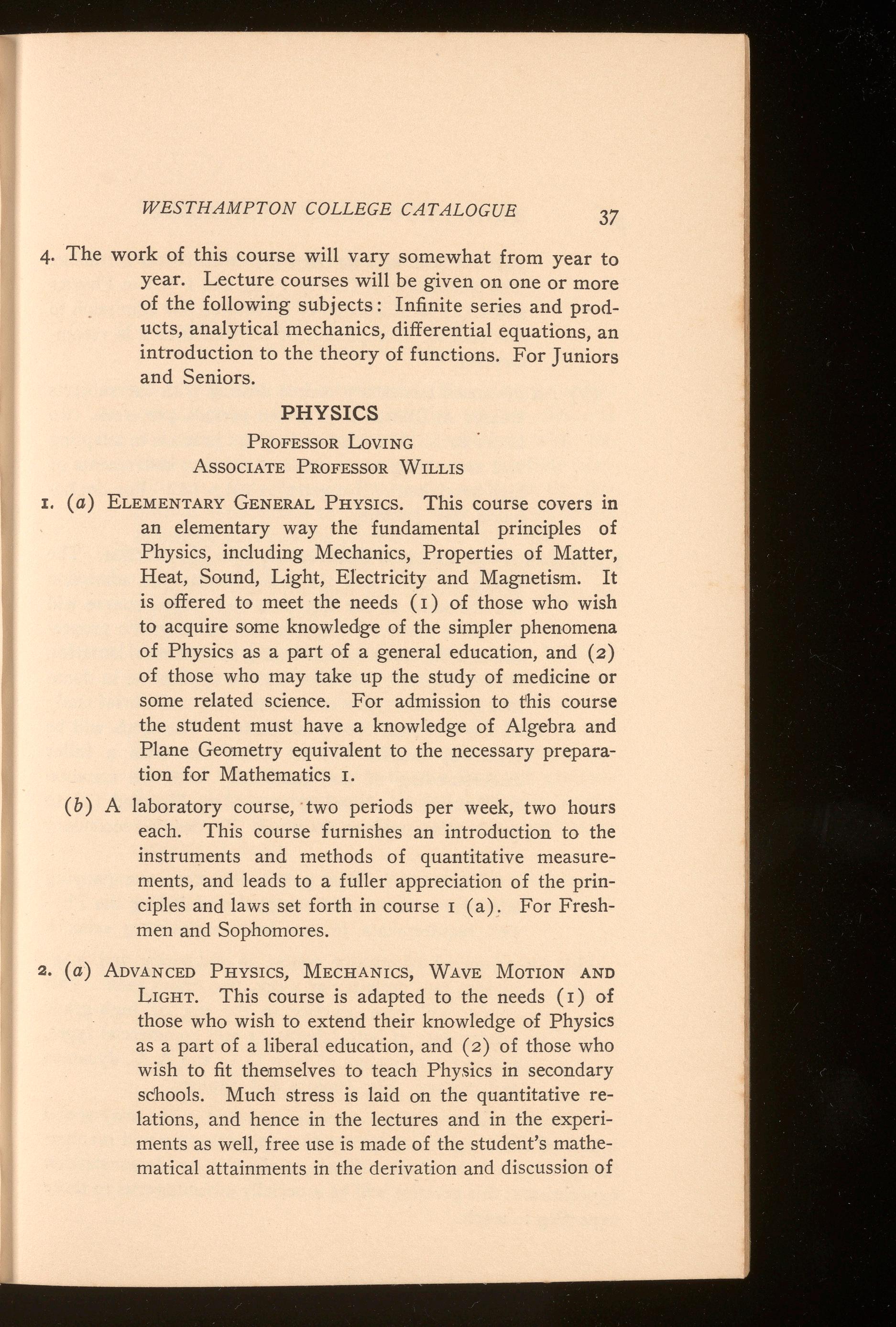
4. The work of this course will vary somewhat from year to year. Lecture courses will be given on one or more of the following subjects: Infinite series and products, analytical mechanics, differential equations, an introduction to the theory of functions. For Juniors and Seniors.
PHYSICS
PROFESSORLOVING
ASSOCIATEPROFESSORWILLIS
I. (a) ELEMENTARYGENERALPHYSICS. This course covers in an elementary way the fundamental principles of Physics, including Mechanics, Properties of Matter, Heat, Sound, Light, Electricity and Magnetism. It is offered to meet the needs (I) of those who wish to acquire some knowledge of the simpler phenomena of Physics as a part of a general education, and (2) of those who may take up the study of medicine or some related science. For admission to t'his course the student must have a knowledge of Algebra and Plane Geometry equivalent to the necessary preparation for Mathematics I.
( b) A laboratory course, ·two periods per week, two hours each. This course furnishes an introduction to the instruments and methods of quantitative measurements, and leads to a fuller appreciation of the principles and laws set forth in course I (a). For Freshmen and Sophomores.
2. (a) ADVANCEDPHYSICS, MECHANICS, WAVE MoTION AND LIGHT. This course is adapted to the needs (I) of those who wish to extend their knowledge of Physics as a part of a liberal education, and (2) of those who wish to fit themselves to teach Physics in secondary sc'hools. Much stress is laid on the quantitative relations, and hence in the lectures and in the experiments as well, free use is made of the student's mathematical attainments in the derivation and discussion of
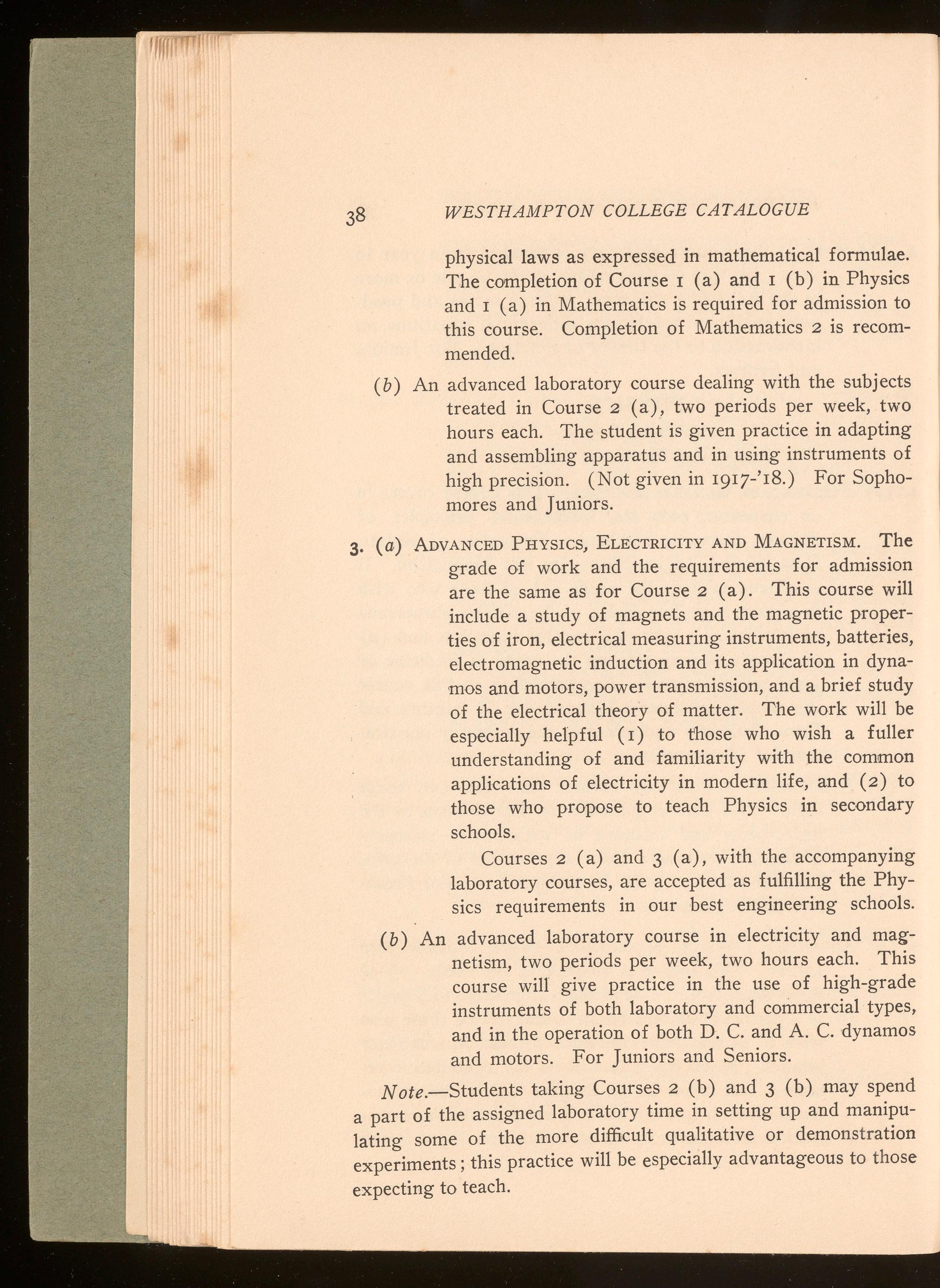
WESTHAMPTON COLLEGE CATALOGUE
physical laws as expressed in mathematical formulae. The completion of Course 1 (a) and 1 (b) in Physics and 1 (a) in Mathematics is required for admission to this course. Completion of Mathematics 2 is recommended.
( b) An advanced laboratory course dealing with the subjects treated in Course 2 (a), two periods per week, two hours each. The student is given practice in adapting and assembling apparatus and in using instruments of high precision. (Not given in 1917-'18.) For Sophomores and Juniors.
3. (a) ADVANCED PHYSICS, ELECTRICITY AND MAGNETISM. The grade of work and the requirements for admission are the same as for Course 2 (a) . This course will include a study of magnets and the magnetic properties of iron, electrical measuring instruments, batteries, electromagnetic induction and its application in dynamos and motors, power transmission, and a brief study of the electrical theory of matter. The work will be especially helpful ( r) to t'hose who wish a fuller understanding of and familiarity with the common applications of electricity in modern life, and ( 2) to those who propose to teach Physics in secondary schools.
Courses 2 (a) and 3 (a), with the accompanying laboratory courses, are accepted as fulfilling the Physics requirements in our best engineering schools.
( b) An advanced laboratory course in electricity and magnetism, two periods per week, two hours each. This course will give practice in the use of high-grade instruments of both laboratory and commercial types, and in the operation of both D. C. and A . C. dynamos and motors. For Juniors and Seniors.
Note.-Students taking Courses 2 (b) and 3 (b) may spend a part of the assigned laboratory time in setting up and manipulating some of the more difficult qualitative or demonstration experiments; this practice will be especially advantageous to those expecting to teach.
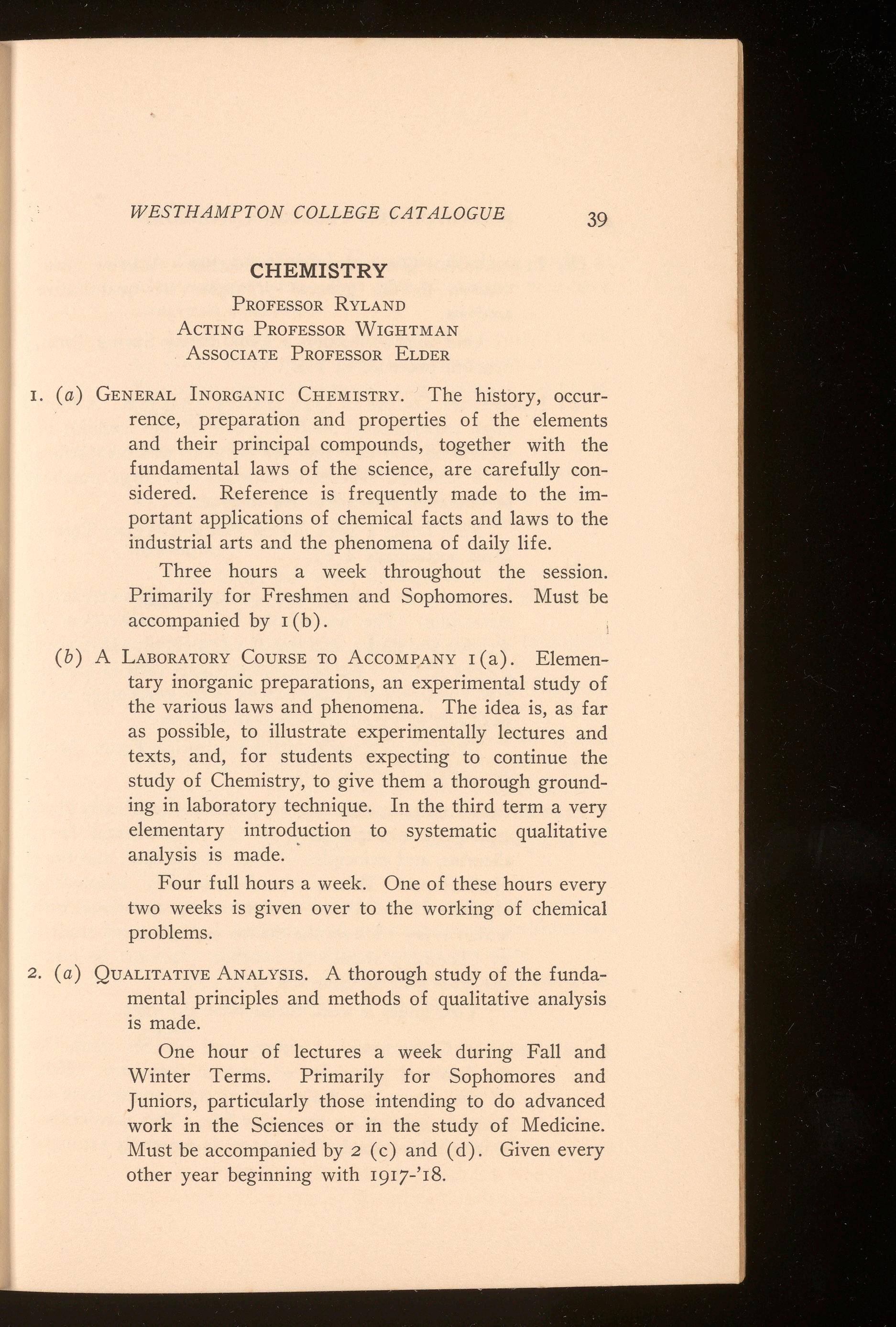
CHEMISTRY
PROFESSORRYLAND
ACTING PROFESSORWIGHTMAN
ASSOCIATEPROFESSORELDER
1. (a) GENERALINORGANICCHEMISTRY . The history, occurrence, preparation and properties of the elements and their principal compounds, together with the fundamental laws of the science, are carefully considered. Reference is frequently made to the important applications of chemical facts and laws to the industrial arts and the phenomena of daily life.
Three hours a week throughout the session. Primarily for Freshmen and Sophomores. Must be accompanied by I (b).
(b) A LABORATORYCouRSE TO AccoMPANY 1(a). Elementary inorganic preparations, an experimental study of the various laws and phenomena The idea is, as far as possible, to illustrate experimentally lectures and texts, and, for students expecting to continue the study of Chemistry, to give them a thorough grounding in laboratory technique. In the third term a very elementary introduction to systematic qualitative analysis is made. ·
Four full hours a week. One of these hours every two weeks is given over to the working of chemical problems .
2. (a) QuALITATIVEANALYSIS. A thorough study of the fundamental principles and methods of qualitative analysis is made.
One hour of lectures a week during Fall and Winter Terms. Primarily for Sophomores and Juniors, particularly those intending to do advanced work in the Sciences or in the study of Medicine . Must be accompanied by 2 ( c) and ( d) . Given every other year beginning with 1917-'18.
(
(b) ELEMENTARYQUANTITATIVEANALYSIS. A brief introduction to the general principles of quantitative analysis.
One hour of lectures a week during Spring Term. Must be preceded by z(a).
(c) LABORATORYCouRSE IN QUALITATIVEANALYSIS. A thorough experimental study is made of the methods of separating and detecting the elements and compounds by a standard scheme of anaylsis. A large number of unknown substances are analyzed.
Four hours a week during Fall and Winter Terms. Must accompany z(a).
d) AN ELEMENTARYLABORATORYCOURSEIN QUANTITATIVE ANALYSIS. The use of the balance, calibration of weights and flasks, analysis of a few simple substances, a brief study of the principal methods used in quantitative analysis, and calculations of the percentage compositions of various substances analyzed.
Four hours a week during the Spring Term. Must accompany Course z ( b) .
3. ELEMENTARYPHYSICALCHEMISTRY.Lectures, profusely illustrated by experiments, on the fundamental laws, theories, and principles of chemical science, and their applications. This course is especially adapted to students of Medicine, and takes up questions with which every wide-awake doctor and advanced student of Chemistry should be familiar. It must be taken the same year ·as Course z.
Two hours a week throughout the year.
4. (a) ORGANICCHEMISTRY. Lectures and quizzes upon the fundamental principles of organic chemistry. Most of the substances dealt with in this course have an intimate bearing on every-day life. This relationship is carefully studied. The course is especially arranged
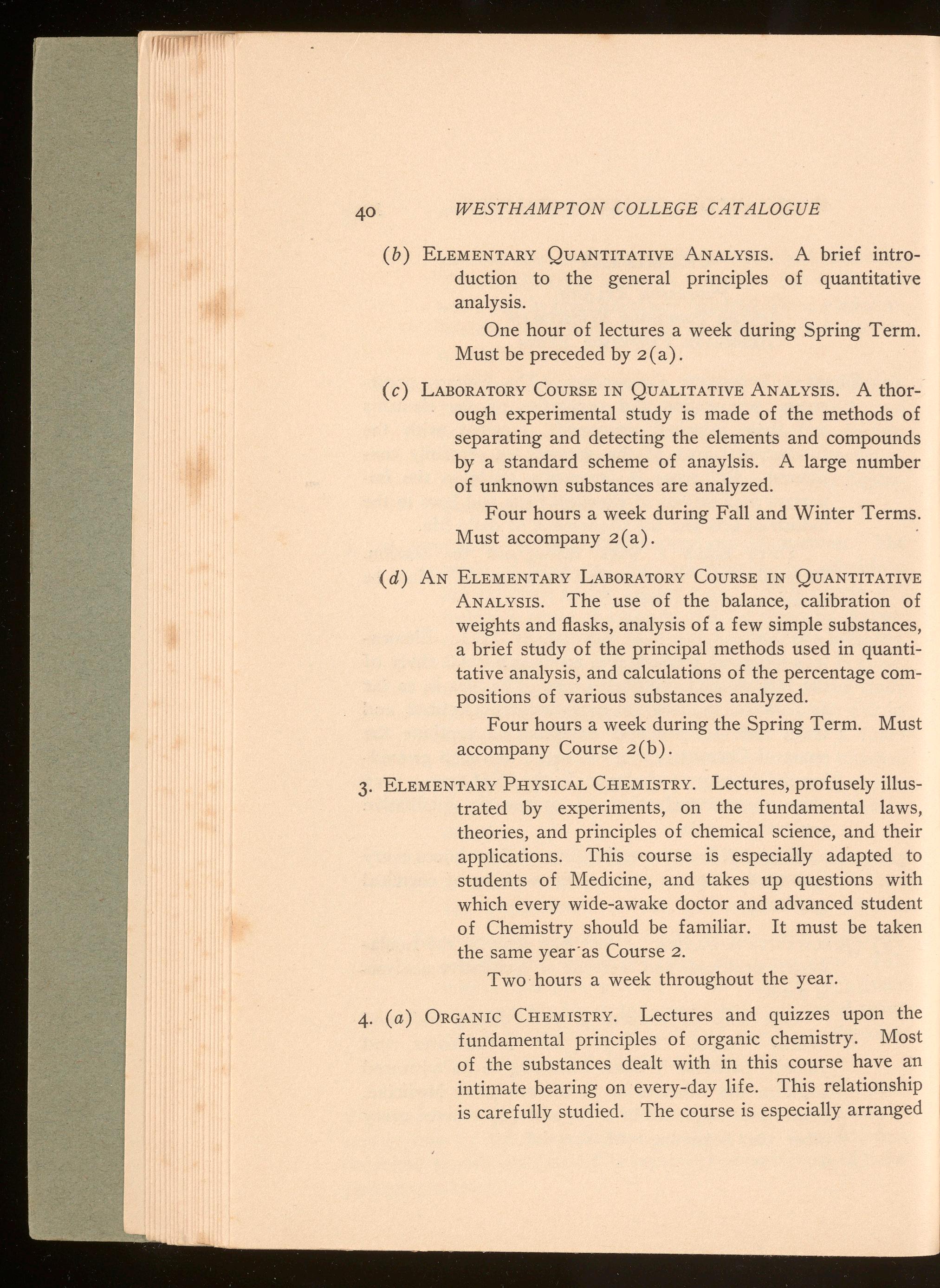
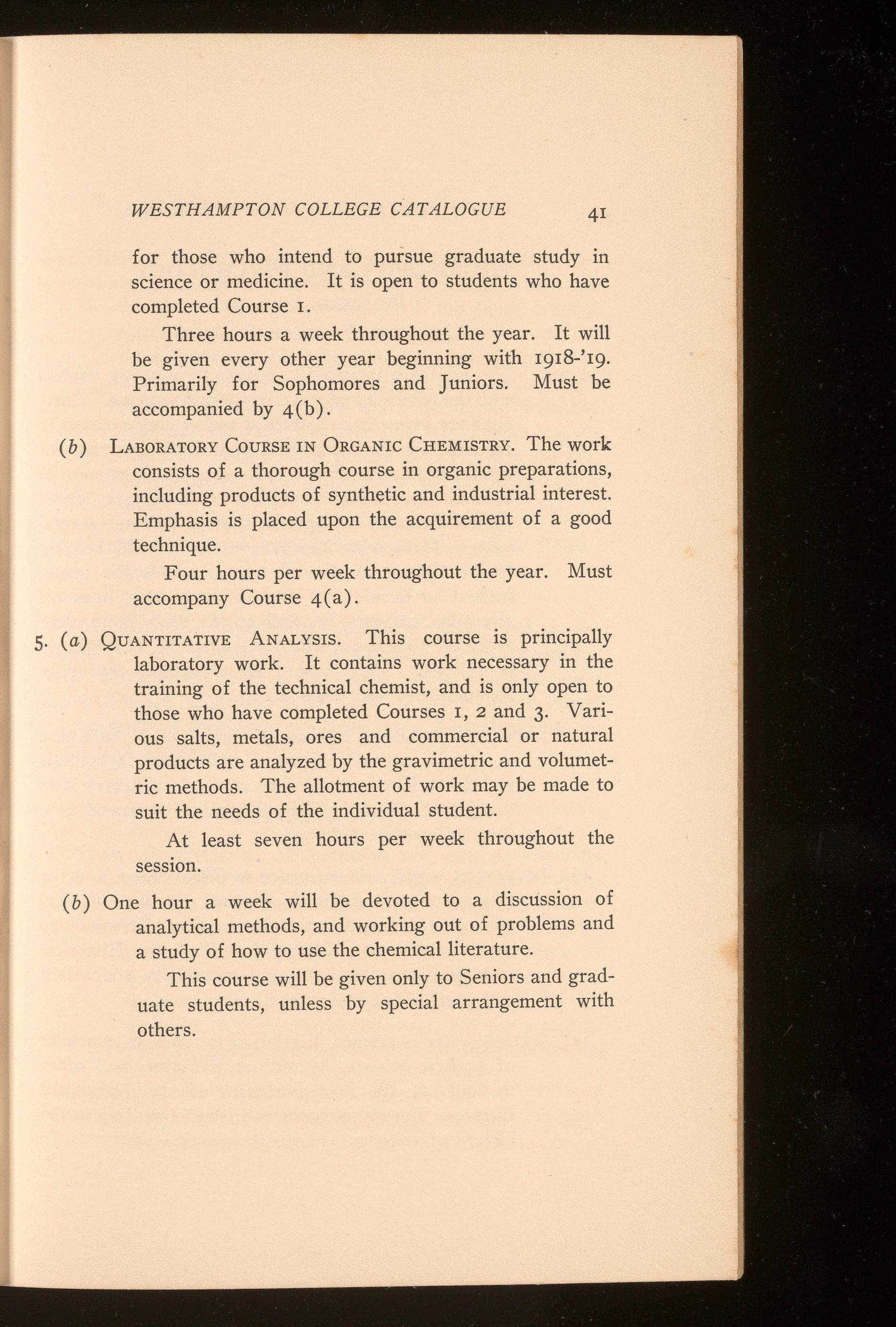
for those who intend to pursue graduate study in science or medicine. It is open to students who have completed Course I.
Three hours a week throughout the year. It will be given every other year beginning with 1918-'19. Primarily for Sophomores and Juniors. Must be accompanied by 4(b).
(b) LABORATORYCouRSEIN ORGANICCHEMISTRY.The work consists of a thorough course in organic preparations, including products of synthetic and industrial interest. Emphasis is placed upon the acquirement of a good technique.
Four hours per week throughout the year. Must accompany Course 4(a).
5. (a) QUANTITATIVEANALYSIS. This course is principally laboratory work. It contains work necessary in the training of the technical chemist, and is only open to those who have completed Courses 1, 2 and 3. Various salts, metals, ores and commercial or natural products are analyzed by the gravimetric and volumetric methods. The allotment of work may be made to suit the needs of the individual student.
At least seven hours per week throughout the session.
( b) One hour a week will be devoted to a discussion of analytical methods, and working out of problems and a study of how to use the chemical literature.
This course will be given only to Seniors and graduate students, unless by special arrangement with others.
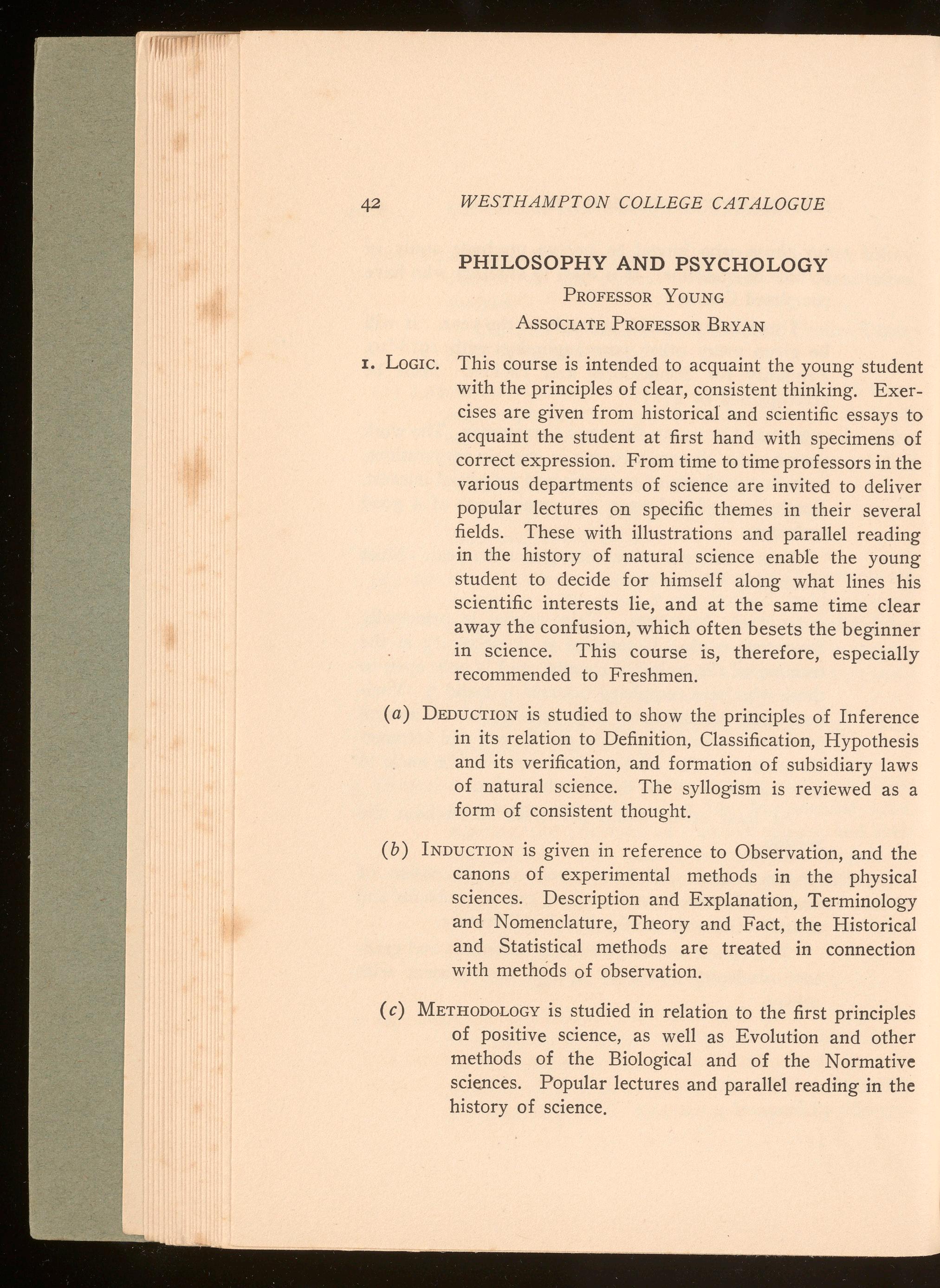
PHILOSOPHY AND PSYCHOLOGY
PROFESSORYOUNG
ASSOCIATEPROFESSORBRYAN
1. LOGIC. This course is intended to acquaint the young student with the principles of clear, consistent thinking. Exercises are given from historical and scientific essays to acquaint the student at first hand with specimens of correct expression. From time to time professors in the various departments of science are invited to deliver popular lectures on specific themes in their several fields. These with illustrations and parallel reading in the history of natural science enable the young student to decide for himself along what lines his scientific interests lie, and at the same time clear away the confusion, which often besets the beginner in science. This course is, therefore, especially recommended to Freshmen.
(a) DEDUCTIONis studied to show the principles of Inference in its relation to Definition, Classification, Hypothesis and its verification, and formation of subsidiary laws of natural science The syllogism is reviewed as a form of consistent thought.
( b) INDUCTIONis given in reference to Observation, and the canons of experimental methods in the physical sciences. Description and Explanation, Terminology and Nomenclature, Theory and Fact, the Historical and Statistical methods are treated in connection with methods of observation.
( c) METHODOLOGY is studied in relation to the first principles of positive science, as well as Evolution and other methods of the Biological and of the Normative sciences. Popular lectures and parallel reading in the history of science.
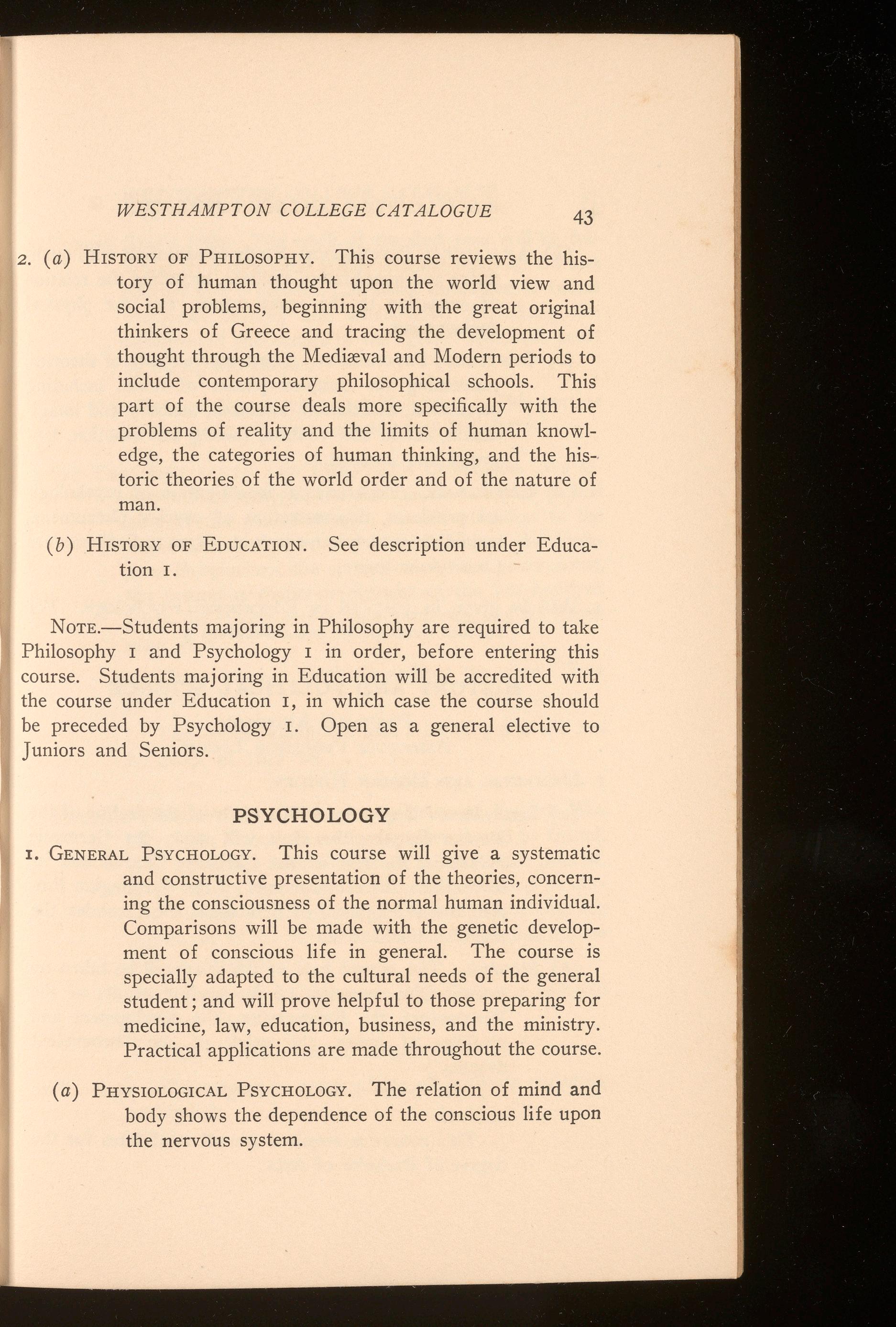
WESTHAMPTON COLLEGE CATALOGUE
2. (a) HISTORYOF PHILOSOPHY. This course reviews the history of human thought upon the world view and social problems, beginning with the great original thinkers of Greece and tracing the development of thought through the Medireval and Modern periods to include contemporary philosophical schools. This part of the course deals more specifically with the problems of reality and the limits of human knowledge, the categories of human thinking, and the historic theories of the world order and of the nature of man.
( b) HISTORYOF EDUCATION. See description under Education I.
NoTE.-Students majoring in Philosophy are required to take Philosophy I and Psychology I in order, before entering this course. Students majoring in Education will be accredited with the course under Education I, in which case the course should be preceded by Psychology I. Open as a general elective to Juniors and Seniors.
PSYCHOLOGY
I. GENERALPSYCHOLOGY.This course will give a systematic and constructive presentation of the theories, concerning the consciousness of the normal human individual. Comparisons will be made with the genetic development of conscious life in general. The course is specially adapted to the cultural needs of the general student; and will prove helpful to those preparing for medicine, law, education, business, and the ministry. Practical applications are made throughout the course.
(a) PHYSIOLOGICALPSYCHOLOGY.The relation of mind and body shows the dependence of the conscious life upon the nervous system.
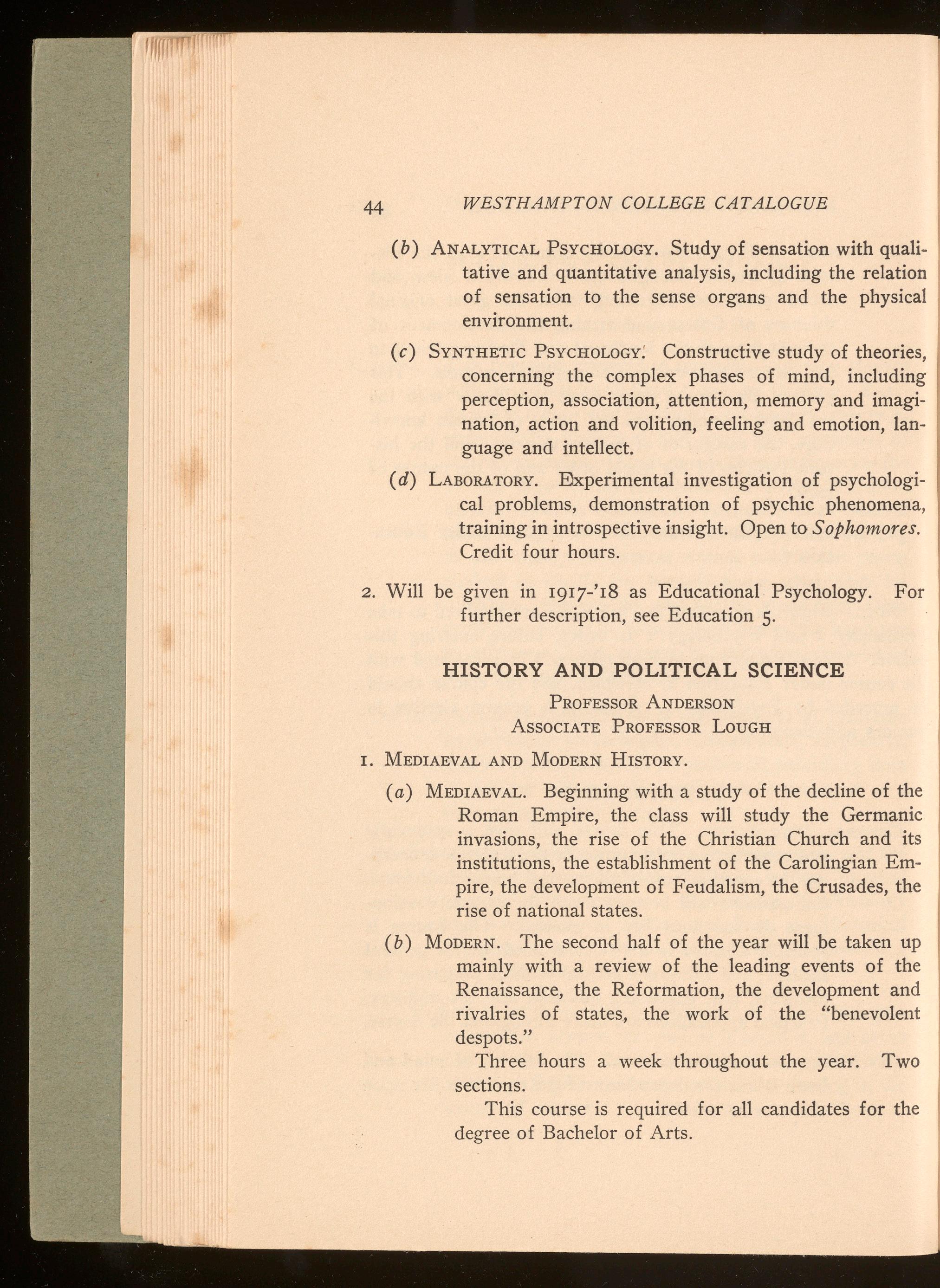
(b) ANALYTICALPSYCHOLOGY.Study of sensation with qualitative and quantitative analysis, including the relation of sensation to the sense organs and the physical environment.
( c) SYNTHETICPSYCHOLOGY:Constructive study of theories, concerning the complex phases of mind, including perception, association, attention, memory and imagination, action and volition, feeling and emotion, language and intellect.
( d) LABORATORY.Experimental investigation of psychological problems, demonstration of psychic phenomena , training in introspective insight. Open to Sophomores. Credit four hours.
2. Will be given in 1917-'18 as Educational Psychology. For further description, see Education 5.
HISTORY AND POLITICAL SCIENCE
PROFESSORANDERSON ASSOCIATEPROFESSORLOUGH
I. MEDIAEVALANDMODERNHISTORY.
(a) MEDIAEVAL.Beginning with a study of the decline of the Roman Empire, the class will study the Germanic invasions, the rise of the Christian Church and its institutions, the establishment of the Carolingian Empire, the development of Feudalism, the Crusades, the rise of national states.
( b) MODERN. The second half of the year will be taken up mainly with a review of the leading events of the Renaissance, the Reformation, the development and rivalries of states, the work of the "benevolent despots."
Three hours a week throughout the year. Two sections.
This course is required for all candidates for the degree of Bachelor of Arts.
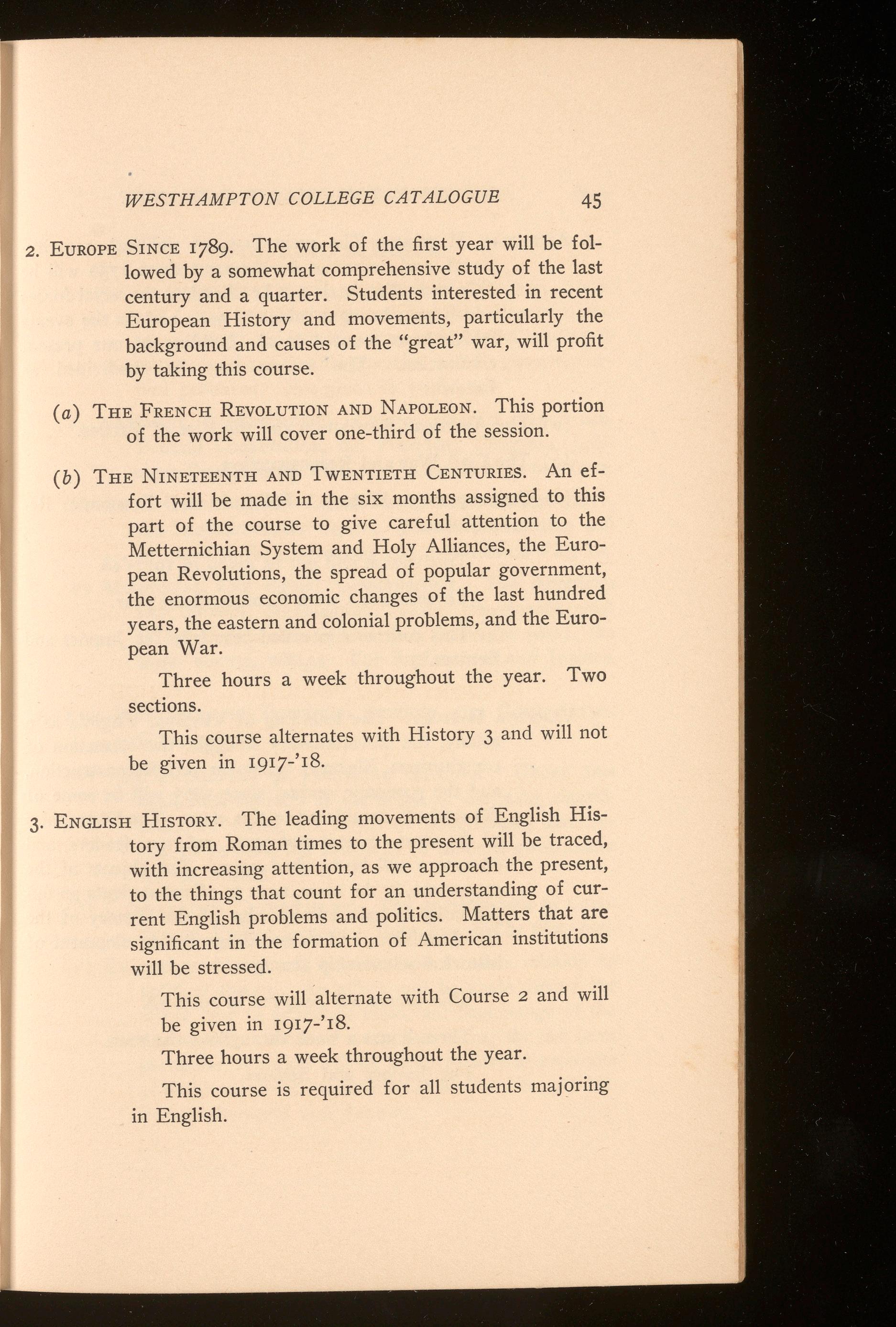
WESTHAMPTON COLLEGE CAT
ALOGUB
2. EUROPESINCE 1789. The work of the first year will be followed by a somewhat comprehensive study of the last century and a quarter. Students interested in recent European History and movements, particularly the background and causes of the "great" war, will profit by taking this course.
(a) THE FRENCHREVOLUTIONANDNAPOLEON.This portion of the work will cover one-third of the session.
(b) THE NINETEENTHANDTWENTIETHCENTURIES. An effort will be made in the six months assigned to this part of the course to give careful attention to the Metternichian System and Holy Alliances, the European Revolutions, the spread of popular government, the enormous economic changes of the last hundred years, the eastern and colonial problems, and the European War.
Three hours a week throughout the year. Two sections.
This course alternates with History 3 and will not be given in 1917-'18.
3. ENGLISH HISTORY. The leading movements of English History from Roman times to the present will be traced, with increasing attention, as we approach the present, to the things that count for an understanding of current English problems and politics. Matters that are significant in the formation of American institutions will be stressed.
This course will alternate with Course 2 and will be given in 1917-'18.
Three hours a week throughout the year. This course is required for all students majoring in English.
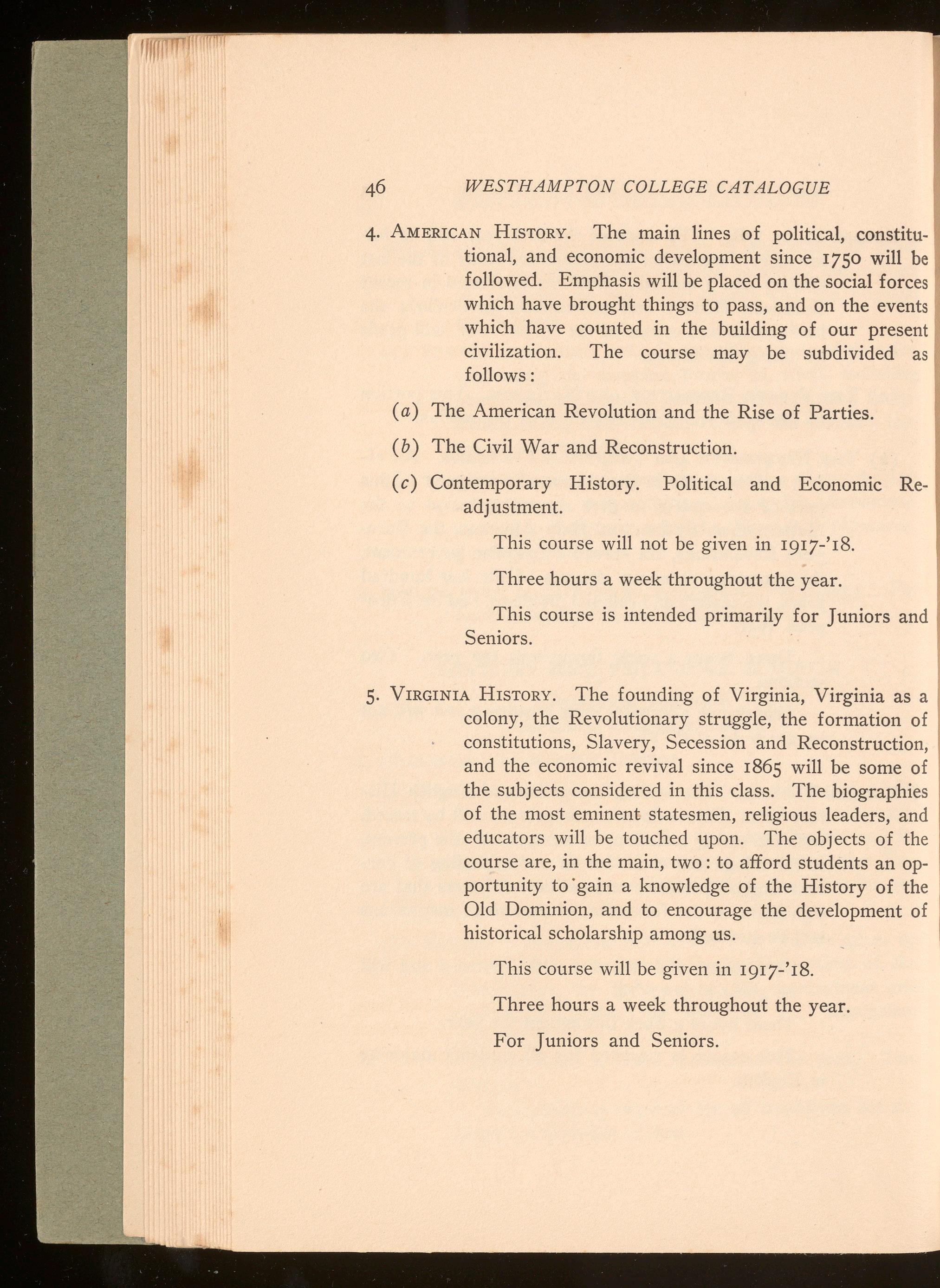
4. AMERICANHISTORY. The main lines of political, constitutional, and economic development since 1750 will be followed. Emphasis will be placed on the social forces which have brought things to pass, and on the events which have counted in the building of our present civilization. The course may be subdivided as follows:
(a) The American Revolution and the Rise of Parties.
( b) The Civil War and Reconstruction.
(c) Contemporary History. Political and Economic R eadjustment.
This course will not be given in 1917-'18.
Three hours a week throughout the year.
This course is intended primarily for Juniors and Seniors.
5. VIRGINIAHISTORY . The founding of Virginia, Virginia as a colony, the Revolutionary struggle, the formation o f constitutions, Slavery, Secession and Reconstruction , and the economic revival since 1865 will be some o f the subjects considered in this class The biographie s of the most eminent statesmen, religious leaders, an d educators will be touched upon. The objects of th e course are, in the main, two : to afford students an opportunity to ·gain a knowledge of the History of th e Old Dominion, and to encourage the development of historical scholarship among us
This course will be given in 1917-'18.
Three hours a week throughout the year.
For Juniors and Seniors.
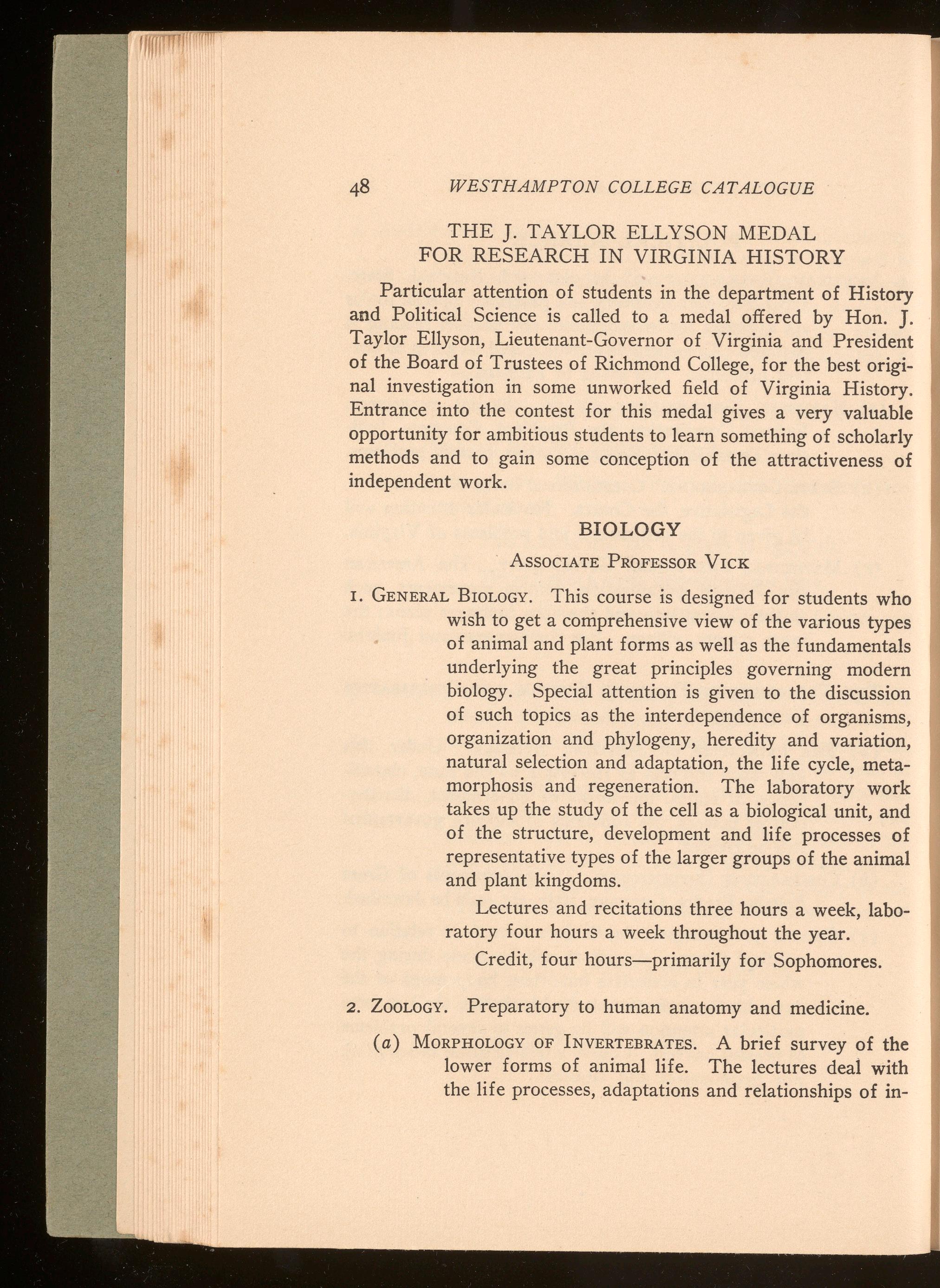
48 WESTHAMPTON COLLEGE CATALOGUE
THE J. TAYLOR ELLYSON MEDAL FOR RESEARCH IN VIRGINIA HISTORY
Particular attention of students in the department of History and Political Science is called to a medal offered by Hon. J. Taylor Ellyson, Lieutenant-Governor of Virginia and President of the Board of Trustees of Richmond College, for the best original investigation in some unworked field of Virginia History . Entrance into the contest for this medal gives a very valuable opportunity for ambitious students to learn something of scholarly methods and to gain some conception of the attractiveness of independent work.
BIOLOGY
ASSOCIATEPROFESSORVICK
I. GENERALBIOLOGY This course is designed for students who wish to get a comprehensive view of the various types of animal and plant forms as well as the fundamentals underlying the great principles governing modern biology. Special attention is given to the discussion of such topics as the interdependence of organisms, organization and phylogeny, heredity and variation, natural selection and adaptation, the life cycle, metamorphosis and regeneration. The laboratory work takes up the study of the cell as a biological unit, and of the structure, development and life processes of representative types of the larger groups of the animal and plant kingdoms.
Lectures and recitations three hours a week, laboratory four hours a week throughout the year.
Credit, four hours-primarily for Sophomores.
2. ZooLOGY . Preparatory to human anatomy and medicine.
(a) MORPHOLOGYOF INVERTEBRATES. A brief survey of the lower forms of animal life. The lectures deal with the life processes, adaptations and relationships of in-
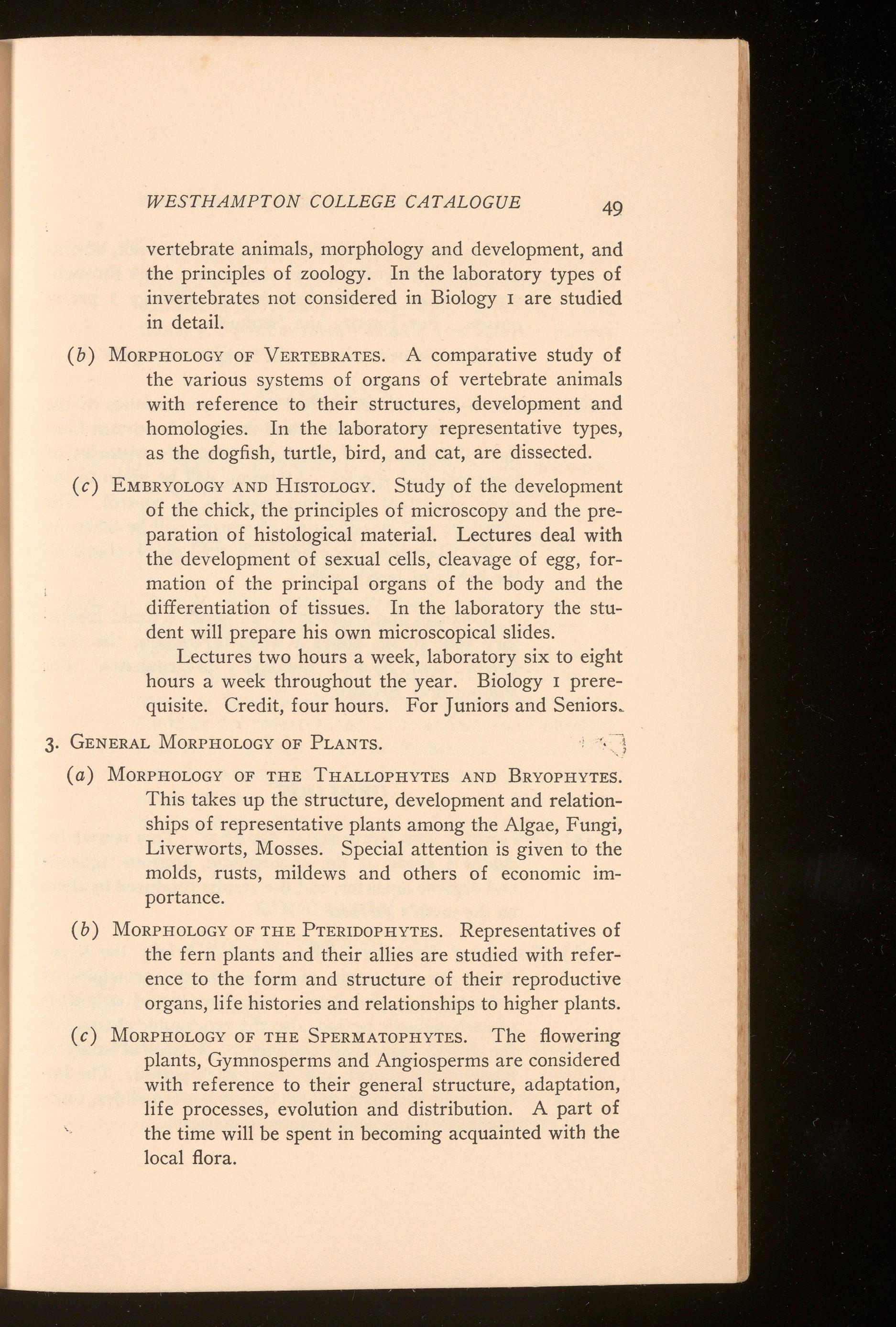
WESTHAMPTON COLLEGE CATALOGUE 49
vertebrate animals, morphology and development, and the principles of zoology. In the laboratory types of invertebrates not considered in Biology I are studied in detail.
(b) MORPHOLOGYOF VERTEBRATES.A comparative study of the various systems of organs of vertebrate animals with reference to their structures, development and homologies. In the laboratory representative types, as the dogfish, turtle, bird, and cat, are dissected.
( c) EMBRYOLOGYAND HISTOLOGY. Study of the development of the chick, the principles of microscopy and the preparation of histological material. Lectures deal with the development of sexual cells, cleavage of egg, formation of the principal organs of the body and the differentiation of tissues. In the laboratory the student will prepare his own microscopical slides. Lectures two hours a week, laboratory six to eight hours a week throughout the year. Biology I prerequisite. Credit, four hours. For Juniors and Seniors.
3. GENERALMORPHOLOGYOF PLANTS.
(a) MORPHOLOGYOF THE THALLOPHYTESAND BRYOPHYTES. This takes up the structure, development and relationships of representative plants among the Algae, Fungi, Liverworts, Mosses. Special attention is given to the molds, rusts, mildews and others of economic importance.
( b) MORPHOLOGYOF THE PTERIDOPHYTES.Representatives of the fern plants and their allies are studied with reference to the form and structure of their reproductive organs, life histories and relationships to higher plants.
( c) MORPHOLOGYOF THE SPERMATOPHYTES.The flowering plants, Gymnosperms and Angiosperms are considered with reference to their general structure, adaptation, life processes, evolution and distribution. A part of the time will be spent in becoming acquainted with the local flora.
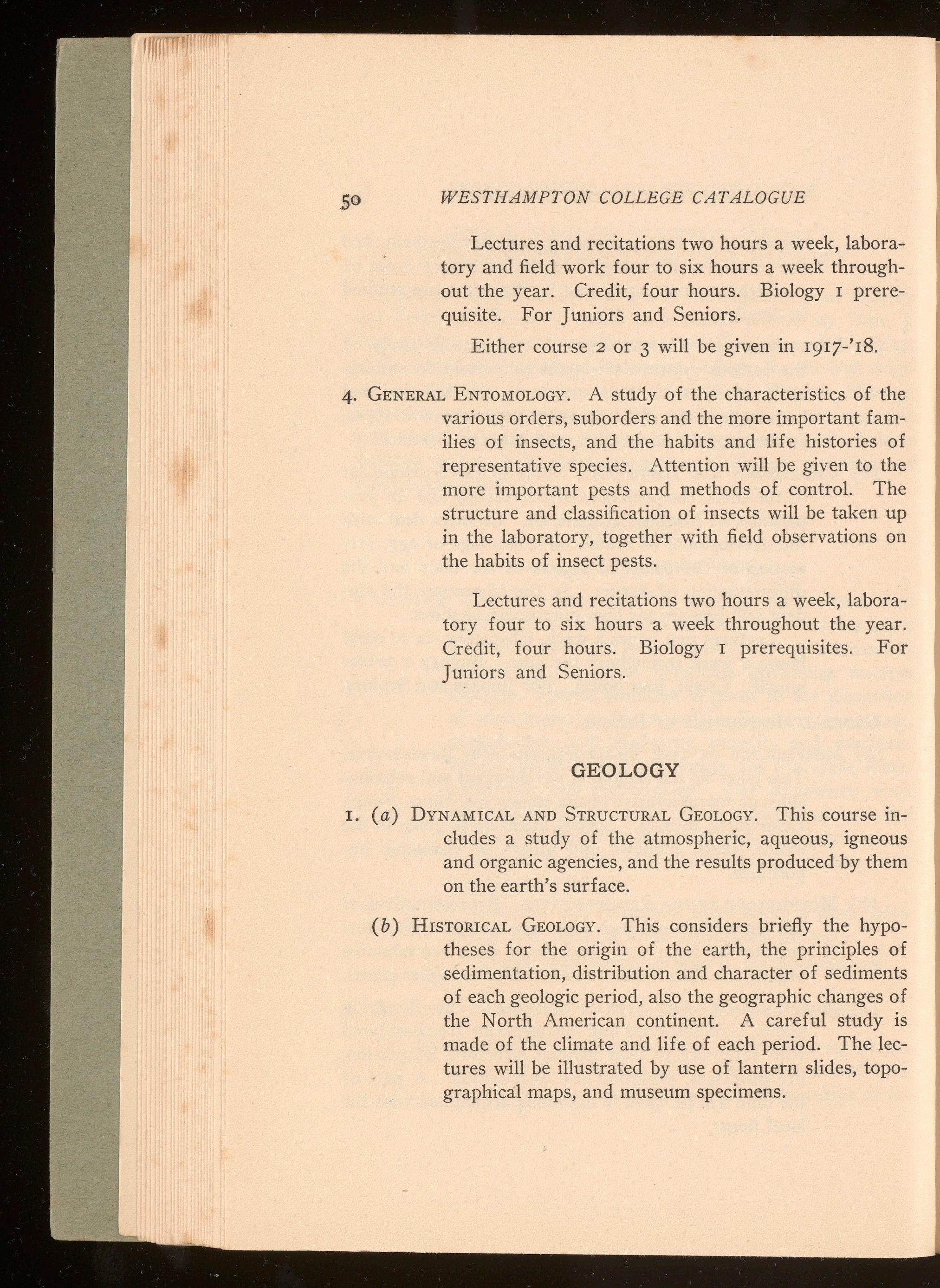
50 WESTHAMPTON COLLEGE CATALOGUE
Lectures and recitations two hours a week, laboratory and field work four to six hours a week throughout the year. Credit, four hours. Biology I prerequisite . For Juniors and Seniors.
Either course 2 or 3 will be given in 1917-'18 .
4. GENERALENTOMOLOGY . A study of the characteristics of the various orders, suborders and the more important families of insects, and the habits and life histories of representative species . Attention will be given to the more important pests and methods of control. The structure and classification of insects will be taken up in the laboratory, together with field observations on the habits of insect pests.
Lectures and recitations two hours a week, laboratory four to six hours a week throughout the year . Credit, four hours. Biology I prerequisites. For Juniors and Seniors.
GEOLOGY
I. (a) DYNAMICALAND STRUCTURALGEOLOGY.This course includes a study of the atmospheric, aqueous, igneous and organic agencies, and the results produced by them on the earth's surface.
( b) HISTORICALGEOLOGY. This considers briefly the hypotheses for the origin of the earth, the principles of sedimentation, distribution and character of sediments of each geologic period, also the geographic changes of the North American continent. A careful study is made of the climate and life of each period. The lectures will be illustrated by use of lantern slides, topographical maps, and museum specimens.
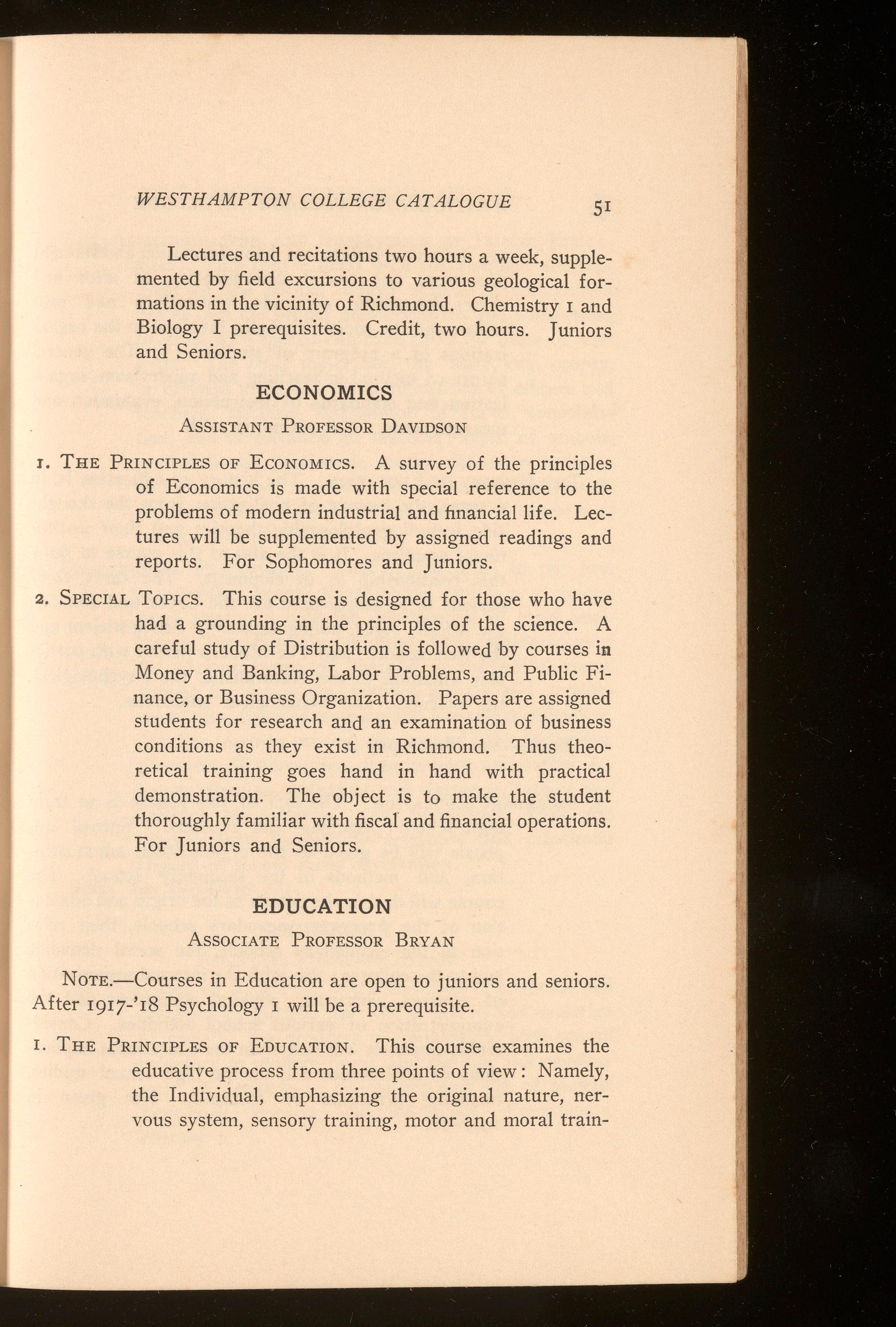
Lectures and recitations two hours a week, supplemented by field excursions to various geological formations in the vicinity of Richmond . Chemistry I and Biology I prerequisites. Credit, two hours. Juniors and Seniors.
ECONOMICS
ASSISTANTPROFESSORDAVIDSON
r. THE PRINCIPLESOF EcoNOMICS. A survey of the principles of Eoonomics is made with special reference to the problems of modern industrial and financial life Lectures will be supplemented by assigned readings and reports . For Sophomores and Juniors.
2 . SPECIALToP1cs. This course is designed for those who have had a grounding in the principles of the science. A careful study of Distribution is followed by courses in Money and Banking, Labor Problems, and Public Finance, or Business Organization. Papers are assigned students for research and an examination of business conditions as they exist in Richmond. Thus theoretical training goes hand in hand with practical demonstration The object is to make the student thoroughly familiar with fiscal and financial operations . For Juniors and Seniors.
EDUCATION
ASSOCIATEPROFESSORBRYAN
NoTE.-Courses in Education are open to juniors and seniors A fter 1917-'18 Psychology I will be a prerequisite .
I. THE PRINCIPLESOF EDUCATION. This course examines the educative process from three points of view: Namely, the Individual, emphasizing the original nature, nervous system, sensory training, motor and moral train-
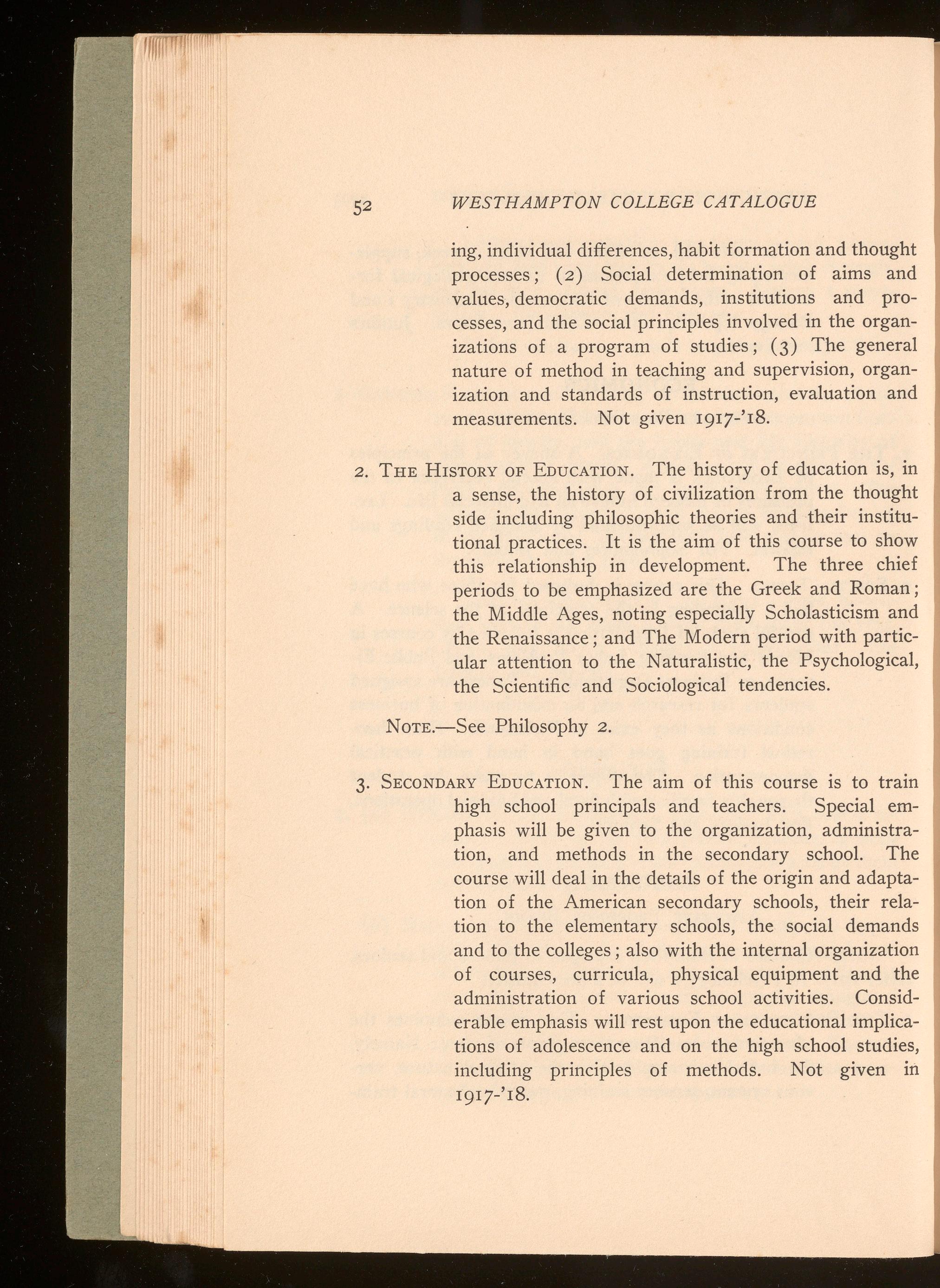
WESTHAMPTON COLLEGE CATALOGUE
ing, individual differences, habit formation and thought processes ; ( 2) Social determination of aims and values, democratic demands, institutions and processes, and the social principles involved in the organizations of a program of studies; (3) The general nature of method in teaching and supervision, organization and standards of instruction, evaluation and measurements. Not given 1917-'18.
2. THE HISTORYOF EDUCATION.The
history of education is, in a sense, the history of civilization from the thought side including philosophic theories and their institutional practices It is the aim of this course to show this relationship in development. The three chief periods to be emphasized are the Greek and Roman; the Middle Ages, noting especially Scholasticism and the Renaissance; and The Modern period with particular attention to the Naturalistic, the Psychological , the Scientific and Sociological tendencies.
N OTE.-See Philosophy 2.
3. SECONDARYEDUCATION
The aim of this course is to train high school principals and teachers. Special emphasis will be given to the organization, administration, and methods in the secondary school. The course will deal in the details of the origin and adaptation of the American secondary schools, their relation to the elementary schools, the social demands and to the colleges ; also with the internal organization of courses, curricula, physical equipment and the administration of various school activities. Considerable emphasis will rest upon the educational implications of adolescence and on the high school studies, including principles of methods. Not given in 1917-'18 .
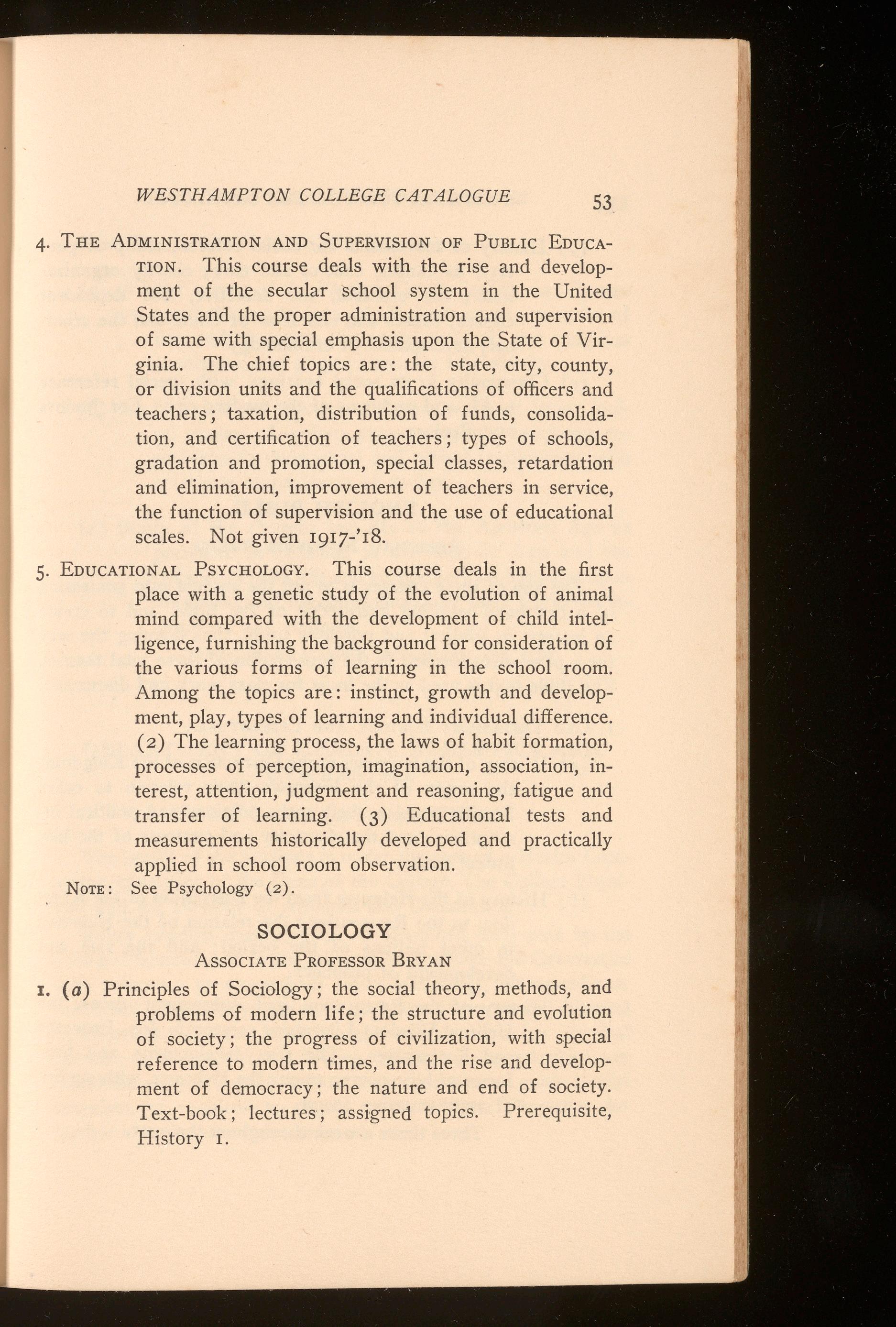
4. THE ADMINISTRATIONAND SUPERVISIONOF PUBLIC EDUCATION. This course deals with the rise and development of the secular school system in the United States and the proper administration and supervision of same with special emphasis upon the State of Virg1ma. The chief topics are: the state, city, county, or division units and the qualifications of officers and teachers; taxation, distribution of funds, consolidation, and certification of teachers ; types of schools, gradation and promotion, special classes, retardation and elimination, improvement of teachers in service, the function of supervision and the use of educational scales. Not given 1917-'18.
5. EoucATIONAL PSYCHOLOGY.This course deals in the first place with a genetic study of the evolution of animal mind compared with the development of child intelligence, furnishing the background for consideration of the various forms of learning in the school room. Among the topics are : instinct, growth and development, play, types of learning and individual difference. ( 2) The learning process, the laws of habit formation, processes of perception, imagination, association, interest, attention, judgment and reasoning, fatigue and transfer of learning. (3) Educational tests and measurements historically developed and practically applied in school room observation.
NoTE: See Psychology (2).
SOCIOLOGY
ASSOCIATEPROFESSORBRYAN
I. (a) Principles of Sociology; the social theory, methods, and problems of modern life; the structure and evolution of society; the progress of civilization, with special reference to modern times, and the rise and development of democracy; the nature and end of society. Text-book; lectures; assigned topics. Prerequisite, History I.
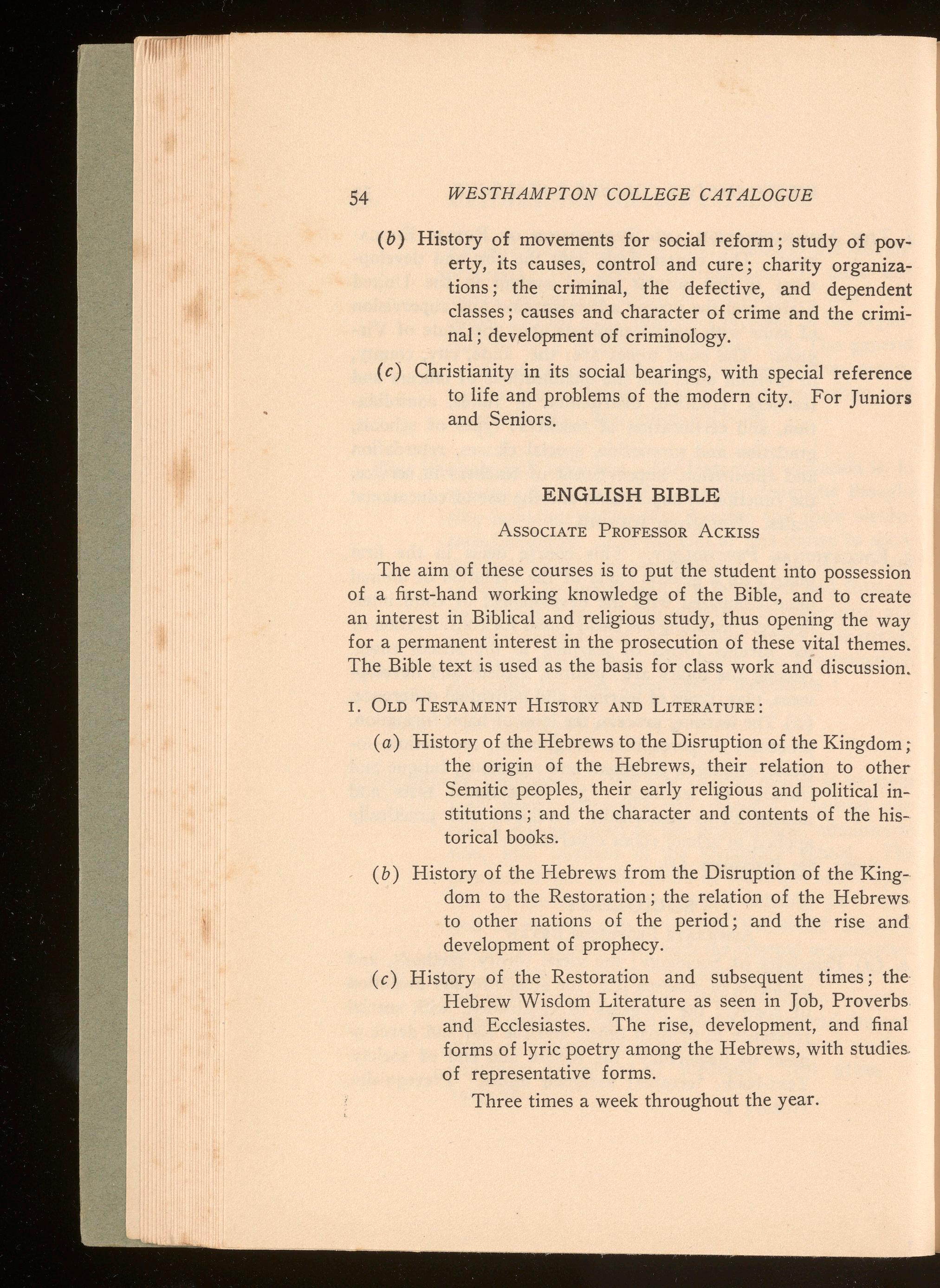
54 WESTHAMPTON COLLEGE CATALOGUE
(
b) History of movements for social reform; study of poverty, its causes, control and cure; charity organizations; the criminal, the defective, and dependent classes; causes and character of crime and the criminal; development of criminology.
( c) Christianity in its social bearings, with special reference to life and problems of the modern city. For Juniors and Seniors.
ENGLISH BIBLE
ASSOCIATE PROFESSOR ACKISS
The aim of these courses is to put the student into possession of a first-hand working knowledge of the Bible, and to create an interest in Biblical and religious study, thus opening the way for a permanent interest in the prosecution of these vital themes. The Bible text is used as the basis for class work and discussion.
I. OLD TESTAMENT HISTORY AND LITERATURE:
(a) History of the Hebrews to the Disruption of the Kingdom; the origin of the Hebrews, their relation to other Semitic peoples, their early religious and political institutions ; and the character and contents of the historical books.
( b) History of the Hebrews from the Disruption of the Kingdom to the Restoration; the relation of the Hebrews to other nations of the period; and the rise and development of prophecy.
( c) History of the Restoration and subsequent times; the · Hebrew Wisdom Literature as seen in Job, Proverbs and Ecclesiastes. The rise, development, and final forms of lyric poetry among the Hebrews, with studies. of representative forms.
Three times a week throughout the year.

2. NEW TESTAMENT HISTORY AND LITERATURE:
(a) A brief survey of the Persian, Greek, Jewish, and Roman ages ; the world into which Jesus came; currents of life and thought; the social, ethical, and religious conditions, and preparations for Christianity.
( b) An historical and synoptic study of the life of Jesus; topical studies of various phases of Jesus' teachings, together with their social and ethical implications with reference to problems of to-day.
(
c) Study of the thought and life of the Apostolic Age as presented or reflected in the book of Acts and the - Epistles; Paul's life and letters, and his influence upon his times ; and the development of early Christian institutions and customs.
Three times a week throughout the year.
DEPARTMENT OF HEALTH. ATHLETICS AND GYMNASTICS
FANNY GRAVES CRENSHAW, Director
The health of the students is under the care of a -Health Committee, consisting of the Dean of the College, The College Physician and the Director of Athletics and Gymnastics.
Every resident student must be examined each year by the College Physician and by the Director of Athletics and Gymnastics with reference to strength of heart and lungs, orthopoedic or functional defects or weaknesses, and general health and physical development. On the basis of such examinations her physical exercise is assigned her. Where defects or irregularities are found the student is requested to see a specialist, or given special exercises, or required to return to the College Physician for further examination and treatment.
56 WESTHAMPTON COLLEGE CATALOGUE
Every resident student who is not excused by the College Physician is required to take four periods of exercise a week. From December first till May first two of these periods each week must be taken under the supervision of the Director of Athletics. Students may take part during the year in the following forms of exercise organized by the Athletic Association under the Director: in the autumn, tennis and hockey; in the winter, gymnastics, folk dancing, and athletic games; in the spring, basket.ball, track athletics and tennis. In addition, cross-country walks are organized at intervals, and in the autumn and spring the students enjoy the use of boats on the lake.
All resident students are members of the Athletic Association. Non-resident students may take part in the athletic activities by joining the Association and taking the medical and physical examination required of resident students. Every student while exercising in the gymnasium should wear a regulation suit consisting of white middy and bloomers of her class color.
THE DEPARTMENT OF ENGLISH SPEECH
Miss EMILY FREEMANBROWN
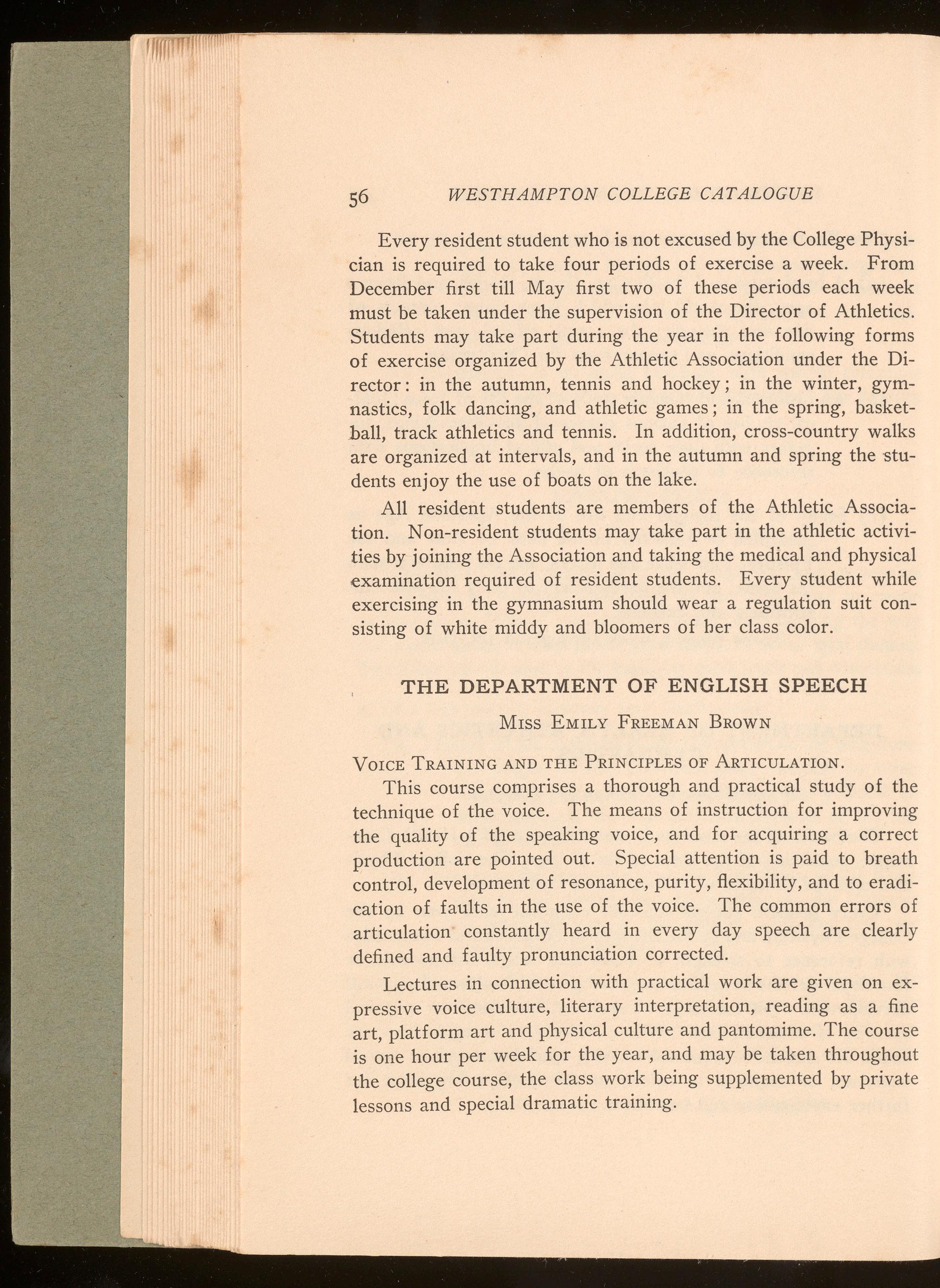
VoICE
TRAININGANDTHE PRINCIPLESOF ARTICULATION.
This course comprises a thorough and practical study of the technique of the voice. The means of instruction for improving the quality of the speaking voice, and for acquiring a correct production are pointed out. Special attention is paid to breath control, development of resonance, purity, flexibility, and to eradication of faults in the use of the voice The common errors of articulation constantly heard in every day speech are clearly defined and faulty pronunciation corrected.
Lectures in connection with practical work are given on expressive voice culture, literary interpretation, reading as a fine art, platform art and physical culture and pantomime. The course is one hour per week for the year, and may be taken throughout the college course, the class work being supplemented by private lessons and special dramatic training.
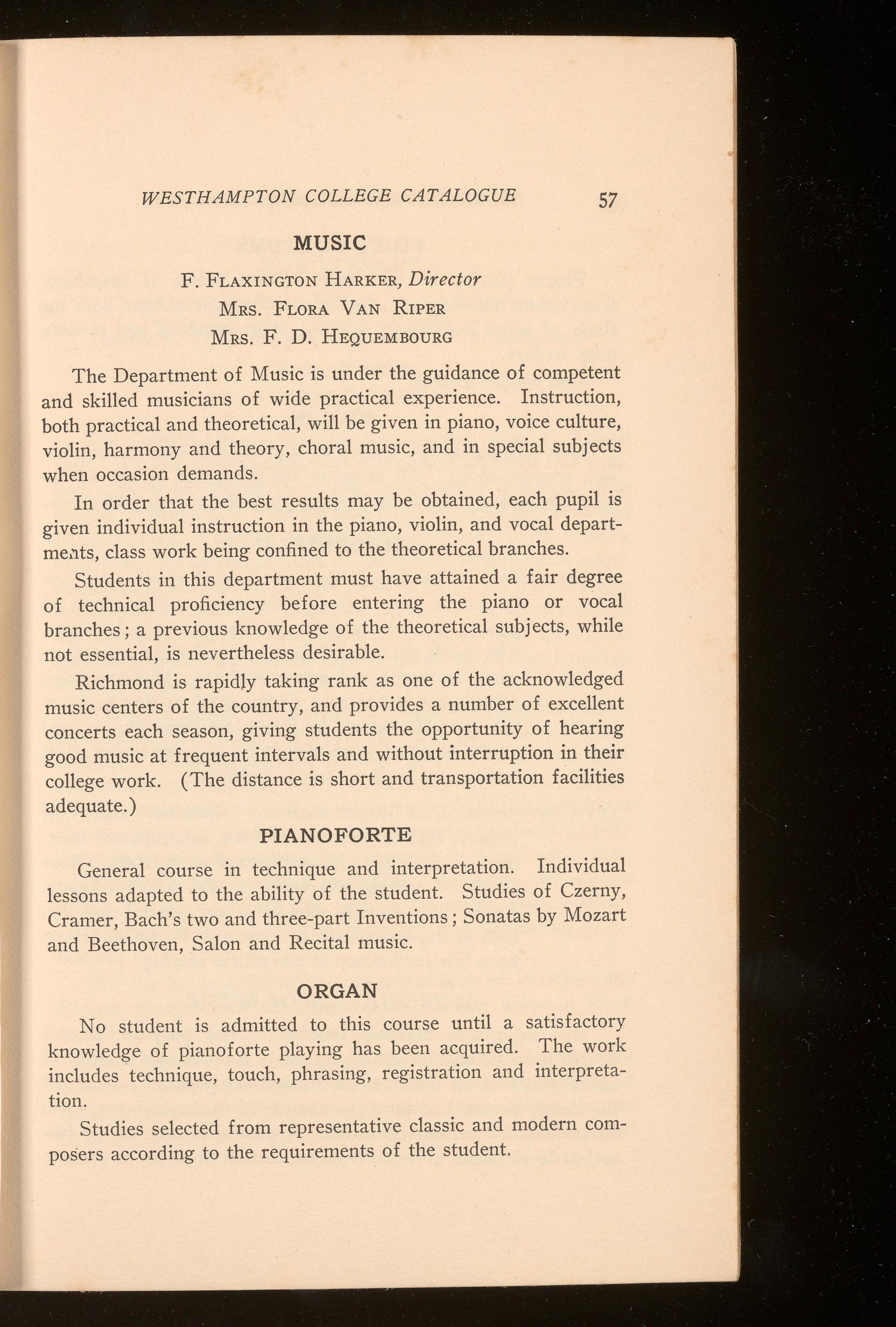
MUSIC
F. FLAXINGTON HARKER , Director
MRS FLORA VAN RIPER
MRS F. D. HEQUEMBOURG
The Department of Music is under the guidance of competent and skilled musicians of wide practical experience. Instruction, both practical and theoretical, will be given in piano, voice culture, violin, harmony and theory, choral music, and in special subjects when occasion demands.
In order that the best results may be obtained, each pupil is given individual instruction in the piano, violin, and vocal departme;1ts, class work being confined to the theoretical branches.
Students in this department must have attained a fair degree of technical proficiency before entering the piano or vocal branches; a previous knowledge of the theoretical subjects, while not essential, is nevertheless desirable.
Richmond is rapidly taking rank as one of the acknowledged music centers of the country, and provides a number of excellent concerts each season, giving students the opportunity of hearing good music at frequent intervals and without interruption in their college work. (The distance is short and transportation facilities adequate.)
PIANOFORTE
General course in technique and interpretation. Individual lessons adapted to the ability of the student. Studies of Czerny, Cramer, Bach's two and three-part Inventions; Sonatas by Mozart and Beethoven, Salon and Recital music.
ORGAN
No student is admitted to this course until a satisfactory knowledge of pianoforte playing has been acquired. The work includes technique, touch, phrasing, registration and interpretation .
Studies selected from representative classic and modern composers according to the requirements of the student.
WESTHAMPTON COLLEGE CATALOGUE
THE LIBRARY
MARION G. RYLAND, B. A., B. S., Librarian
Lucy T. THROCKMORTON, Assistant to the Librarian
RUTH ELLIOTT Student Assistant '
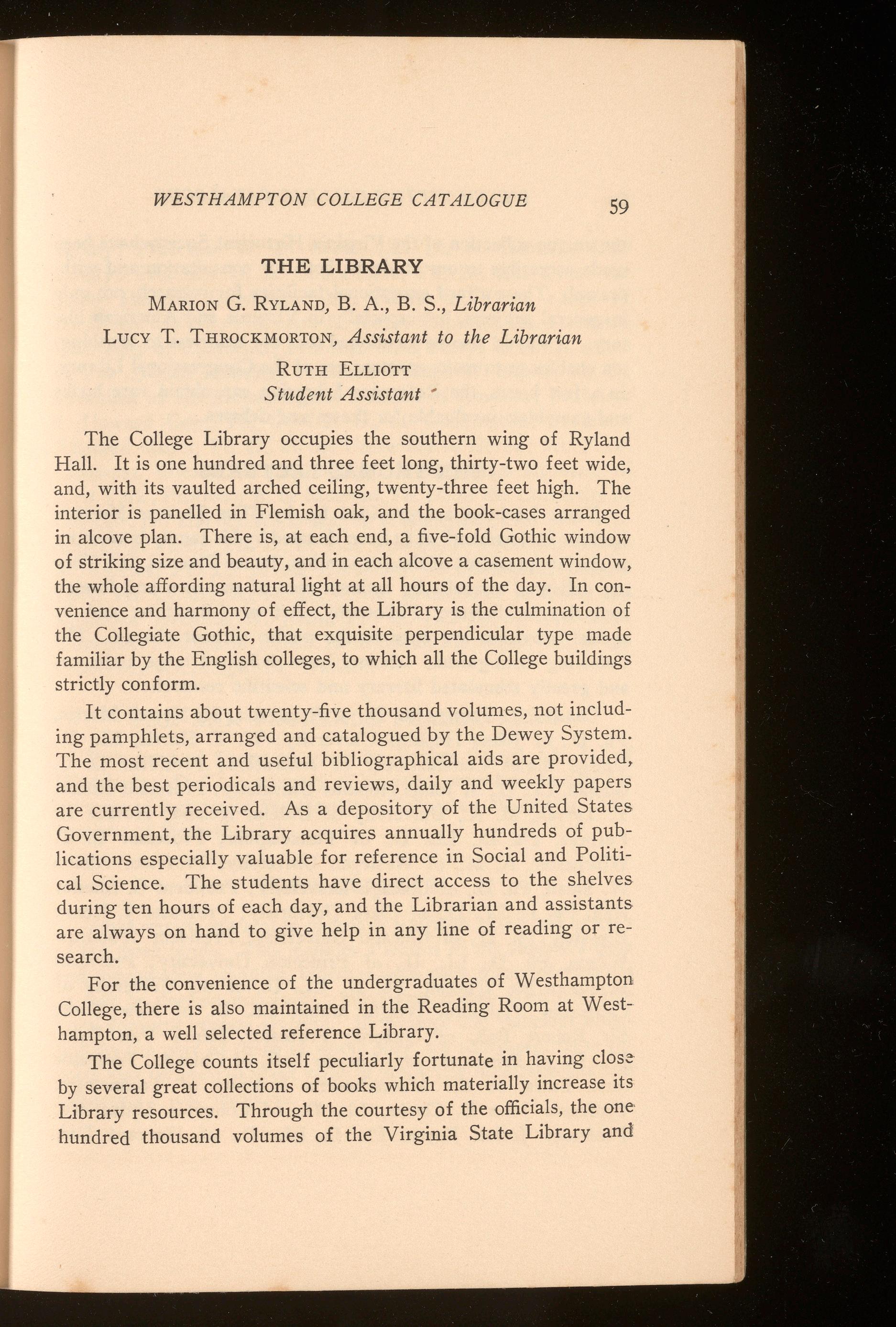
59
The College Library occupies the southern wing of Ryland Hall. It is one hundred and three feet long, thirty-two feet wide, and, with its vaulted arched ceiling, twenty-three feet high. The interior is panelled in Flemish oak, and the book-cases arranged in alcove plan. There is, at each end, a five-fold Gothic window of striking size and beauty, and in each alcove a casement window, the whole affording natural light at all hours of the day. In convenience and harmony of effect, the Library is the culmination of the Collegiate Gothic, that exquisite perpendicular type made familiar by the English colleges, to which all the College buildings strictly conform.
It contains about twenty-five thousand volumes, not including pamphlets, arranged and catalogued by the Dewey System. The most recent and useful bibliographical aids are provided, and the best periodicals and reviews, daily and weekly papers are currently received. As a depository of the United States Government, the Library acquires annually hundreds of publications especially valuable for reference in Social and Political Science. The students have direct access to the shelves during ten hours of each day, and the Librarian and assistants are always on hand to give help in any line of reading or research.
For the convenience of the undergraduates of Westhampton College, there is also maintained in the Reading Room at Westhampton, a well selected reference Library.
The College counts itself peculiarly fortunate in having close by several great collections of books which materially increase its Library resources. Through the courtesy of the officials, the one· hundred thousand volumes of the Virginia State Library and
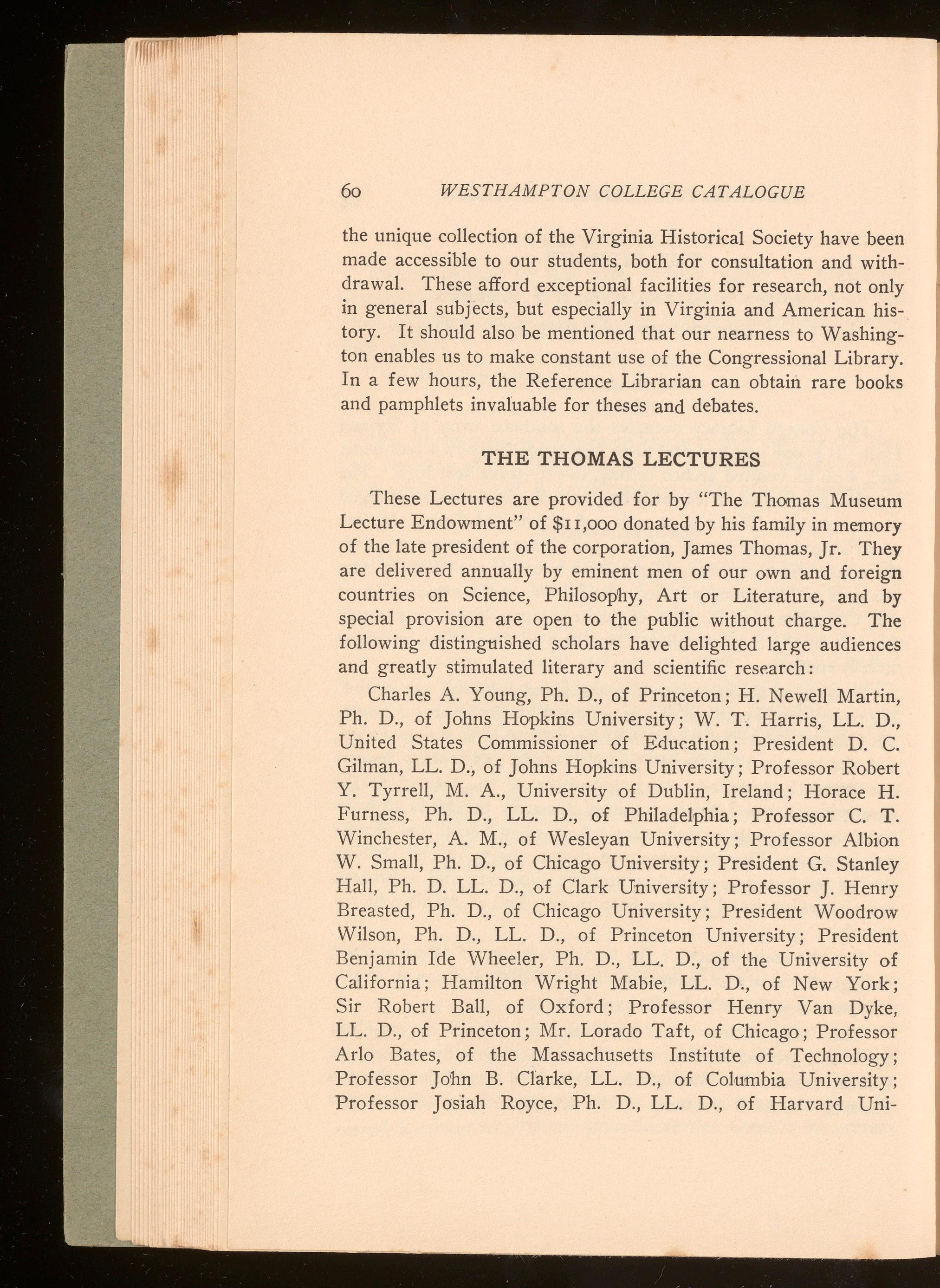
COLLEGE CATALOGUE
the unique collection of the Virginia Historical Society have been made accessible to our students, both for consultation and withdrawal. These afford exceptional facilities for research, not only in general subjects, but especially in Virginia and American history. It should also be mentioned that our nearness to Washington enables us to make constant use of the Congressional Library. In a few hours, the Reference Librarian can obtain rare books and pamphlets invaluable for theses and debates.
THE THOMAS LECTURES
These Lectures are provided for by "The Thomas Museum Lecture Endowment" of $u,ooo donated by his family in memory of the late president of the corporation, James Thomas, Jr. They are delivered annually by eminent men of our own and foreign countries on Science, Philosophy, Art or Literature, and by special provision are open to the public without charge. The following distinguished scholars have delighted large audiences and greatly stimulated literary and scientific resnrch: Charles A. Young, Ph. D., of Princeton; H. Newell Martin, Ph. D., of Johns Hopkins University; W. T. Harris, LL. D., United States Commissioner of Education; President D. C. Gilman, LL. D., of Johns Hopkins University; Professor Robert Y. Tyrrell, M. A., University of Dublin, Ireland; Horace H. Furness, Ph. D., LL. D., of Philadelphia; Professor C. T. Winchester, A. M., of Wesleyan University; Professor Albion W. Small, Ph. D., of Chicago University; President G. Stanley Hall, Ph. D. LL. D., of Clark University; Professor J. Henry Breasted, Ph. D., of Chicago University; President Woodrow Wilson, Ph. D., LL. D., of Princeton University; President Benjamin Ide Wheeler, Ph. D., LL. D., of the University of California; Hamilton Wright Mabie, LL. D., of New York; Sir Robert Ball, of Oxford ; Professor Henry Van Dyke, LL. D., of Princeton; Mr. Lorado Taft, of Chicago; Professor Ario Bates, of the Massachusetts Institute of Technology; Professor John B. Clarke, LL. D., of Columbia University; Professor Josiah Royce, Ph. D., LL. D., of Harvard Uni-
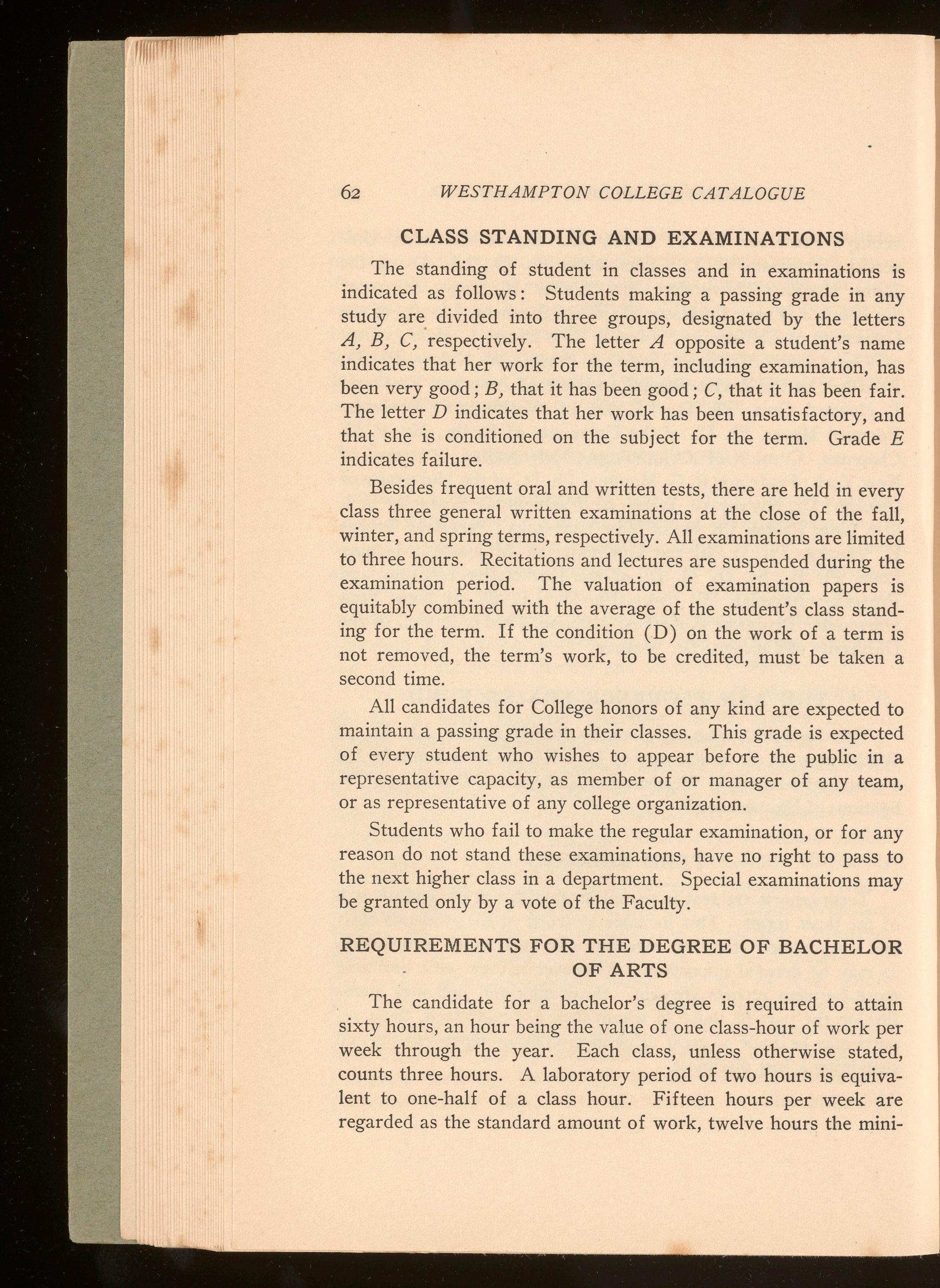
CLASS STANDING AND EXAMINATIONS
The standing of student in classes and in examinations is indicated as follows : Students making a passing grade in any study are divided into three groups, designated by the letters A, B, C, respectively. The letter A opposite a student's name indicates that her work for the term, including examination, has been very good; B, that it has been good; C, that it has been fair. The letter D indicates that her work has been unsatisfactory, and that she is conditioned on the subject for the term. Grade E indicates failure.
Besides frequent oral and written tests, there are held in every class three general written examinations at the close of the fall, winter, and spring terms, respectively. All examinations are limited to three hours. Recitations and lectures are suspended during the examination period. The valuation of examination papers is equitably combined with the average of the student's class standing for the term. If the condition (D) on the work of a term is not removed, the term's work, to be credited, must be taken a second time.
All candidates for College honors of any kind are expected to maintain a passing grade in their classes. This grade is expected of every student who wishes to appear before the public in a representative capacity, as member of or manager of any team, or as representative of any college organization.
Students who fail to make the regular examination, or for any reason do not stand these examinations, have no right to pass to the next higher class in a department. Special examinations may be granted only by a vote of the Faculty.
REQUIREMENTS FOR THE DEGREE OF BACHELOR OF ARTS
The candidate for a bachelor's degree is required to attain sixty hours, an hour being the value of one class-hour of work per week through the year. Each class, unless otherwise stated, counts three hours. A laboratory period of two hours is equivalent to one-half of a class hour. Fifteen hours per week are regarded as the standard amount of work, twelve hours the mini-
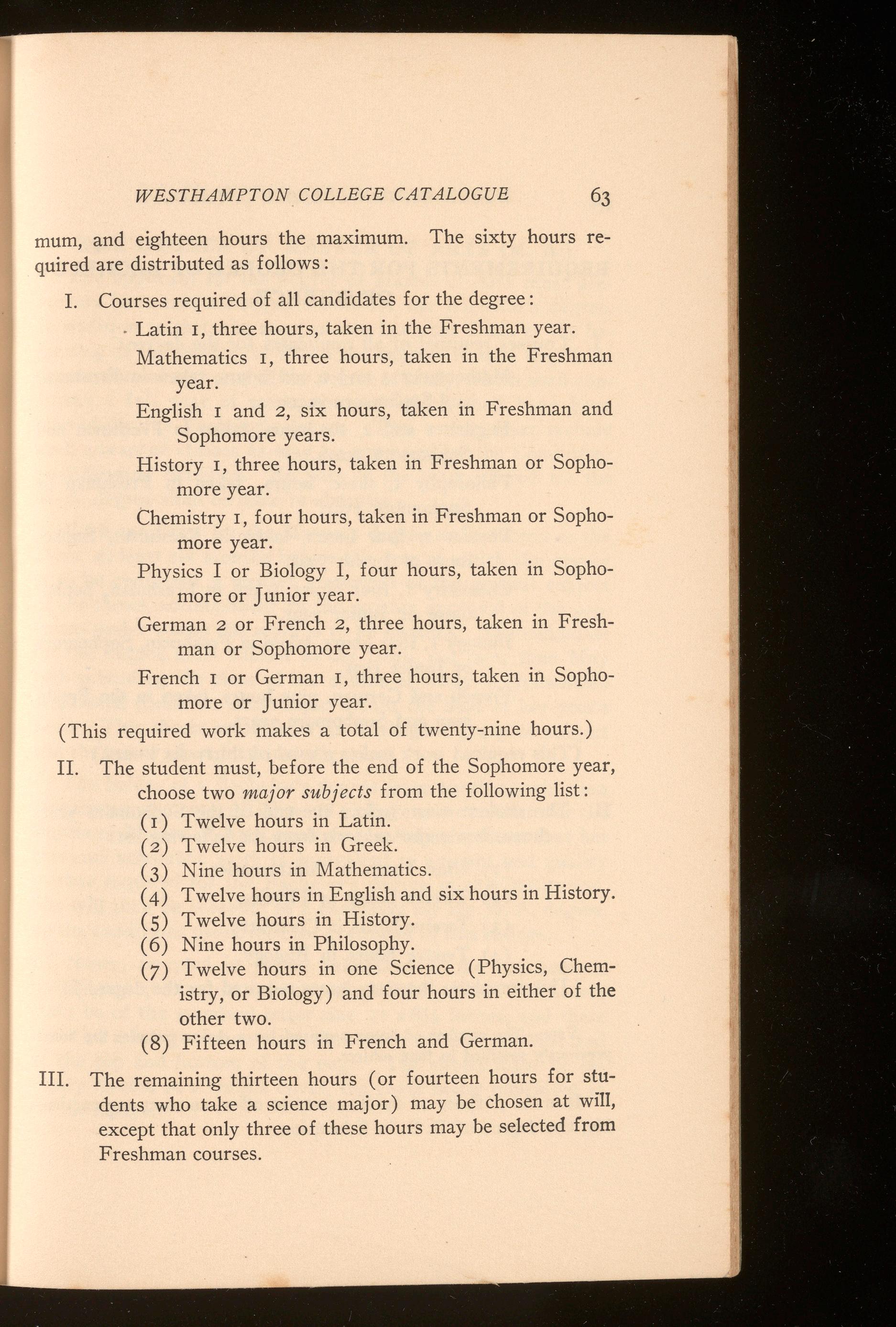
mum, and eighteen hours the maximum. The sixty hours required are distributed as follows:
I. Courses required of all candidates for the degree:
. Latin 1, three hours, taken in the Freshman year
Mathematics 1, three hours, taken in the Freshman year.
English I and 2, six hours, taken in Freshman and Sophomore years.
History 1, three hours, taken in Freshman or Sophomore year.
Chemistry 1, four hours, taken in Freshman or Sophomore year.
Physics I or Biology I, four hours, taken in Sophomore or Junior year.
German 2 or French 2, three hours, taken in Freshman or Sophomore year.
French I or German 1, three hours, taken in Sophomore or Junior year .
(This required work makes a total of twenty-nine hours.)
II. The student must, before the end of the Sophomore year, choose two major subjects from the following list:
( 1) Twelve hours in Latin
( 2) Twelve hours in Gre ek.
(3) Nine hours in Mathem a tics.
(4) Twelve hours in English and six hours in History.
(S) Twelve hours in History.
(6) Nine hours in Philosophy.
(7) Twelve hours in one Science (Physics, Chemistry, or Biology) and four hours in either of the other two.
(8) Fifteen hours in French and German.
III. The remaining thirteen hours ( or fourteen hours for students who take a science major) may be chosen at will, except that only three of these hours may be selected from Freshman courses.
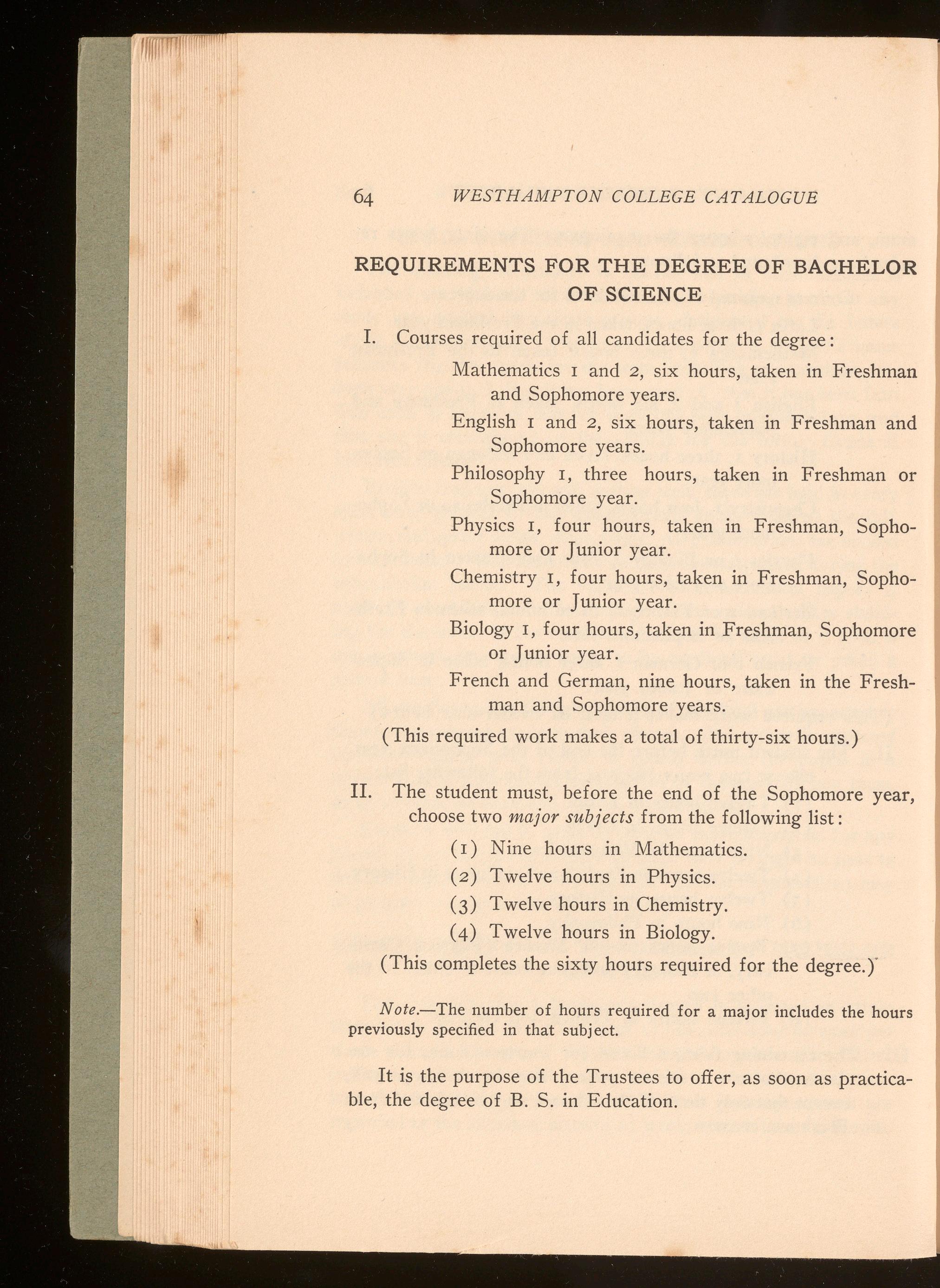
REQUIREMENTS FOR THE DEGREE OF BACHELOR OF SCIENCE
I. Courses required of all candidates for the degree :
Mathematics I and 2, six hours, taken in Freshman and Sophomore years .
English I and 2, six hours, taken in Freshman and Sophomore years.
Philosophy 1, three hours, taken in Freshman or Sophomore year.
Physics 1, four hours, taken in Freshman, Sophomore or Junior year .
Chemistry 1, four hours, taken in Freshman, Sophomore or Junior year.
Biology 1, four hours, taken in Freshman, Sophomore or Junior year.
French and German, nine hours, taken in the Freshman and Sophomore years.
(This required work makes a total of thirty-six hours.)
II. The student must, before the end of the Sophomore year, choose two major subjects from the following list:
( 1) Nine hours in Mathematics.
( 2) Twelve hours in Physics
(3) Twelve hours in Chemistry.
(4) Twelve hours in Biology.
(This completes the sixty hours required for the degree.)"
Note .-The number of hours required for a major includes the hours previously specified in that subject.
It is the purpose of the Trustees to offer, as soon as practicable, the degree of B . S. in Education.
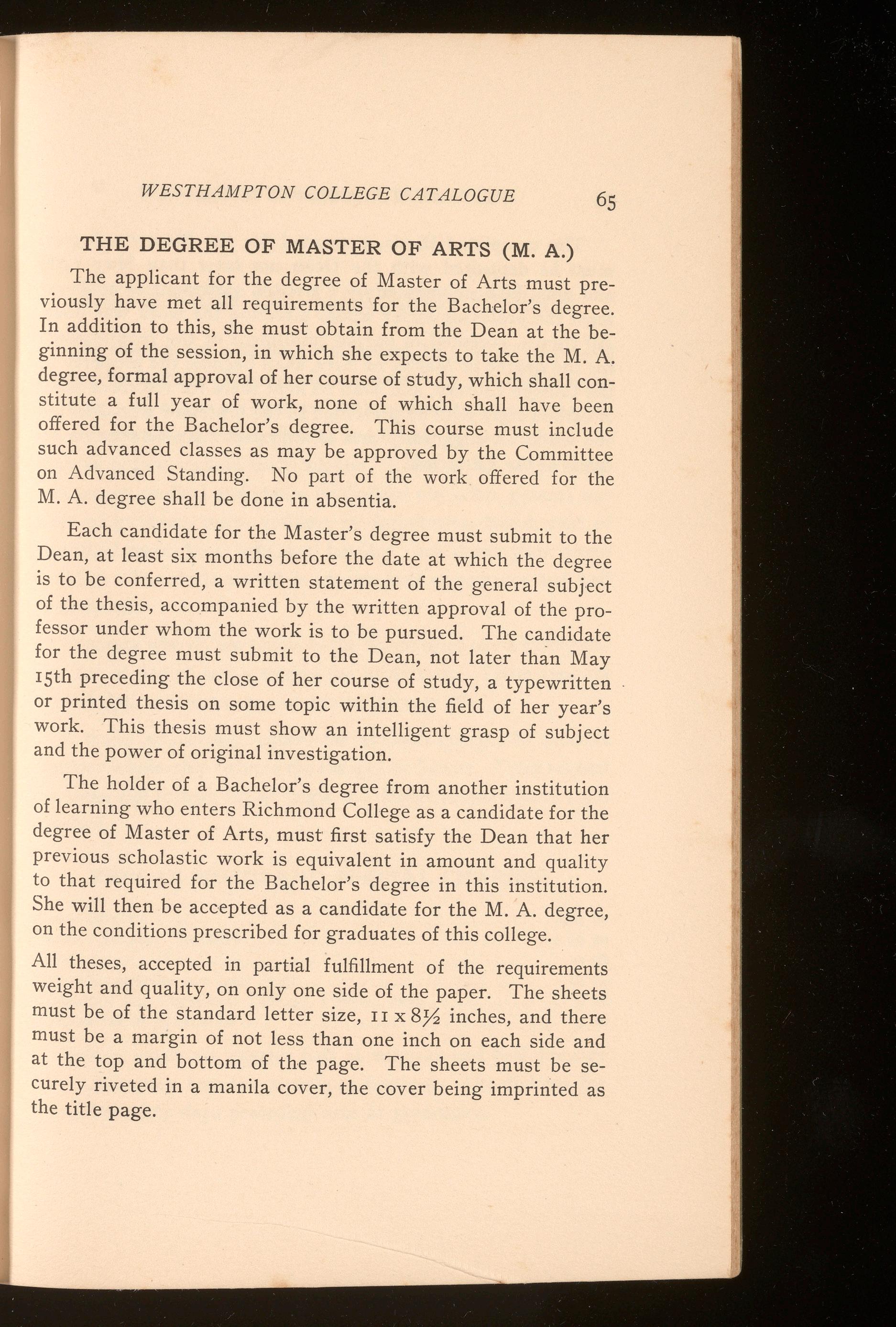
THE DEGREE OF MASTER OF ARTS (M. A.)
The applicant for the degree of Master of Arts must previously have met all requirements for the Bachelor's degree. In addition to this, she must obtain from the Dean at the beginning of the session, in which she expects to take the M. A. degree, formal approval of her course of study, which shall constitute a full year of work, none of which shall have been offered for the Bachelor's degree. This course must include such advanced classes as may be approved by the Committee on Advanced Standing. No part of the work offered for the M. A. degree shall be done in absentia.
Each candidate for the Master's degree must submit to the Dean, at least six months before the date at which the degree is to be conferred, a written statement of the general subj -ect of the thesis, accompanied by the written approval of the professor under whom the work is to be pursued. The candidate for the degree must submit to the Dean, not later than May 15th preceding the close of her course of study, a typewritten or printed thesis on some topic within the field of her year's work. This thesis must show an intelligent grasp of subject and the power of original investigation.
The holder of a Bachelor's degree from another institution of learning who enters Richmond College as a candidate for the degree of Master of Arts, must first satisfy the Dean that her previous scholastic work is equivalent in amount and quality to that required for the Bachelor's degree in this institution She will then be accepted as a candidate for the M. A. degree, on the conditions prescribed for graduates of this college. All theses, accepted in partial fulfillment of the requirements weight and quality, on only one side of the paper. The sheets must be of the standard letter size, 11 x 8.½ inches, and there must be a margin of not less than one inch on each side and at the top and bottom of the page. The sheets must be securely riveted in a manila cover, the cover being imprinted as the title page.
EXPENSES OF COLLEGE YEAR
The charges for a student resident in the College vary from $350.00 to $450.00 The variation is caused by size and location of room. All rooms are equipped with furnitur.e of the same quality, and are heated with hot water and lighted by electricity. The charges named include matriculation, tuition in all subjects except music, medical attendance by College physician, general services of graduate nurse resident in dormitories, board, rent of furnished room, heat, light, and laundry ( one dozen plain pieces weekly). The student's bill is payable half at entrance and half January 5th.
Students who do not reside in the dormitories pay a matriculation fee of $25.00 and a tuition fee of $100.00. These fees are payable $75.00 at entrance and $50.00 January 5th.
A major scholarship reduces the student's charges by $100.00. A minor scholarship reduces the charges by $50.00. Upon request the Dean will furnish list of single and double rooms with charges attached.
FEES IN MUSIC AND SPECIAL CHARGES
Piano, Director ..................................................
Piano, Associate Teachers .......................................
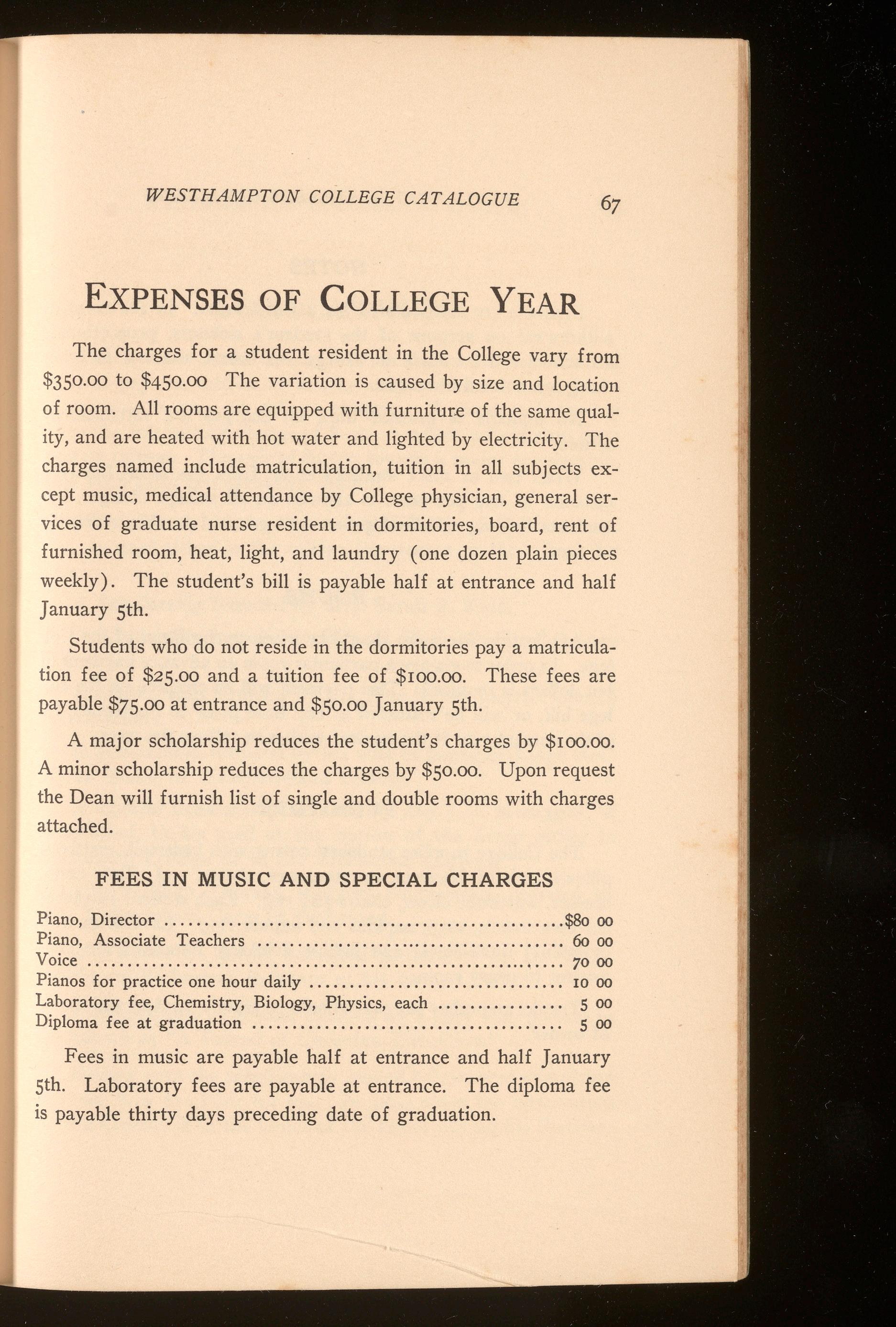
$8o oo
oo Voice ............................................................
Pianos for practice one hour daily
Laboratory fee, Chemistry, Biology, Physics, each
Diploma fee at graduation
Fees in music are payable half at entrance and half January 5th. Laboratory fees are payable at entrance. The diploma fee is payable thirty days preceding date of graduation.
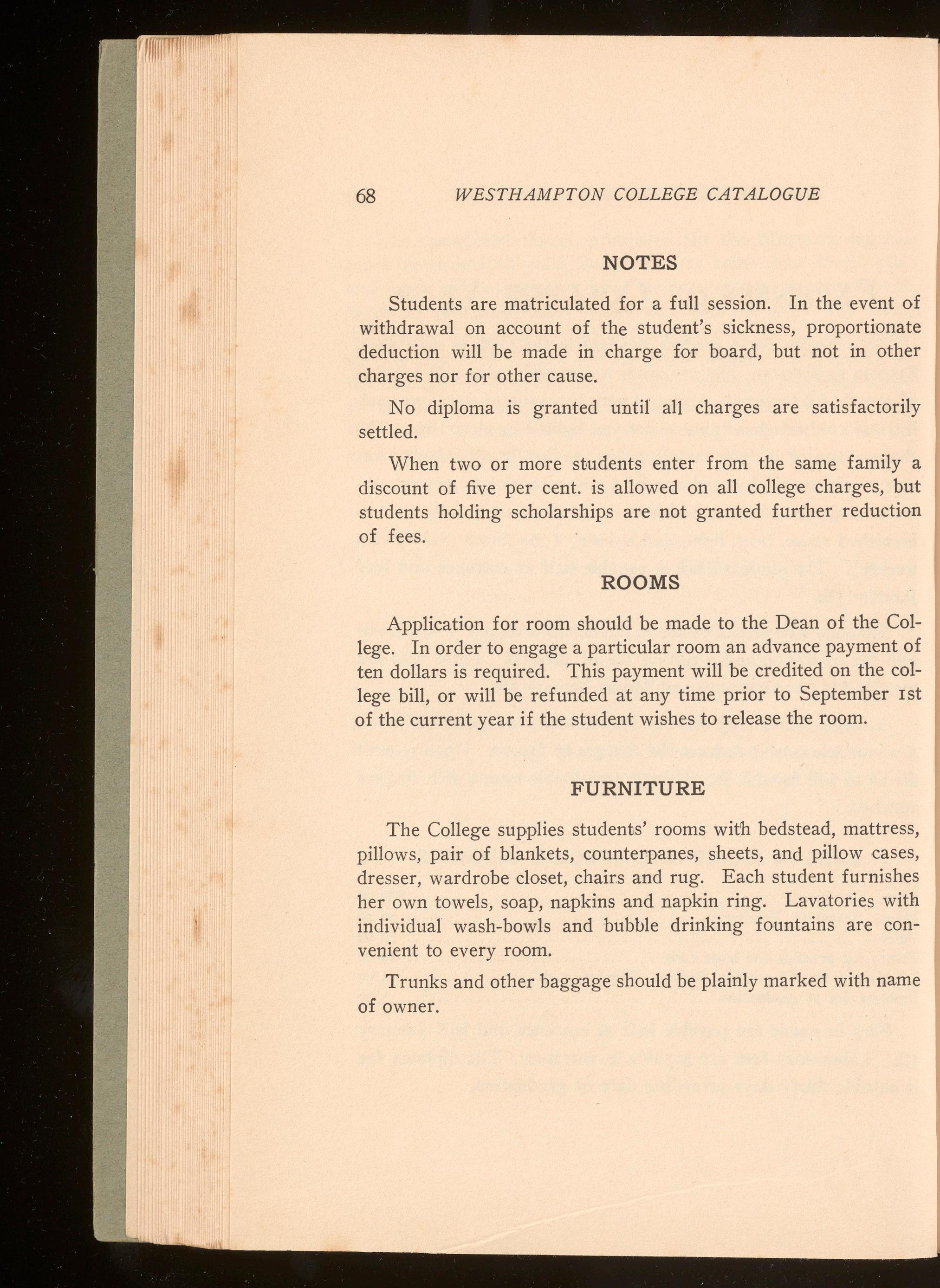
NOTES
Students are matriculated for a full session. In the event of withdrawal on account of the student's sickness, proportionate deduction will be made in charge for board, but not in other charges nor for other cause.
No diploma is granted until all charges are satisfactorily settled .
When two or more students enter from the same family a discount of five per cent. is allowed on all college charges, but students holding scholarships are not granted further reduction of fees.
ROOMS
Application for room should be made to the Dean of the College. In order to engage a particular room an advance payment of ten dollars is required. This payment will be credited on the college bill, or will be refunded at any time prior to September 1st of the current year if the student wishes to release the room.
FURNITURE
The College supplies students' rooms with bedstead, mattress, pillows, pair of blankets, counterpanes, sheets, and pillow cases , dre sser, wardrobe closet, chairs and rug. Each student furnishes her own towels, soap, napkins and napkin ring. Lavatories with individual wash-bowls and bubble drinking fountains are convenient to every room.
Trunks and other baggage should be plainly marked with name of owner.
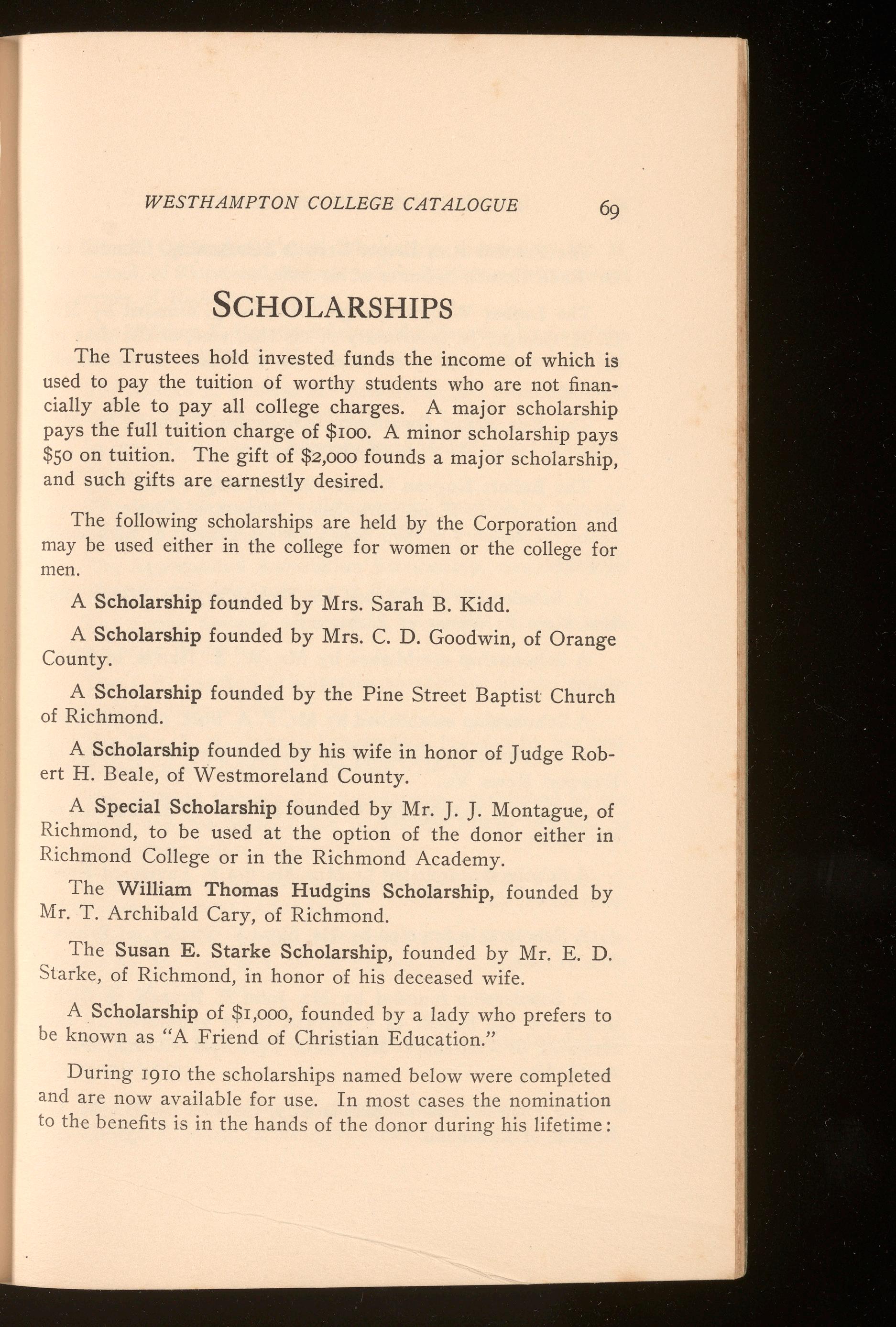
SCHOLARSHIPS
The Trustees hold invested funds the income of which is used to pay the tuition of worthy students who are not financially able to pay all college charges. A major scholarship pays the full tuition charge of $100. A minor scholarship pays $50 on tuition. The gift of $2,000founds a major scholarship, and such gifts are earnestly desired.
The following scholarships are held by the Corporation and may be used either in the college for women or the college for men.
A Scholarship founded by Mrs. Sarah B. Kidd.
A Scholarship founded by Mrs. C. D. Goodwin, of Orange County.
A Scholarship founded by the Pine Street Baptist Church of Richmond.
A Scholarship founded by his wife in honor of Judge Robert H. Beale, of Westmoreland County.
A Special Scholarship founded by Mr. J. J. Montague, of Rich mond, to be used at the option of the donor either in Rich mond College or in the Richmond Academy.
The William Thomas Hudgins Scholarship, founded by Mr. T. Archibald Cary, of Richmond.
The Susan E. Starke Scholarship, founded by Mr. E. D. Starke, of Richmond, in honor of his deceased wife.
A Scholarship of $1,000, founded by a lady who prefers to be known as "A Friend of Christian Education."
During 1910 the scholarships named below were completed and are now available for use. In most cases the nomination to the benefits is in the hands of the donor during his lifetime:
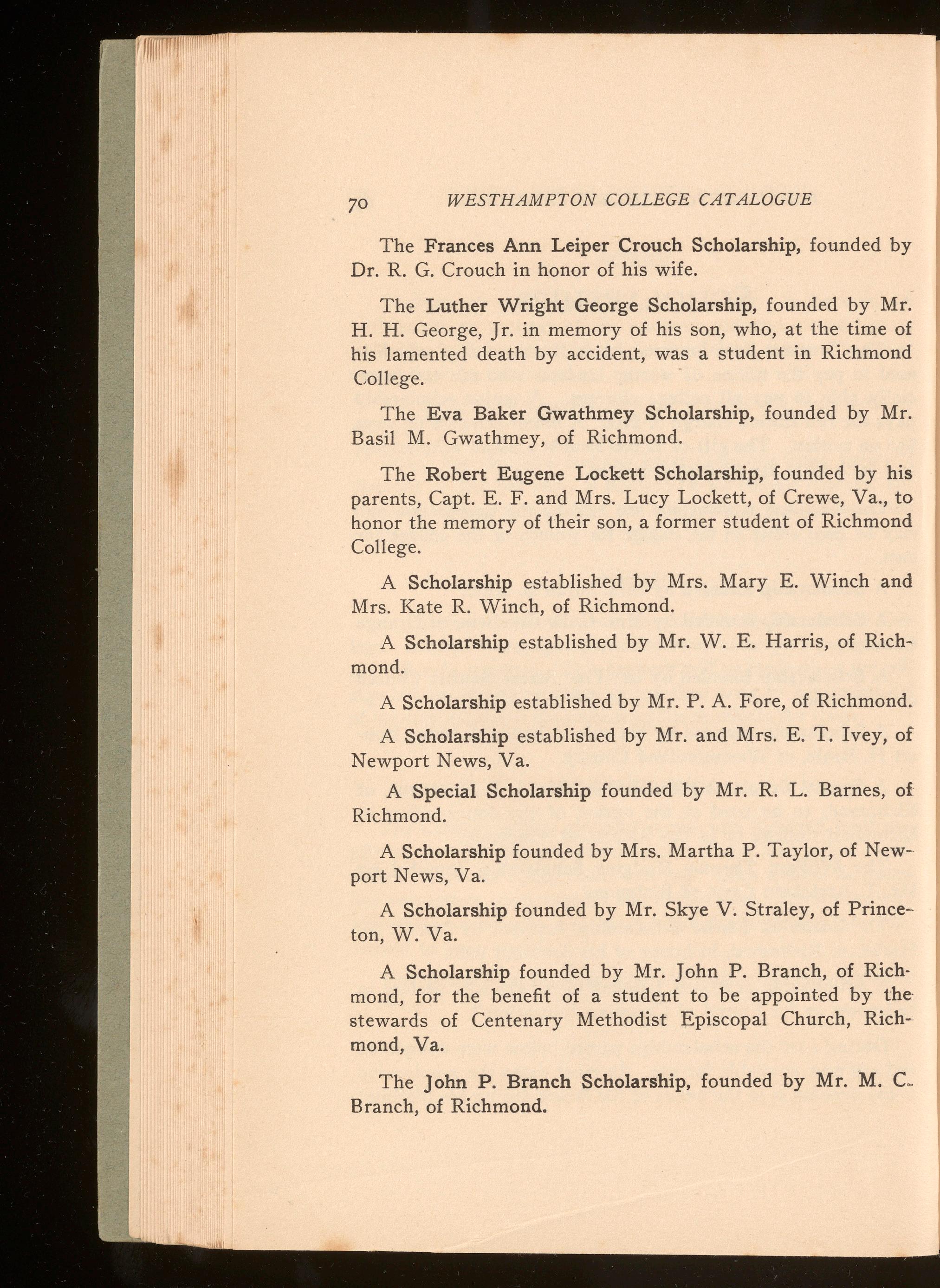
70 WESTHAMPTON COLLEGE CATALOGUE
The Frances Ann Leiper Crouch Scholarship, founded by Dr. R. G. Crouch in honor of his wife.
The Luther Wright George Scholarship, founded by Mr. H. H. George, Jr. in memory of his son, who, at the time of his lamented death by accident, was a student in Richmond College. ·
The Eva Baker Gwathmey Scholarship, founded by Mr. Basil M. Gwathmey, of Richmond.
The Robert Eugene Lockett Scholarship, founded by his parents, Capt. E. F. and Mrs. Lucy Lockett, of Crewe, Va., to honor the memory of their son, a former student of Richmond College.
A Scholarship established by Mrs. Mary E. Winch and Mrs. Kate R. Winch, of Richmond.
A Scholarship established by Mr. W. E. Harris, of Richmond.
A Scholarship established by Mr. P.A. Fore, of Richmond.
A Scholarship established by Mr. and Mrs. E. T. Ivey, of Newport News, Va.
A Special Scholarship founded by Mr. R. L. Barnes, of Richmond.
A Scholarship founded by Mrs. Martha P. Taylor, of Newport News, Va.
A Scholarship founded by Mr. Skye V. Straley, of Princeton, W. Va.
A Scholarship founded by Mr. John P. Branch, of Richmond, for the benefit of a student to be appointed by the stewards of Centenary Methodist Episcopal Church, Rich-mond, Va.
The John P. Branch Scholarship, founded by Mr. M. C Branch, of Richmond.
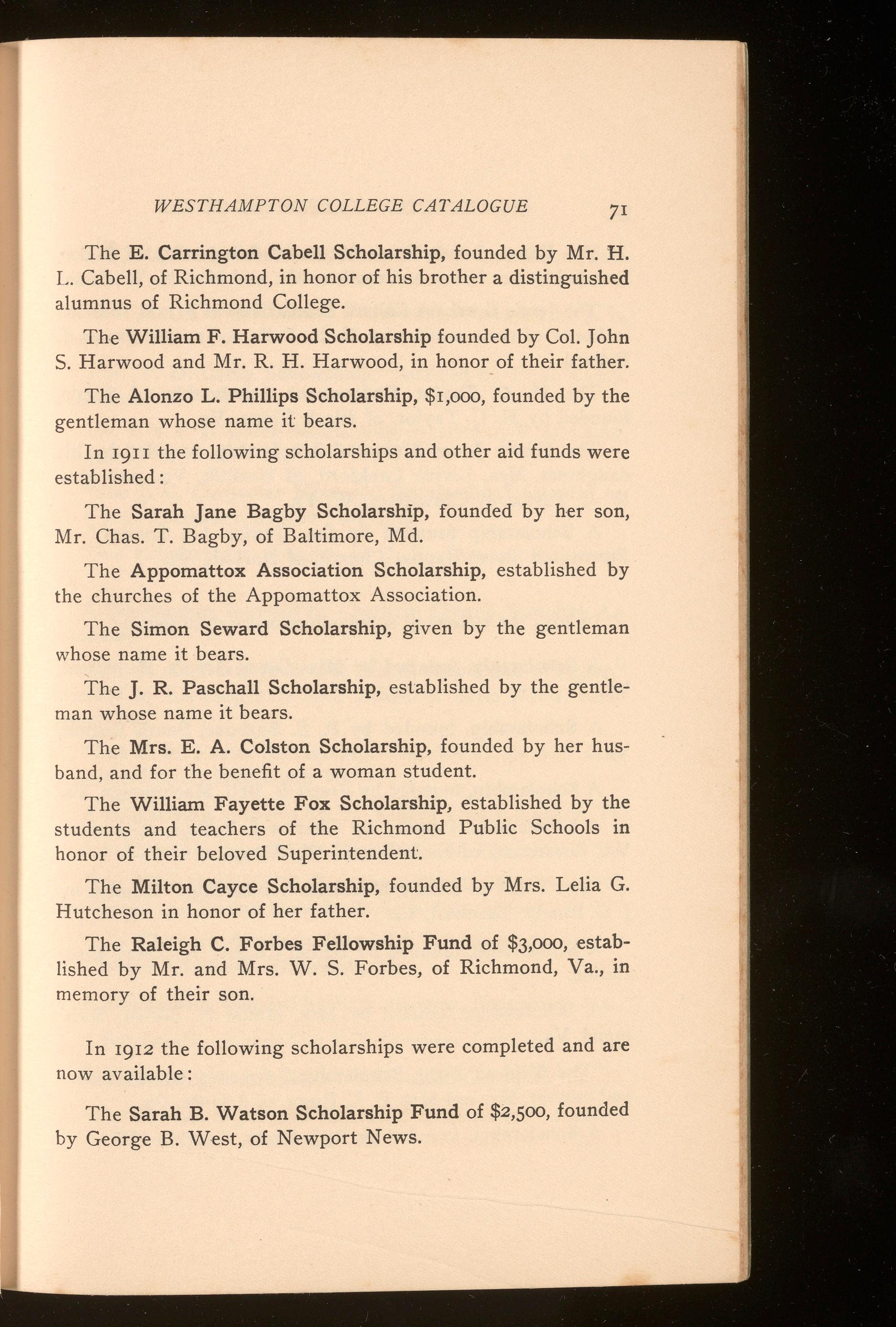
The E. Carrington Cabell Scholarship, founded by Mr. H. L. Cabell, of Richmond, in honor of his brother a distinguished alumnus of Richmond College.
The William F. Harwood Scholarship founded by Col. John S. Harwood and Mr. R. H. Harwood, in honor of their father.
The Alonzo L. Phillips Scholarship, $1,000, founded by the gentleman whose name it bears.
In 1911 the following scholarships and other aid funds were established:
The Sarah Jane Bagby Scholarship, founded by her son, Mr Chas. T. Bagby, of Baltimore, Md.
The Appomattox Association Scholarship, established by the churches of the Appomattox Association.
The Simon Seward Scholarship, given by the gentleman whose name it bears.
The J. R. Paschall Scholarship, established by the gentleman whose name it bears.
The Mrs. E. A. Colston Scholarship, founded by her husband, and for the benefit of a woman student.
The William Fayette Fox Scholarship, established by the students and teachers of the Richmond Public Schools in honor of their beloved Superintendent.
The Milton Cayce Scholarship, founded by Mrs. Lelia G. Hutcheson in honor of her father.
The Raleigh C. Forbes Fellowship Fund of $3,000, established by Mr. and Mrs. W. S. Forbes, of Richmond, Va., in memory of their son.
In 1912 the following scholarships were completed and are now available:
The Sarah B. Watson Scholarship Fund of $2,500, founded by George B. West, of Newport News.
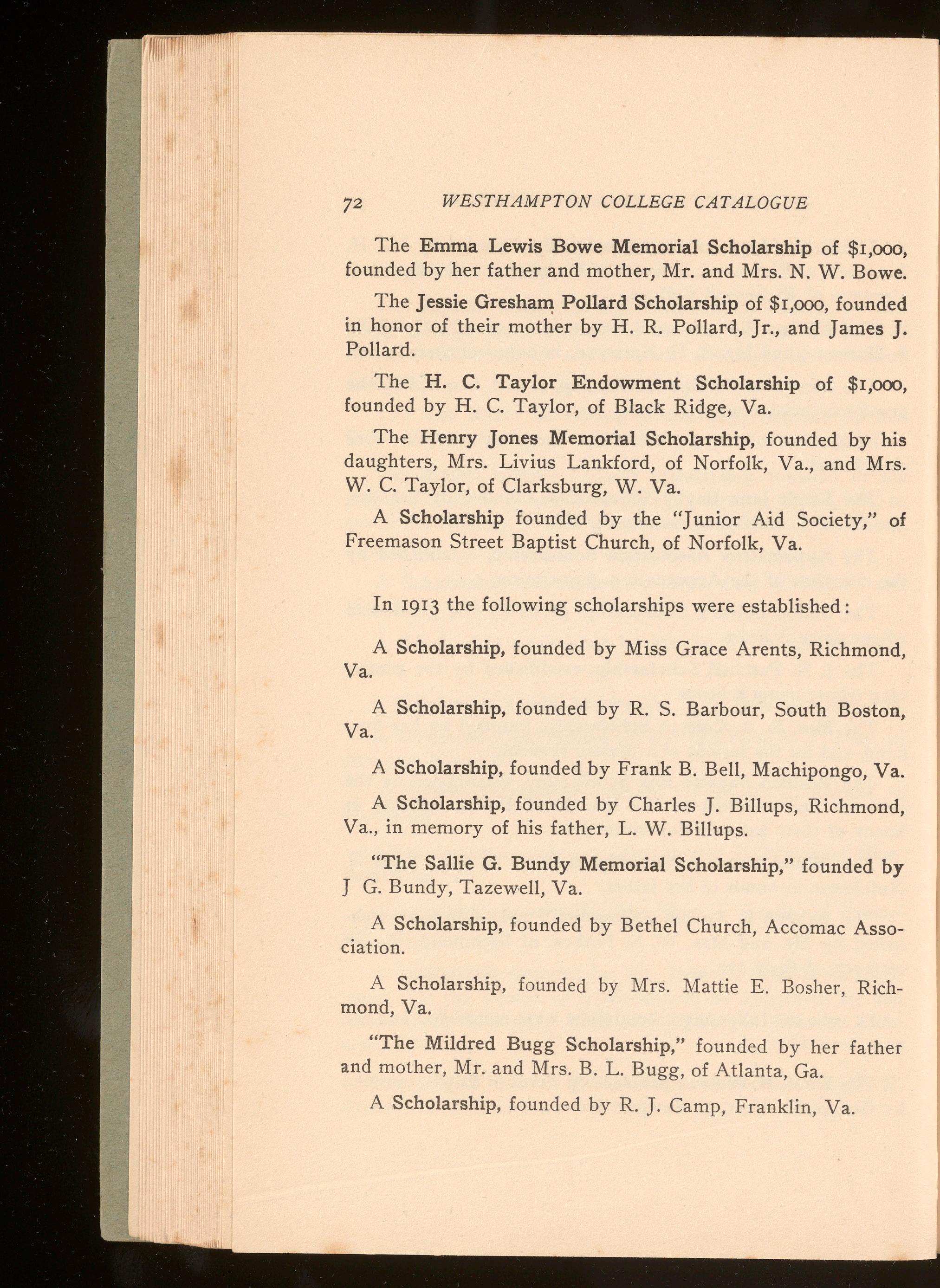
72 WESTHAMPTON COLLEGE CATALOGUE
The Emma Lewis Bowe Memorial Scholarship of $1,000, founded by her father and mother, Mr. and Mrs. N. W. Bowe.
The Jessie Gresha~ Pollard Scholarship of $1,000, founded in honor of their mother by H. R. Pollard, Jr., and James J. Pollard.
The H. C. Taylor Endowment Scholarship of $1,000, founded by H. C. Taylor, of Black Ridge, Va.
The Henry Jones Memorial Scholarship, founded by his daughters, Mrs. Livius Lankford, of Norfolk, Va., and Mrs. W. C. Taylor, of Clarksburg, W. Va.
A Scholarship founded by the "Junior Aid Society," of Freemason Street Baptist Church, of Norfolk, Va.
In 1913 the following scholarships were established:
A Scholarship, founded by Miss Grace Arents, Richmond, Va.
A Scholarship, founded by R. S. Barbour, South Boston, Va.
A Scholarship, founded by Frank B. Bell, Machipongo, Va.
A Scholarship, founded by Charles J. Billups, Richmond, Va., in memory of his father, L. W. Billups.
"The Sallie G. Bundy Memorial Scholarship," founded by J G. Bundy, Tazewell, Va.
A Scholarship, founded by Bethel Church, Accomac Association.
A Scholarship, founded by Mrs. Mattie E. Bosher, Richmond, Va.
"The Mildred Bugg Scholarship," founded by her father and mother, Mr. and Mrs. B. L. Bugg, of Atlanta, Ga.
A Scholarship, founded by R. J. Camp, Franklin, Va.
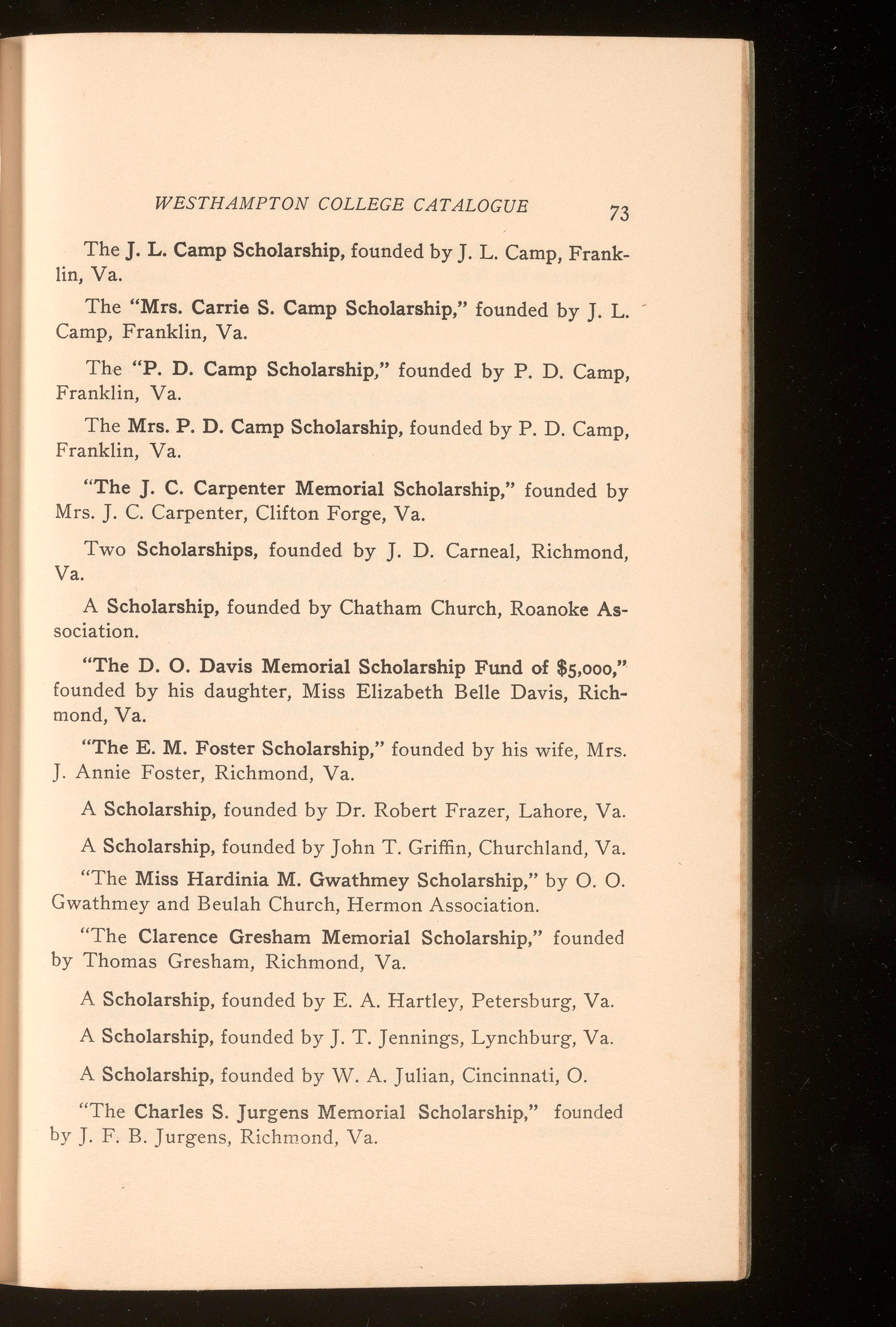
WESTHAMPTON COLLEGE CATALOGUE 73
The J. L. Camp Scholarship, founded by J. L. Camp, Franklin, Va.
The "Mrs. Carrie S. Camp Scholarship," founded by J. L.Camp, Franklin, Va.
The "P. D. Camp Scholarship," founded by P. D. Camp, Franklin, Va.
The Mrs. P. D. Camp Scholarship, founded by P. D. Camp, Franklin, Va.
"The J. C. Carpenter Memorial Scholarship," founded by Mrs. J. C. Carpenter, Clifton Forge, Va.
Two Scholarships, founded by J. D. Carneal, Richmond, Va.
A Scholarship, founded by Chatham Church, Roanoke Associ ation.
"The D. 0. Davis Memorial Scholarship Fund of $5,000," founded by his daughter, Miss Elizabeth Belle Davis, Richmond, Va.
"The E. M. Foster Scholarship," founded by his wife, Mrs. J. Annie Foster, Richmond, Va.
A Scholarship, founded by Dr. Robert Frazer, Lahore, Va.
A Scholarship, founded by John T. Griffin, Churchland, Va.
"The Miss Hardinia M. Gwathmey Scholarship," by 0. 0. Gwathmey and Beulah Church, Hermon Association.
"The Clarence Gresham Memorial Scholarship," founded by Thomas Gresham, Richmond, Va.
A Scholarship, founded by E. A. Hartley, Petersburg, Va.
A Scholarship, founded by J. T. Jennings, Lynchburg, Va.
A Scholarship, founded by W. A. Julian, Cincinnati, 0.
"The Charles S. Jurgens Memorial Scholarship," founded by J. F. B. Jurgens, Richmond, Va.
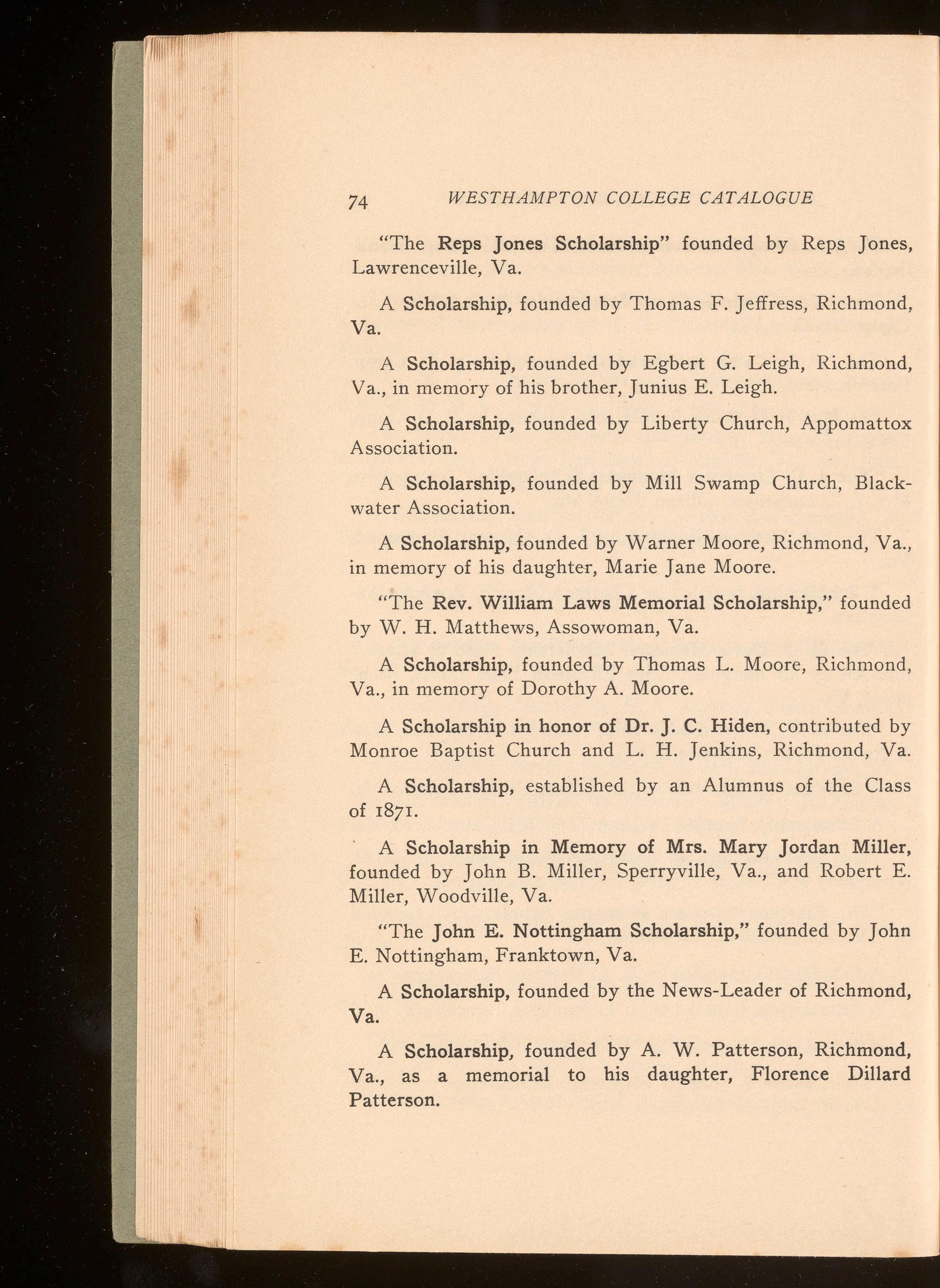
74 WESTHAMPTON COLLEGE CATALOGUE
"The Reps Jones Scholarship" founded by Reps Jones, Lawrenceville, Va.
A Scholarship, founded by Thomas F. Jeffress, Richmond, Va.
A Scholarship, founded by Egbert G. Leigh, Richmond, Va., in memory of his brother, Junius E. Leigh.
A Scholarship, founded by Liberty Church, Appomattox Association.
A Scholarship, founded by Mill Swamp Church, Blackwater Association.
A Scholarship, founded by Warner Moore, Richmond, Va., in memory of his daughter, Marie Jane Moore.
"The Rev. William Laws Memorial Scholarship," founded by W. H. Matthews, Assowoman, Va.
A Scholarship, founded by Thomas L. Moore, Richmond, Va., in memory of Dorothy A. Moore.
A Scholarship in honor of Dr. J. C. Riden, contributed by Monroe Baptist Church and L. H. Jenkins, Richmond, Va.
A Scholarship, established by an Alumnus of the Class of 1871.
A Scholarship in Memory of Mrs. Mary Jordan Miller, founded by John B. Miller, Sperryville, Va., and Robert E. Miller, Woodville, Va.
"The John E. Nottingham Scholarship," founded by John E. Nottingham, Franktown, Va.
A Scholarship, founded by the News-Leader of Richmond, Va.
A Scholarship, founded by A. W. Patterson, Richmond, Va., as a memorial to his daughter, Florence Dillard Patterson.
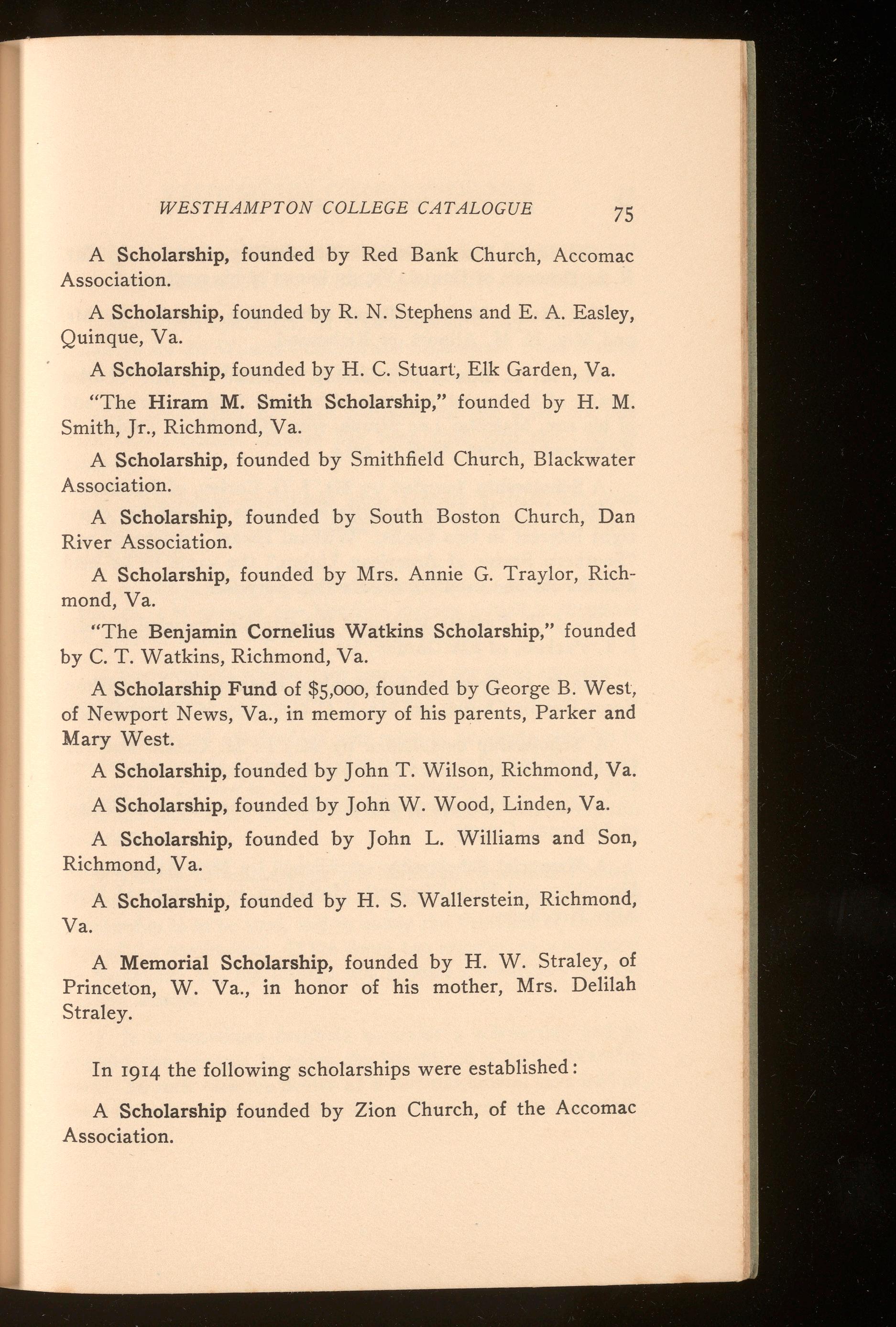
WESTHAMPTON COLLEGE CATALOGUE 75
A Scholarship, founded by Red Bank Church, Accomac Association.
A Scholarship, founded by R. N. Stephens and E. A. Easley, Quinque, Va.
A Scholarship, founded by H. C. Stuart, Elk Garden, Va.
"The Hiram M. Smith Scholarship," founded by H. M. Smith, Jr., Richmond, Va.
A Scholarship, founded by Smithfield Church, Blackwater Association.
A Scholarship, founded by South Boston Church, Dan River Association.
A Scholarship, founded by Mrs. Annie G. Traylor, Richmond, Va.
"The Benjamin Cornelius Watkins Scholarship," founded by C. T. Watkins, Richmond, Va.
A Scholarship Fund of $5,000,founded by George B. West, of Newport News, Va., in memory of his parents, Parker and Mary West.
A Scholarship, founded by John T. Wilson, Richmond, Va.
A Scholarship, founded by John W. Wood, Linden, Va.
A Scholarship, founded by John L. Williams and Son, Richmond, Va.
A Scholarship, founded by H. S. W allerstein, Richmond, Va.
A Memorial Scholarship, founded by H. W. Straley, of Princeton, W. Va., in honor of his mother, Mrs. Delilah Straley.
In 1914 the following scholarships were established:
A Scholarship founded by Zion Church, of the Accomac Association.
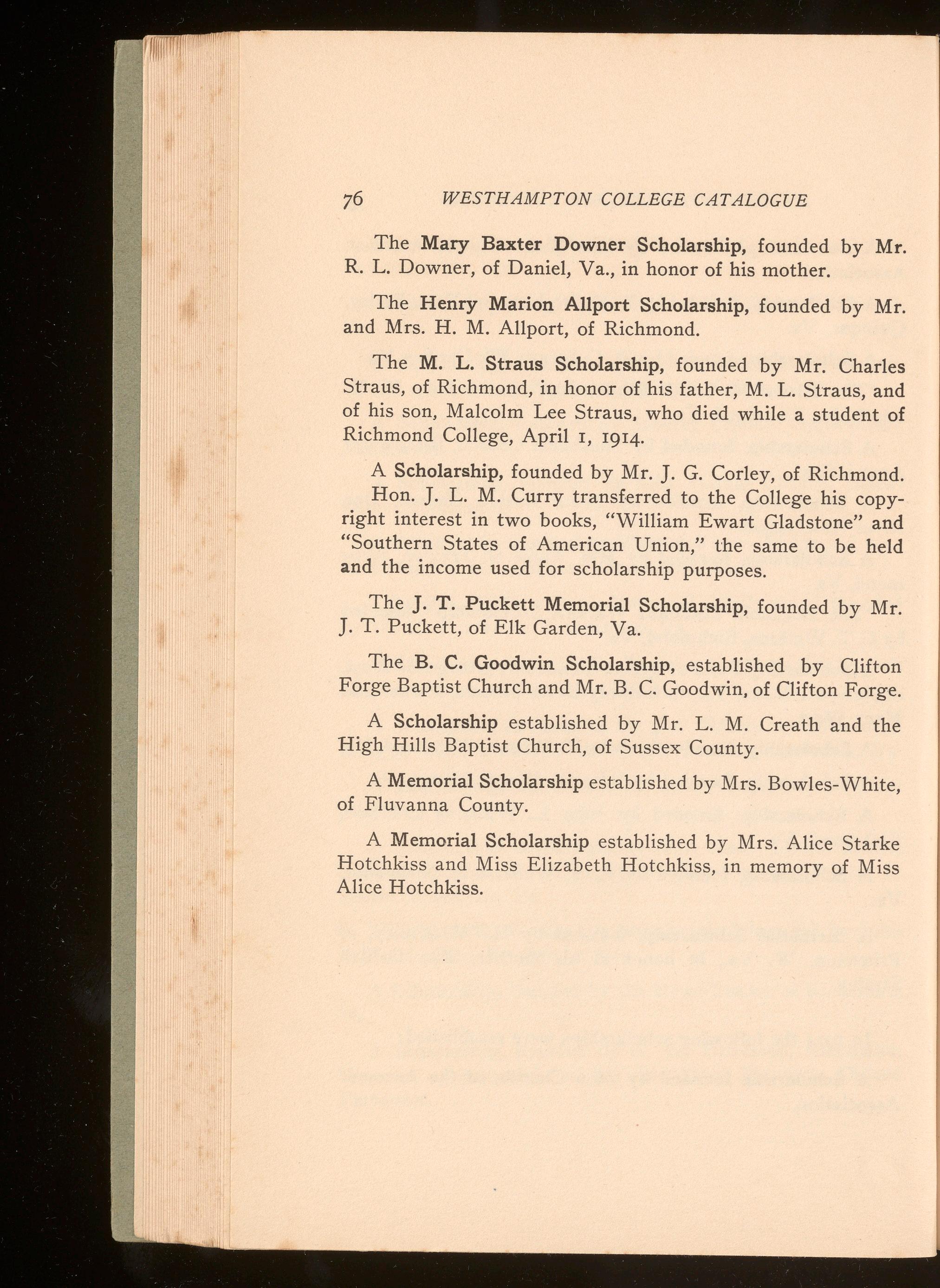
76 WESTHAMPTON COLLEGE CATALOGUE
The Mary Baxter Downer Scholarship, founded by Mr. R. L. Downer, of Daniel, Va., in honor of his mother.
The Henry Marion Allport Scholarship, founded by Mr. and Mrs. H. M. Allport, of Richmond.
The M. L. Straus Scholarship, founded by Mr. Charles Straus, of Richmond, in honor of his father, M. L. Straus, and of his son, Malcolm Lee Straus, who died while a student of Richmond College, April r, 1914.
A Scholarship, founded by Mr. J. G. Corley, of Richmond. Hon. J. L. M. Curry transferred to the College his copyright interest in two books, "William Ewart Gladstone" and "Southern States of American Union," the same to be held and the income used for scholarship purposes.
The J. T. Puckett Memorial Scholarship, founded by Mr. J. T. Puckett, of Elk Garden, Va.
The B. C. Goodwin Scholarship, established by Clifton Forge Baptist Church and Mr. B. C. Goodwin, of Clifton Forge.
A Scholarship established by Mr. L. M. Creath and the High Hills Baptist Church, of Sussex County.
A Memorial Scholarship established by Mrs. Bowles-White, of Fluvanna County.
A Memorial Scholarship established by Mrs. Alice Starke Hotchkiss and Miss Elizabeth Hotchkiss, in memory of Miss Alice Hotchkiss.
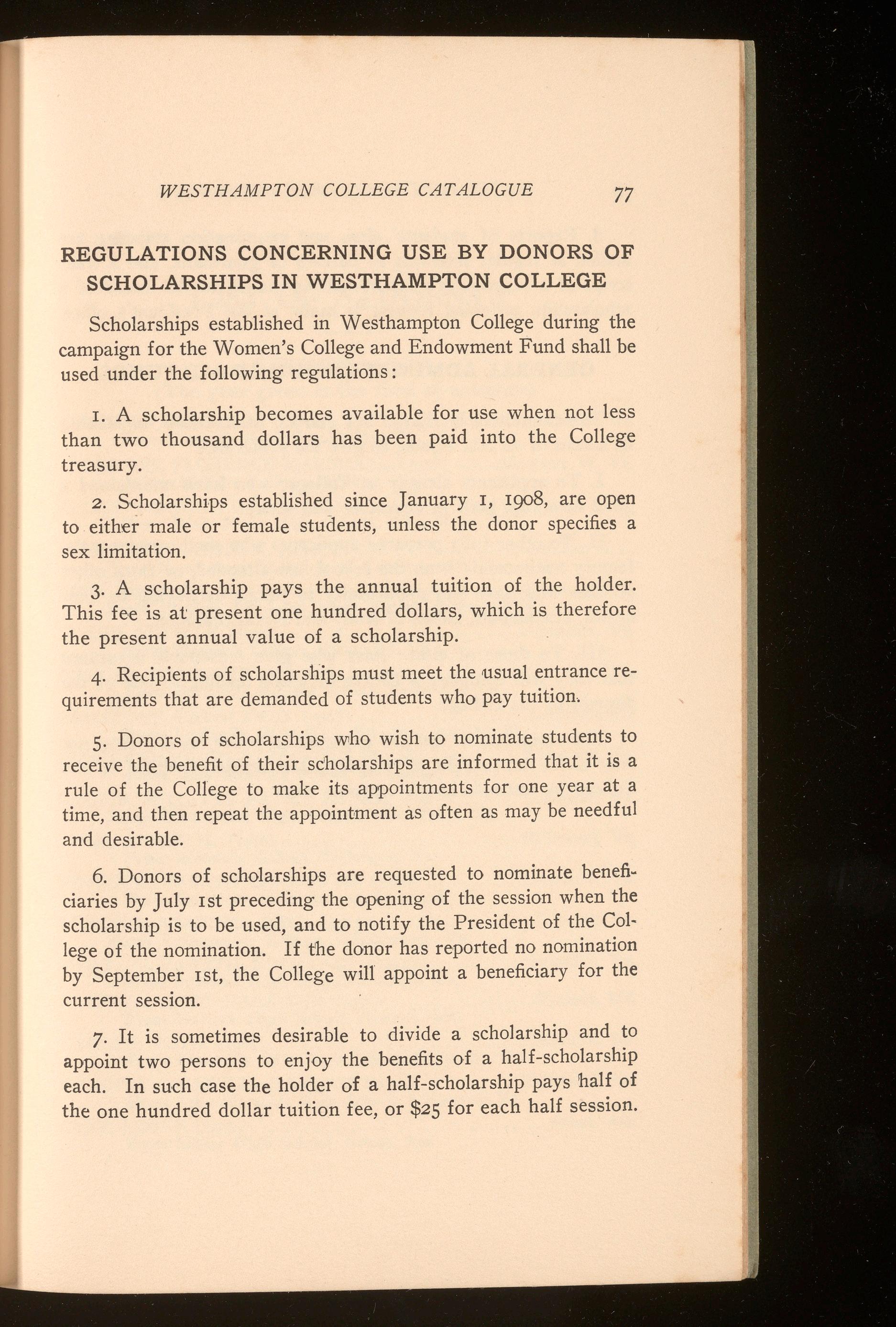
REGULATIONS CONCERNING USE BY DONORS OF SCHOLARSHIPS IN WESTHAMPTON COLLEGE
Scholarships established in Westhampton College during the campaign for the Women's College and Endowment Fund shall be used under the following regulations:
I. A scholarship becomes available for use when not less than two thousand dollars has been paid into the College treasury.
2. Scholarships established since January r, 1908, are open to either male or female students, unless the donor specifies a sex limitation.
3. A scholarship pays the annual tuition of the holder. This fe.e is at present one hundred dollars, which is therefore the present annual value of a scholarship.
4. Recipients of scholarships must meet the usual entrance requirements that are demanded of students who pay tuition.
5 Donors of scholarships who wish to nominate students to receive the benefit of their scholarships are informed that it is a rule of the College to make its appointments for one year at a time , and then repeat the appointment as often as may be needful and desirable.
6. Donors of scholarships are requested to nominate beneficiaries by July rst preceding the opening of the session when the scholarship is to be used, and to notify the President of the College of the nomination. If the donor has reported no nomination by September rst, the College will appoint a beneficiary for the current session.
7. It is sometimes desirable to divide a scholarship and to appoint two persons to enjoy the benefits of a half-scholarship each. In such case the holder of a half-scholarship pays half of the one hundred dollar tuition fee, or $25 for each half session.
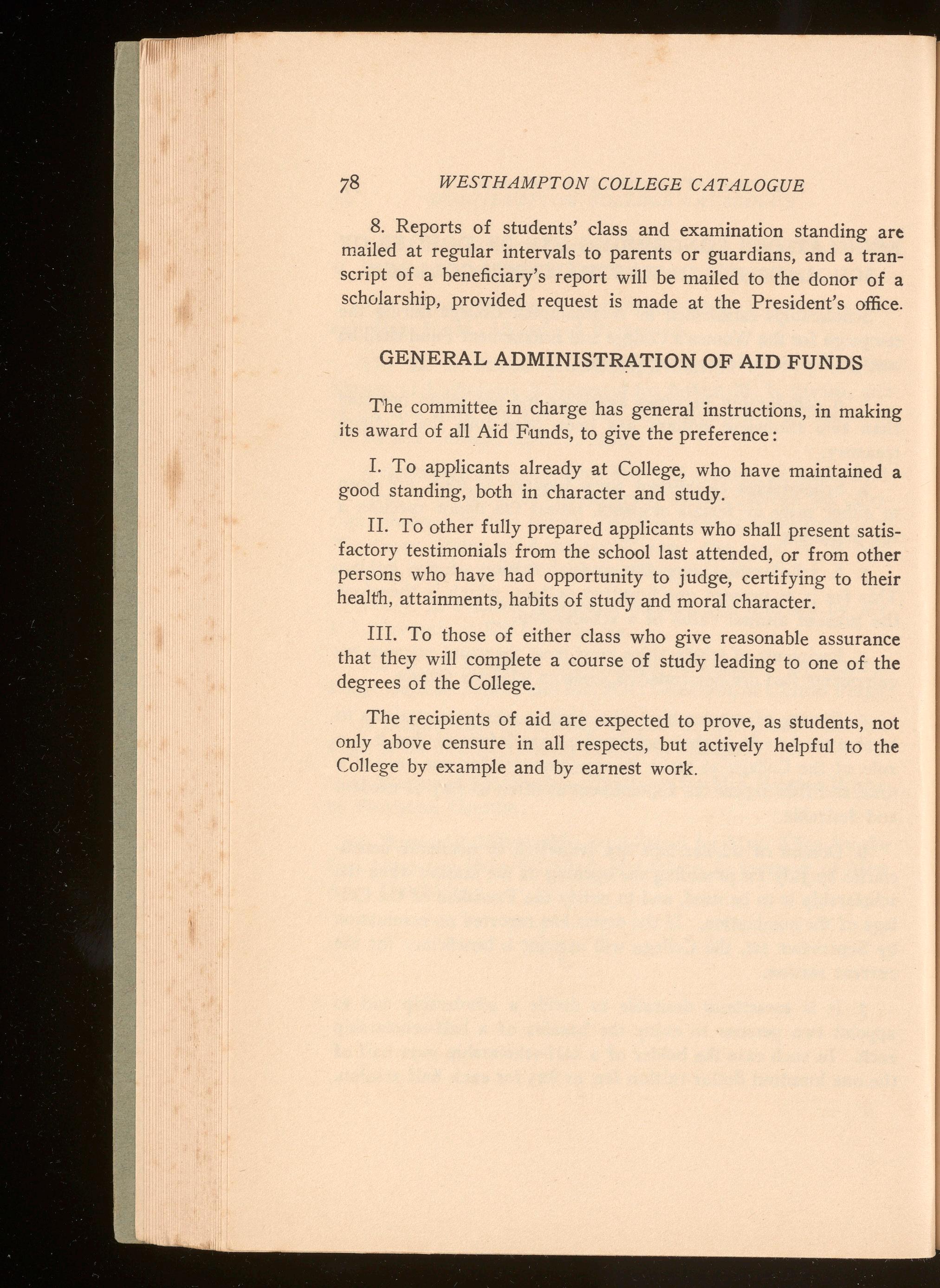
8. Reports of students' class and examination standing are mailed at regular intervals to parents or guardians, and a transcript of a beneficiary's report will be mailed to the donor of a scholarship, provided request is made at the President's office.
GENERAL ADMINISTRATION OF AID FUNDS
The committee in charge has general instructions, in making its award of all Aid Funds, to give the preference:
I. To applicants already at College, who have maintained a good standing, both in character and study.
II. To other fully prepared applicants who shall present satisfactory testimonials from the school last attended, or from other persons who have had opportunity to judge, certifying to their health, attainments, habits of study and moral character.
III. To those of either class who give reasonable assurance that they will complete a course of study leading to one of the degrees of the College.
The recipients of aid are expected to prove, as students, not only above censure in all respects, but actively helpful to the College by example and by earnest work.
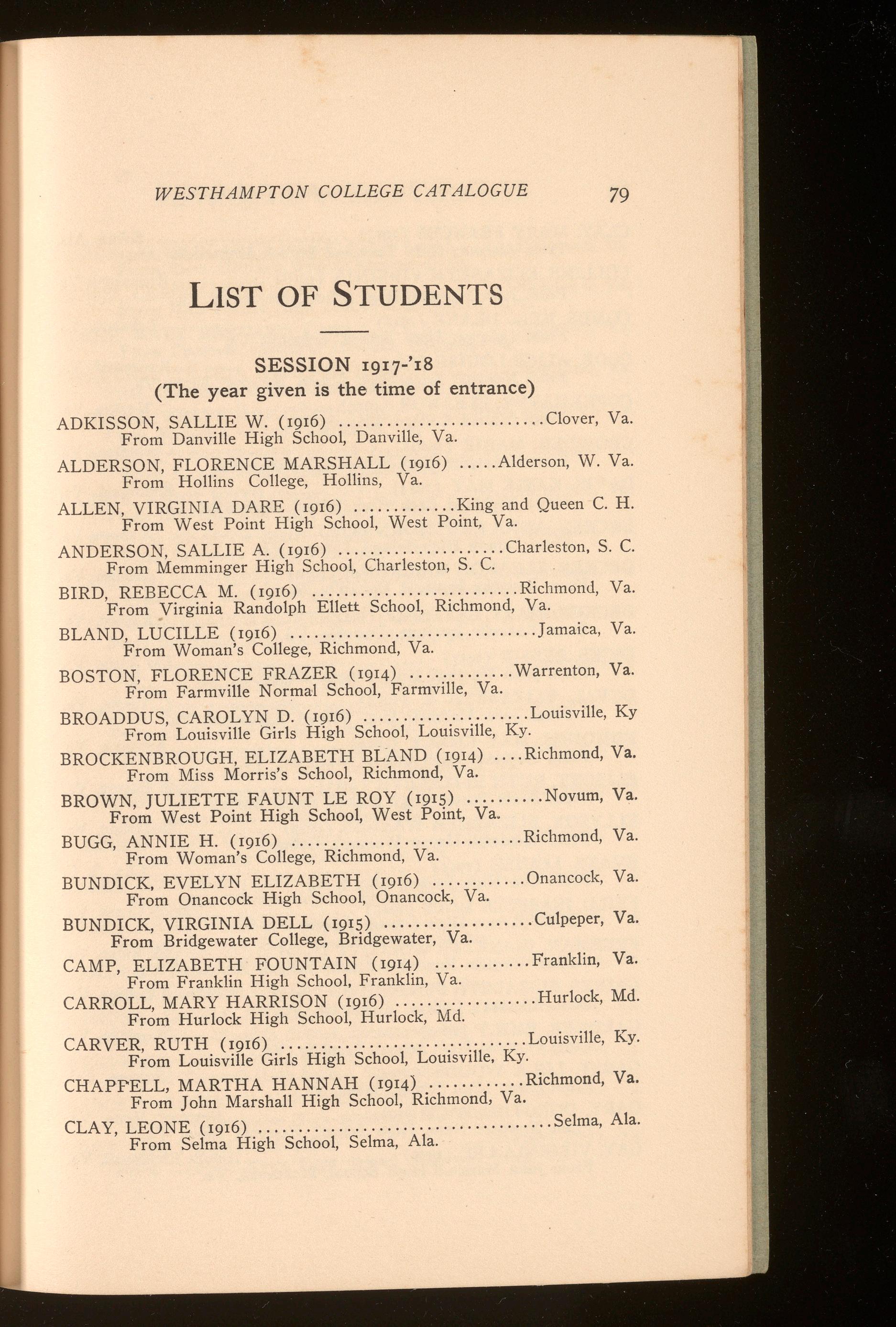
LIST OF STUDENTS
SESSION
1917-'18
(The year given is the time of entrance)
ADKISSON, SALLIE W. (1916) ................. .. ....... Clover, Va.
From Danville High School, Danville, Va.
ALDERSON, FLORENCE MARSHALL (1916) ..... Alderson, W. Va
From Hollins College, Hollins, Va.
ALLEN, VIRGINIA DARE (1916) ............. King and Queen C. H.
From West Point High School, West Point , Va.
ANDERSON, SALLIE A. ( 1916) ..................... Charleston, S . C.
From Memminger High School , Charleston, S. C.
BIRD, REBECCA M. (1916) .......................... Richmond, Va.
From Virginia Randolph Ellett School, Richmond, Va.
BLAND, LUCILLE (1916) ............................... Jamaica, Va.
From Woman's College, Richmond, Va
BOSTON, FLORENCE FRAZER (1914) ............. Warrenton, Va.
From Farmville Normal School, Farmville, Va.
BROADDUS, CAROLYN D. (1916) ..................... Louisville, Ky
From Louisville Girls High School, Louisville, Ky.
BROCKENBROUGH, ELIZABETH BLAND (1914) Richmond, Va.
From Miss Morris's School, Richmond, Va.
BROWN, JULIETTE FAUNT LE ROY (1915) .......... Novum, Va.
From West Point High School, West Point, Va
BUGG, ANNIE H. (1916) ............................. Richmond, Va.
From Woman's College, Richmond, Va.
BUNDICK, EVELYN ELIZABETH (1916) ............ Onancock, Va.
From Onancock High School, Onancock, Va.
BUNDICK, VIRGINIA DELL (1915) ................... Culpeper, Va.
From Bridgewater College, Bridgewater, Va.
CAMP, ELIZABETH FOUNTAIN (1914) ............ Franklin, Va.
From Franklin High School, Franklin, Va.
CARROLL, MARY HARRISON (1916) ............ Hurlock, Md.
From Hurlock High School, Hurlock, Md.
CARVER, RUTH ( 1916) ............................... Louisville, Ky.
From Louisville Girls High School, Louisville, Ky .
CHAPPELL, MARTHA HANNAH (1914) ............ Richmond, Va.
From John Marshall High School, Richmond, Va.
CLAY, LEONE (1916) ..................................... Selma, Ala.
From Selma High School, Selma, Ala
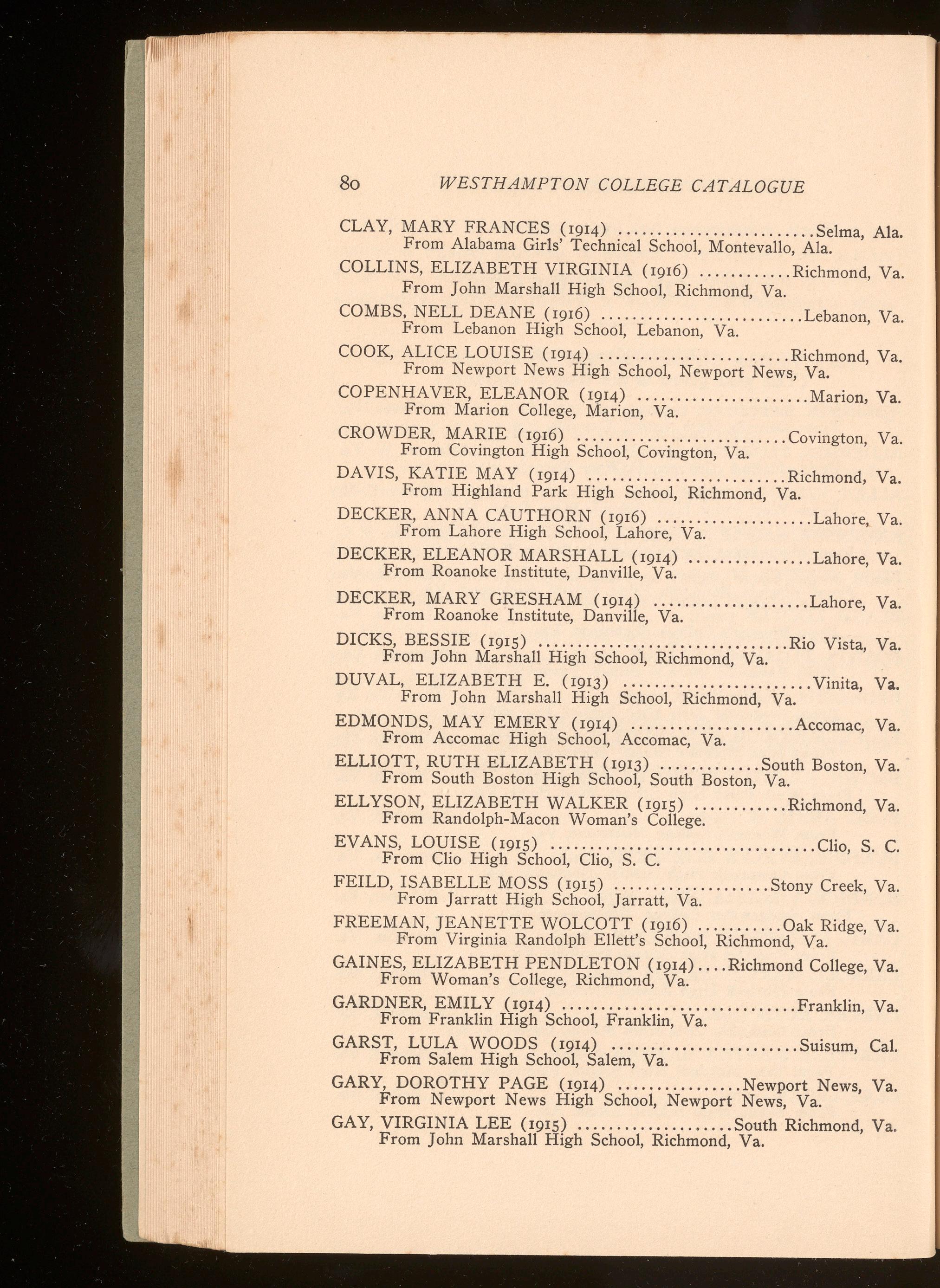
80 WESTHAMPTON COLLEGE CATALOGUE
CLAY, MARY FRANCES (r9r4) ......................... Selma, Ala.
From Alabama Girls' Technical School, Montevallo, Ala.
COLLINS, ELIZABETH VIRGINIA (r9r6) ............ Richmond, Va.
From John Marshall High School, Richmond, Va.
COMBS, NELL DEANE (r9r6) .......................... Lebanon, Va.
From Lebanon High School, Lebanon, Va.
COOK, ALICE LOUISE (r9r4) ........................ Richmond, Va.
From Newport News High School, Newport News, Va.
COPENHAVER, ELEANOR (r9r4) ...................... Marion, Va.
From Marion College, Marion, Va.
CROWDER, MARIE (r9r6) ........................... Covington, Va.
From Covington High School, Covington, Va.
DAVIS, KATIE MAY (r9r4) ......................... Richmond, Va.
From Highland Park High School, Richmond, Va.
DECKER, ANNA CAUTHORN (r9r6) .................... Lahore, Va.
From Lahore High School, Lahore, Va.
DECKER, ELEANOR MARSHALL (r9r4) ................ Lahore, Va.
From Roanoke Institute, Danville, Va.
DECKER, MARY GRESHAM (r9r4) .................... Lahore, Va.
From Roanoke Institute, Danville, Va.
DICKS, BESSIE (r9r5) ................................ Rio Vista, Va.
From John Marshall High School, Richmond, Va.
DUVAL, ELIZABETH E. (r9r3) ........................ Vinita, Va.
From John Marshall High School, Richmond, Va.
EDMONDS, MAY EMERY (r9r4) ..................... Accomac, Va.
From Accomac High School, Accomac, Va.
ELLIOTT, RUTH ELIZABETH (r9r3) ............. South Boston, Va.
From South Boston High School, South Boston, Va.
ELLYSON, ELIZABETH WALKER (r9r5) ............ Richmond, Va.
From Randolph-Macon Woman's College.
EVANS, LOUISE (r9r5) .................................. Clio, S. C.
From Clio High School, Clio, S. C.
FEILD, ISABELLE MOSS ( r9r5) .................... Stony Creek, Va.
From Jarratt High School, Jarratt, Va.
FREEMAN, JEANETTE WOLCOTT (r9r6) ........... Oak Ridge, Va.
From Virginia Randolph Ellett's School, Richmond, Va.
GAINES, ELIZABETH PENDLETON (r9r4) .... Richmond College, Va.
From Woman's College, Richmond, Va.
GARDNER, EMILY (r9r4) .............................. Franklin, Va.
From Franklin High School, Franklin, Va.
GARST, LULA WOODS (r9r4) ........•............... Suisum, Cal.
From Salem High School, Salem, Va.
GARY, DOROTHY PAGE (1914) ................ Newport News, Va.
From Newport News High School, Newport News, Va.
GAY, VIRGINIA LEE (r9r5) .................... South Richmond, Va.
From John Marshall High School, Richmond, Va.
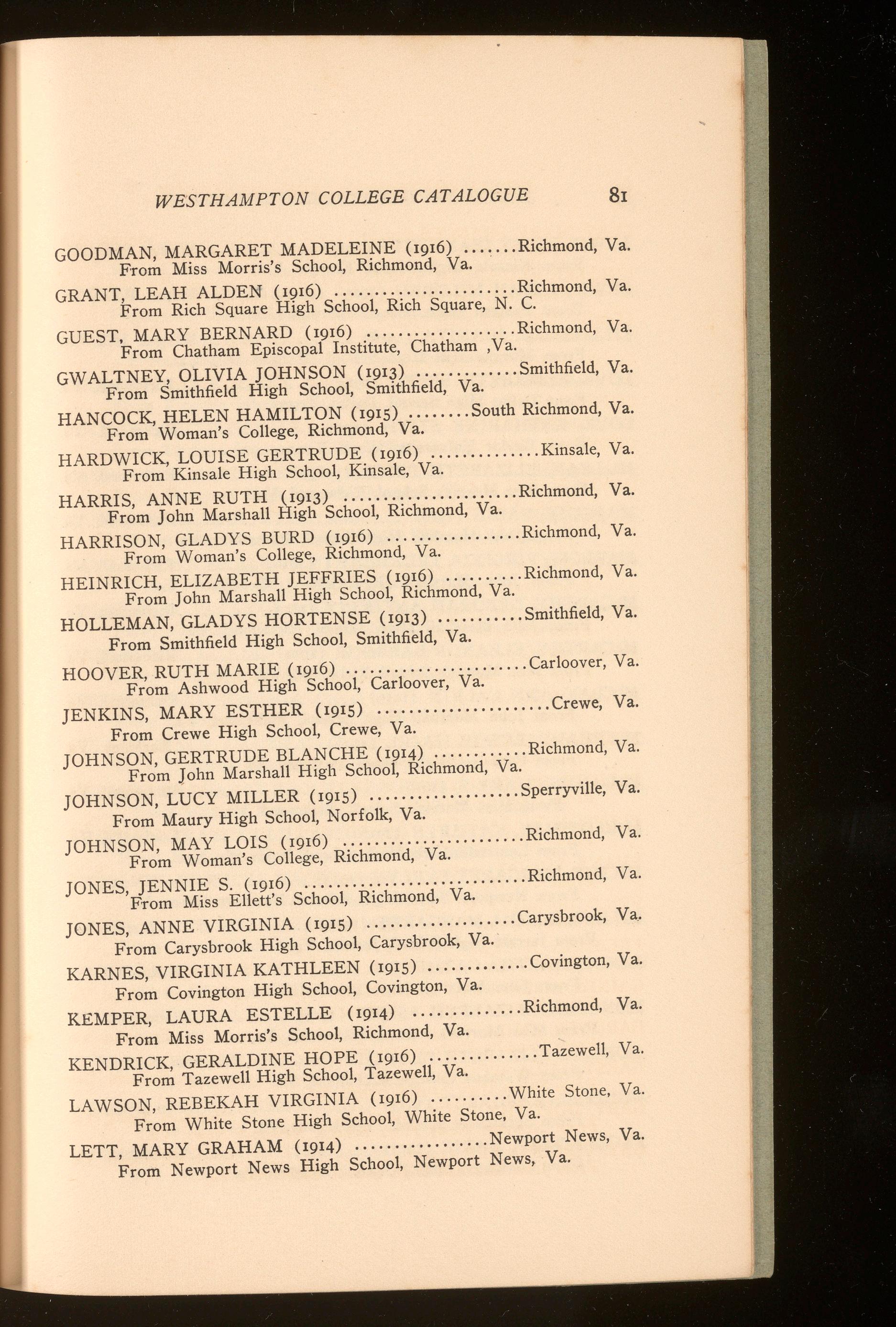
WESTHAMPTON COLLEGE CAT ALOGVE 81
GOODMAN, MARGARET MADELEINE (1916) ..•.... Richmond Va.
From Miss Morris's School, Richmond, Va. '
GRANT, LEAH ALDEN (1916) ....................... Richmond, Va.
From Rich Square High School, Rich Square, N. C.
GUEST, MARY BERNARD (1916) ................... Richmond, Va.
From Chatham Episcopal Institute, Chatham ,Va.
GWALTNEY, OLIVIA JOHNSON (1913) ............. Smithfield, Va.
From Smithfield High School, Smithfield, Va.
HANCOCK, HELEN HAMILTON (1915) ........ South Richmond, Va.
From Woman's College, Richmond, Va.
HARDWICK, LOUISE GERTRUDE (1916) .............. Kinsale, Va.
From Kinsale High School, Kinsale, Va.
HARRIS, ANNE RUTH (1913) ...................... Richmond, Va.
From John Marshall High School, Richmond, Va.
HARRISON, GLADYS BURD (1916) ................. Richmond, Va.
From Woman's College, Richmond, Va.
HEINRICH, ELIZABETH JEFFRIES (1916) .......... Richmond, Va.
From John Marshall High School, Richmond, Va.
HOLLEMAN, GLADYS HORTENSE (1913) •.....•.... Smithfield, Va.
From Smithfield High School, Smithfield, Va.
HOOVER, RUTH MARIE (1916) ....................... Carloover, Va.
From Ashwood High School, Carloover, Va.
JENKINS, MARY ESTHER (1915) ...................... Crewe, Va.
From Crewe High School, Crewe, Va.
JOHNSON, GERTRUDE BLANCHE (1914) ............ Richmond, Va.
From John Marshall High School, Richmond, Va.
JOHNSON, LUCY MILLER (1915) .................•. Sperryville, Va.
From Maury High School, Norfolk, Va.
JOHNSON, MAY LOIS (1916) ....................... Richmond, Va.
From Woman's College, Richmond, Va.
JONES, JENNIE S. (1916) ............................ Richmond, Va.
From Miss Ellett's School, Richmond, Va.
JONES, ANNE VIRGINIA (1915) ................... Carysbrook, Va.
From Carysbrook High School, Carysbrook, Va.
KARNES, VIRGINIA KATHLEEN (1915) ............. Covington, Va.
From Covington High School, Covington, Va.
KEMPER, LAURA ESTELLE (1914) .............. Richmond, Va.
From Miss Morris's School, Richmond, Va.
KENDRICK, GERALDINE HOPE (1916) .............. Tazewell, Va.
From Tazewell High School, Tazewell, Va.
LAWSON, REBEKAH VIRGINIA (1916) .......... White Stone, Va.
From White Stone High School, White Stone, Va.
LETT, MARY GRAHAM (1914) ................. Newport News, Va.
From Newport News High School, Newport News, Va.
82
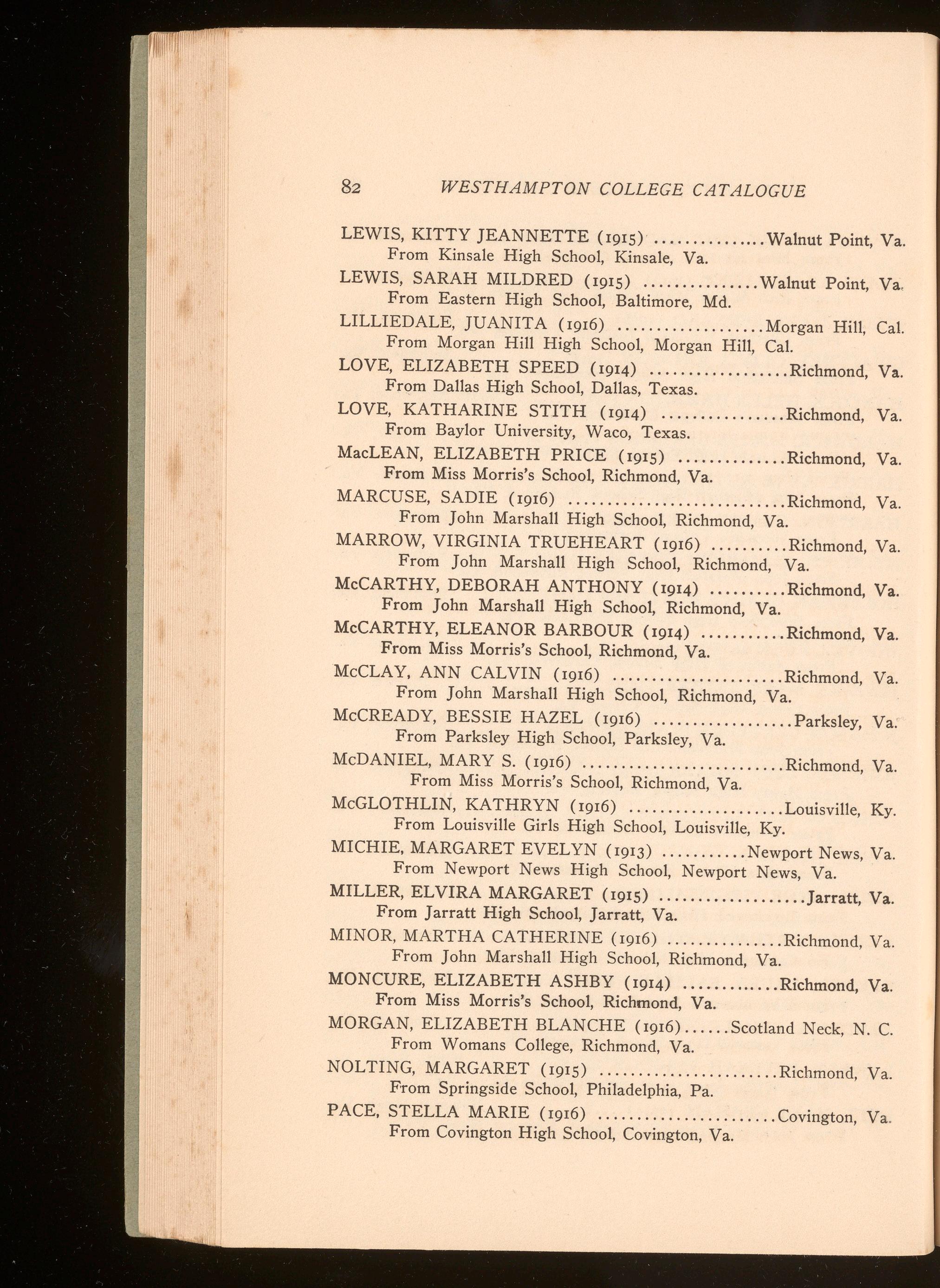
WESTHAMPTON COLLEGE CATALOGUE
LEWIS, KITTY JEANNETTE (1915) .... ...... Walnut Point, Va
From Kinsale High School, Kinsale, Va.
LEWIS, SARAH MILDRED (1915) . ...... .. .. . Walnut Point , Va .
From Eastern High School, Baltimore, Md .
LILLIEDALE, JUANITA (1916) ..... . . . ... Morgan Hill , Cal.
From Morgan Hill High School, Morgan Hill , Cal.
LOVE, ELIZABETH SPEED (1914) ......... ... . .... Richmond, Va .
From Dallas High School , Dallas , Texas.
LOVE, KATHARINE STITH (1914) ... . . . Richmond, Va
From Baylor University, Waco, Texas
MacLEAN, ELIZABETH PRICE (1915) . ............ Richmond, Va
From Miss Morris's School, Richmond, Va.
MARCUSE, SADIE (1916) . ... .. .. . .. .. .. Richmond , Va.
From John Marshall High School , Richmond, Va.
MARROW, VIRGINIA TRUEHEART (1916) . ...... Richmond, Va .
From John Marshall High School, Richmond , Va
McCARTHY, DEBORAH ANTHONY (1914) .. . .. . . Richmond, Va.
From John Marshall High School, Richmond, Va.
McCARTHY, ELEANOR BARBOUR (1914) ........... Richmond, Va .
From Miss Morris's School, Richmond, Va.
McCLAY, ANN CALVIN (1916) ... ............... . .. Richmond, Va
From John Marshall High School, Richmond, Va.
McCREADY, BESSIE HAZEL (1916) . . . . Parksley, Va .
From Parksley High School, Parksley, Va.
McDANIEL, MARYS (1916) ........... . ...... . .. . Richmond, Va.
From Miss Morris's School, Richmond , Va
McGLOTHLIN , KATHRYN (1916) . . ............... Louisville, Ky.
From Loui sville Girls High School , Loui sville, Ky.
MICHIE, MARGARET EVELYN (1913) . Newport News, Va.
From Newport News High School, Newport News, Va.
MILLER, ELVIRA MARGARET (1915) .......... ...... Jarratt, Va.
From Jarratt High School, Jarratt , Va.
MINOR , MARTHA CATHERINE (1916) ... .. Richmond, V a.
From John Marshall Hi gh School , Richmond, Va.
MONCURE, ELIZABETH ASHBY (1914) ............. Richmond, Va.
From Miss Morris's School, Richmond, Va
MORGAN, ELIZABETH BLANCHE (1916) . .. Scotland N eck, N . C.
From Womans College, Richmond, Va.
NOLTING , MARGARET (1915) . ... . ...... Richmond, V a.
From Springside School, Philadelphia , Pa.
PACE, STELLA MARIE (1916) .......... . ......... .. . Covington , Va .
From Covington High School , Covington, Va .
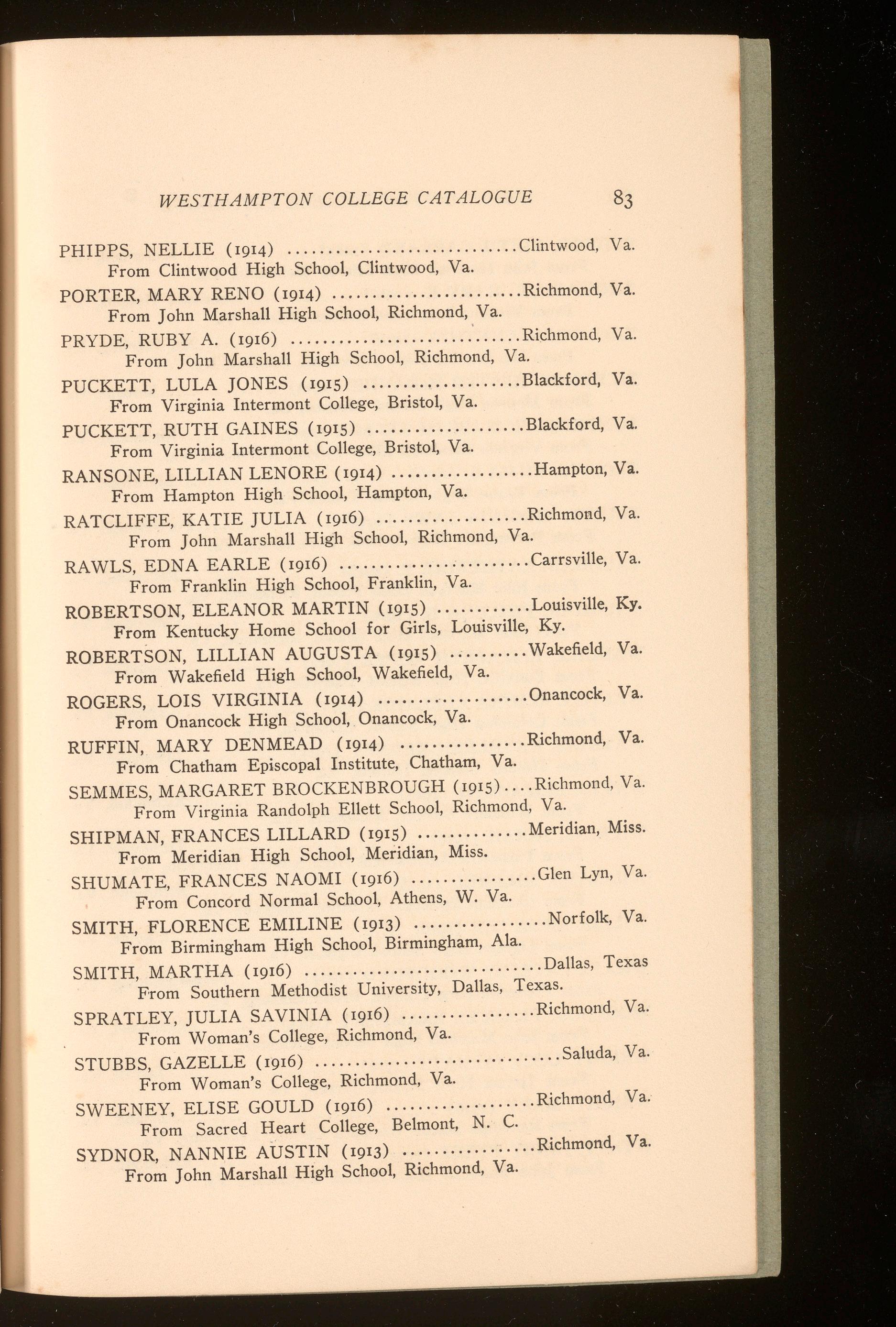
WESTHAMPTON COLLEGE CATALOGUE 83
PHIPPS, NELLIE (1914) ............................. Clintwood, Va.
From Clintwood High School, Clintwood, Va.
PORTER, MARY RENO (1914) ........................ Richmond, Va.
From John Marshall High School, Richmond, Va.
PRYDE, RUBY A. (1916) ...................... .' ...... Richmond, Va.
From John Marshall High School, Richmond, Va.
PUCKETT, LULA JONES (1915) .................... Blackford, Va.
From Virginia Intermont College, Bristol, Va.
PUCKETT, RUTH GAINES (1915) ...•................ Blackford, Va.
From Virginia Intermont College, Bristol, Va.
RANSONE, LILLIAN LENORE (1914) ...•.............. Hampton, Va.
From Hampton High School, Hampton, Va.
RATCLIFFE, KATIE JULIA (1916) ................... Richmond, Va
From John Marshall High School, Richmond, Va.
RAWLS, EDNA EARLE (1916) ........................ Carrsville, Va.
From Franklin High School, Franklin, Va.
ROBERTSON, ELEANOR MARTIN (1915) ............ Louisville, Ky.
From Kentucky Home School for Girls, Louisville, Ky.
ROBERTSON, LILLIAN AUGUSTA (1915) .......... Wakefield, Va.
From Wakefield High School, Wakefield, Va.
ROGERS, LOIS VIRGINIA (1914) ...............•... Onancock, Va.
From Onancock High School, Onancock, Va.
RUFFIN, MARY DENMEAD (1914) ...•............ Richmond, Va.
From Chatham Episcopal Institute, Chatham, Va.
SEMMES, MARGARET BROCKENBROUGH (1915) .... Richmond, Va.
From Virginia Randolph Ellett School, Richmond , Va.
SHIPMAN, FRANCES LILLARD (1915) .......... .... Meridian, Miss.
From Meridian High School, Meridian, Miss.
SHUMATE, FRANCES NAOMI (1916) ................ Glen Lyn, Va.
From Concord Normal School, Athens, W. Va.
SMITH, FLORENCE EMILINE (1913) ................. Norfolk, Va.
From Birmingham High School, Birmingham, Ala.
SMITH, MARTHA ( 1916) .............................. Dallas, Texas
F-rom Southern Methodist University, Dallas, Texas.
SPRATLEY, JULIA SAVINIA (1916) ................. Richmond, Va.
From Woman's College, Richmond, Va.
STUBBS, GAZELLE (1916) ............................... Saluda, Va.
From Woman's College, Richmond, Va.
SWEENEY, ELISE GOULD (1916) ................... Richmond , Va.
From Sacred Heart College, Belmont, N. C.
SYDNOR, NANNIE AUSTIN (1913) ................. Richmond, Va.
From John Marshall High School, Richmond, Va.
84
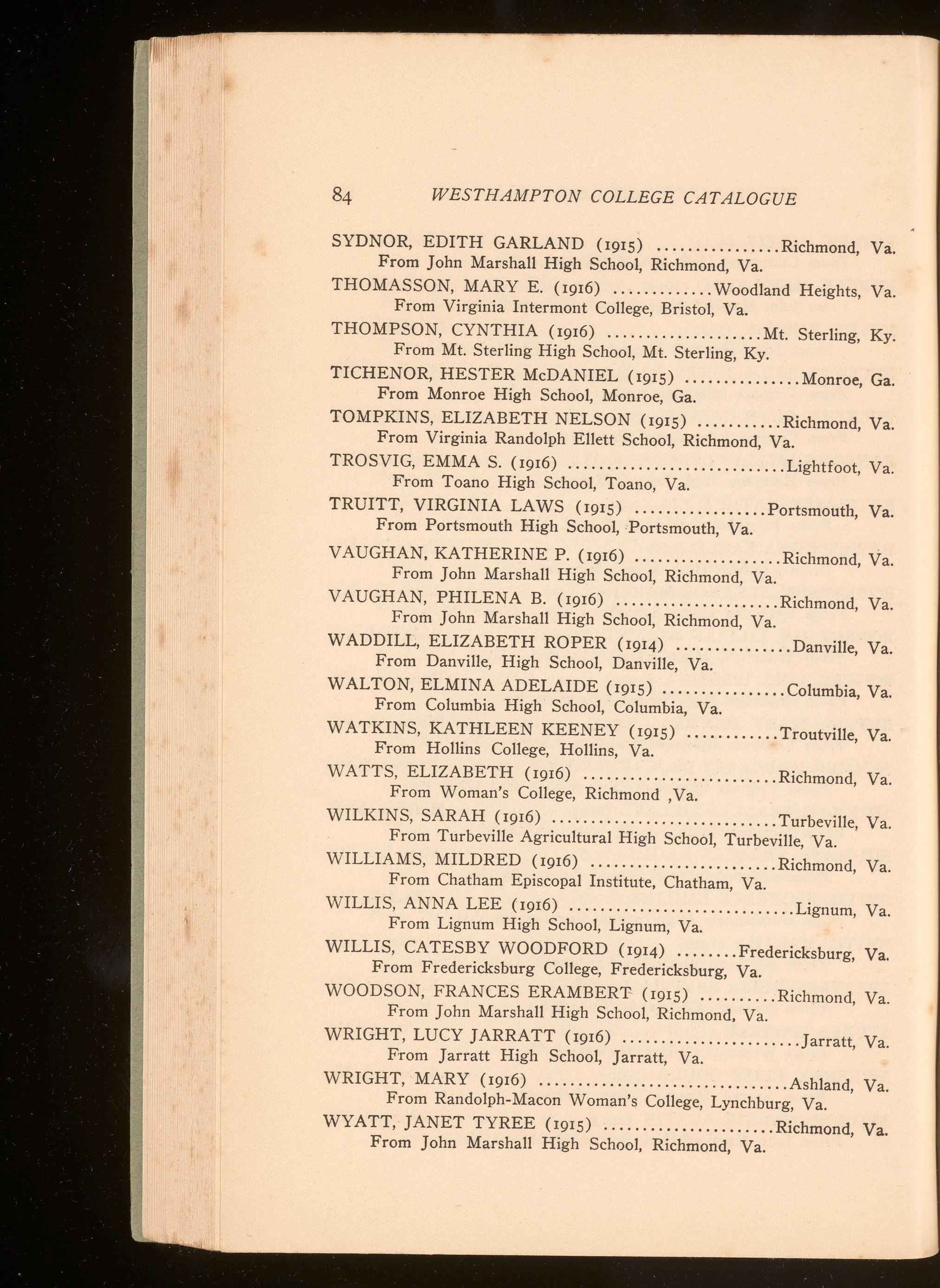
WESTHAMPTON COLLEGE CATALOGUE
SYDNOR, EDITH GARLAND (1915) .... . Richmond, Va.
From John Marshall High School, Richmond, Va.
THOMASSON, MARY E. (1916) ... . .. .. Woodland Heights, Va .
From Virginia Intermont College, Bristol, Va.
THOMPSON, CYNTHIA (1916) .. ...... . Mt. Sterling, Ky.
From Mt . Sterling High School, Mt. Sterling, Ky.
TICHENOR , HESTER McDANIEL ( 1915) .. .... . • • Monroe, Ga.
From Monroe High School, Monroe, Ga.
TOMPKINS, ELIZABETH NELSON (1915) ....... . .. Richmond , Va.
From Virginia Randolph Ellett School, Richmond, Va .
TROSVIG , EMMA S (1916) ... .. .. .. Lightfoot , Va
From Toano High School, Toano , Va.
TRUITT, VIRGINIA LAWS (1915) ..... • .. Portsmouth, Va .
From Portsmouth High School, ,Portsmouth, Va.
VAUGHAN, KATHERINE P. (1916) . Richmond, Va .
From John Marshall High School, Richmond, Va.
VAUGHAN, PHILENA B. (1916) . . . . ... . .. Richmond, Va.
From John Marshall High School , Richmond , Va .
WADDILL, ELIZABETH ROPER (1914) . . . . Danville , Va .
From Danville, High School, Danville, Va
WALTON , ELMINA ADELAIDE (1915) ... ..... Columbia, Va
From Columbia High School, Columbia, Va
WATKINS , KATHLEEN KEENEY (1915) .. . ..... Troutville, Va .
From Hollins College, Hollins, Va
WATTS, ELIZABETH (1916) ... .. .. . .. . . .. Richmond, Va
From Woman's College, Richmond ,Va.
WILKINS , SARAH (1916) .. ... . .. ..... .... Turbeville, Va.
From Turbeville Agricultural High School , Turbeville, Va.
WILLIAMS, MILDRED (1916) . .. ........ . • . .... Richmond , Va
From Chatham Episcopal Institute, Chatham, Va
WILLIS , ANNA LEE (1916) . ...... Lignum, Va.
From Lignum High School, Lignum , Va .
WILLIS, CATESBY WOODFORD (1914) . . .. ... Fredericksburg, Va.
From Fredericksburg College, Fredericksburg, Va.
WOODSON, FRANCES ERAMBERT- (1915) . . . . Richmond, Va .
From John Marshall High School , Richmond, Va
WRIGHT , LUCY JARRATT (1916) .. . . . .. Jarratt , Va
From Jarratt High School, Jarratt , Va.
WRIGHT, MARY (1916) ...... .. . .. .. . . Ashland, Va.
From Randolph-Macon Woman's College, Lynchburg, Va.
WYATT, JANET TYREE (1915) . .. ................... Richmond, Va .
From John Marshall High School, Richmond, Va.
